FILMS
Alphabethical Listings (*Alternate title)
The Big T.N.T. Show
Calling All Cats*
The Card
City After Midnight*
A Couteaux Tirés
Daggers Drawn*
Dance Hall
The Day Begins Early
Don't Ever Leave Me
Drôle de Zèbra
Easy Money
Finian's Rainbow
The Gay Dog
The Gay Intruders*
The Happiness of Three Women
Here Come the Huggetts
Alphabethical Listings (*Alternate title)
The Big T.N.T. Show
Calling All Cats*
The Card
City After Midnight*
A Couteaux Tirés
Daggers Drawn*
Dance Hall
The Day Begins Early
Don't Ever Leave Me
Drôle de Zèbra
Easy Money
Finian's Rainbow
The Gay Dog
The Gay Intruders*
The Happiness of Three Women
Here Come the Huggetts
Calling All Cats*
The Card
City After Midnight*
A Couteaux Tirés
Daggers Drawn*
Dance Hall
The Day Begins Early
Don't Ever Leave Me
Drôle de Zèbra
Easy Money
Finian's Rainbow
The Gay Dog
The Gay Intruders*
The Happiness of Three Women
Here Come the Huggetts
Chronological Listings
IMDb Links [Internet Movie Database]
June 1944
Drama - 99 minutes
A proud but aging WWI war-horse is deeply offended when his offer to lead during WWII is rejected by the government that once lauded his bravery with a series of medals. Embittered and despondent over their callousness, he heads back to his isolated country estate where he plots his permanent escape from the cold cruel world. When the government sends six mischievous cockney youths to stay with him during the bombing of London, the despondent old man must abandon his suicidal musings and attend to the ensuing chaos of the rambunctious rapscallions. This touching British drama follows the tough general's attempts to control and understand the energetic little hellions. As he comes to know them, he reluctantly begins to care and in so doing, finds renewed zest for life.
Sandra Brennan, All Movie Guide
June 1944
Drama - 99 minutes
A proud but aging WWI war-horse is deeply offended when his offer to lead during WWII is rejected by the government that once lauded his bravery with a series of medals. Embittered and despondent over their callousness, he heads back to his isolated country estate where he plots his permanent escape from the cold cruel world. When the government sends six mischievous cockney youths to stay with him during the bombing of London, the despondent old man must abandon his suicidal musings and attend to the ensuing chaos of the rambunctious rapscallions. This touching British drama follows the tough general's attempts to control and understand the energetic little hellions. As he comes to know them, he reluctantly begins to care and in so doing, finds renewed zest for life.
Sandra Brennan, All Movie Guide
CAST:
Godfrey Tearle ..............General Victor Church
Godfrey Tearle ..............General Victor Church
John Laurie ................ Harry
Rosalyn Boulter .............Billeting Officer
Brian Weske..................Limpy
Petula Clark ................Irma
Mabel Constanduros ..........Mrs. Bates
Patric Curwen ...............Dr. Sargeant
Jeanne De Casalis ...........Lady Frome
Morland Graham ............. Bates
Irene Handl .................Mrs. Famsworth
H.F. Maltby ................ McNab
Gerald Moore ................Mayor
FILM NOTES:
- Directed by Maurice Elvey
- Screenplay by Elizabeth Baron. Based on the novel by James Ronald.
- Filmed: National Studios, Elstree
- British National Film
- It was Petula's first film role and she was cast after having been spotted by director Maurice Elvey who had seen her perform a sketch in concert at the Albert Hall. The sketch, entitled Movie Mad, was written for her by her father and centered around a star-struck Cockney maid named Daisy. Petula, of course, played Daisy.
Her role as "Irma Smith," one of the Cockney evacuees, led to a film contract with the J. Arthur Rank Organization.

At the age of ten, Pet made her first film, "Medal for the General."
She says "Film actresses
are generally suppposed to arrive at the studios in limousines.
Mummy and I went by bus."
-TV Mirror, 30, October, 1954
REVIEWS:
- Friendly, if slightly naive comedy-drama of England in war time concering a retired General, a much bemedalled hero who goes all gloomy and morose folowing the refusal of the War Office to reinstate him on the outbreak of World War II, but ultimately finds new interest in life in a bunch of mischievous cockney avacuees. The first half is definitely slow and stagey, but the artificial tale livens up considerably when the youngsters appear on the scene, and finally succeeds in making the popular grade. Strangely enough, the practically unknown juvenile players give many points to veterans Godfrey Tearle, Jeanne de Casalis and Morland Graham.
ACTING: Godrey Tearle, as the General, works hard but is inclined to overact the General, a Blimpish fellow who finishes up by adopting the mantle of Beveridge, while Jeanne de Casalis' Lady Alice is merely (her comedy character) Mrs. Feather with an inconsistent French accent. Morland Graham and Mabel Constanduros are easily the best of the adult players but Maureen Glynne, Gerald Moore, Brian Weske, Petula Clarke (sic), David Trickett and Pat Geary are a real delight as the evacuees.
PRODUCTION: The story takes a long time to get into its stride--the initial illustrations of the Blimpish actions and inhibitions of the General are a bit of a bore but once the Cockney evacuees get cracking its complexion takes on a more natural colourful and amusing hue. The capers of the kids, although strictly in accord with time-honoured stage convention, evoke much wholesome laughter and this happily endures to the end.
POINTS OF INTEREST: Artless but amiable story, natural and versatile performances by juvenile players, intriguing title, star values.
KLINE WEEKLY - 29 June, 1944 - . . .Merits of conscientious production, and some sincere acting are largely baulked by a temp which is always deliberate and sometimes painfully slow. Both script and direction seem to lack selectivity and conciseness. Jeanne de Casalis and Morland Graham give strong support to Godfrey Tearle. There are also some bright flashes from the children. . .
Monthly Film Bulletin - 31 July, 1944 - . . .Sincere and well-acted with moving moments; rather slow.
British Sound Films - 1984
CAST:
William Hartnell ..............Chris Lowe
William Hartnell ..............Chris Lowe
Carol Raye................ ....Molly Lowe
Walter Fitzgerald .............Morley
Sophie Stewart.................Mrs. Morley
John Ruddock ..................Dibben
Wylie Watson ..................Bill Gurd
PETULA CLARK ...........Emily
Joan Maude ....................Gladys Moon
FILM NOTES:
- Directed by Maurice Elvey
- Screenplay by Elizabeth Baron. Based on the novel by A.G. Street
- Filmed: National Studios, Elstree
- British National Film
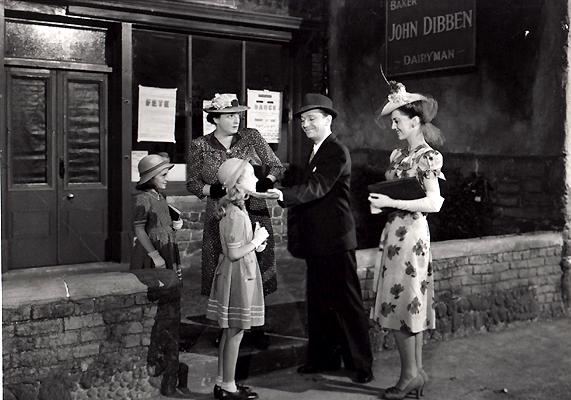
REVIEWS:
- The screen version of A.G. Street's novel presents a series of chapters in the life of a gentleman farmer. While the author's theme--as to putting back on the land whatever you take out--may not emerge with any great power or clarity, there remains the episodic drama of the hero's marital tragedy, the unusual and appealing by-play of farm life, and the frequently charming rural backgrounds which also invest the picture with a quality of camparative originality.
The agriculture angle is agreeably sketched in, notably in the case of the calf which gives the picture its title, and in an interesting auction of stock which the townsman should especially savour. For the rest, we have the popular tug of the early romantic scenes, some amusing bucolic humour and the efficient characterisations.
.
Today's Cinema-- 5 January, 1945
- Praiseworthy in its aim, but just lacking in ultimate achievement is this picture. Much favored British novelist A.G. Street wrote a yarn which centred on the strawberry roan calf of the title He contrived to depict there--in not only the lush and placid glory of England's countryside. . .but the age-old ardors also of the husbandry of land. Unhappily, Maurice Elvey--skilled experienced motion picture man though he be--fails to translate that gentle flowing rhythm to the screen; which is precisely the picture's failing.
The external facts of Mr. Street's story are here. . .but there's an uneasiness, a jumpiness, about it all which betokens the film cutter's anxiety and which just isn't redeemed by some exquisite camera work and by the homely and pleasing aphorisms with which the film is adorned. Billy Hartnell, whom British National are rightly intent on making a near-star, doesn't make the grade. It's Walter Fitzgerald's picture if anyone's. they'll market this one on the score of its agreeable photography, its picture of England which none can fail to love. Maybe, and oddly, on that count its export to America, too, would be justified.
Motion Picture Herald -17 March, 1945
The agriculture angle is agreeably sketched in, notably in the case of the calf which gives the picture its title, and in an interesting auction of stock which the townsman should especially savour. For the rest, we have the popular tug of the early romantic scenes, some amusing bucolic humour and the efficient characterisations. .
Today's Cinema-- 5 January, 1945
The external facts of Mr. Street's story are here. . .but there's an uneasiness, a jumpiness, about it all which betokens the film cutter's anxiety and which just isn't redeemed by some exquisite camera work and by the homely and pleasing aphorisms with which the film is adorned. Billy Hartnell, whom British National are rightly intent on making a near-star, doesn't make the grade. It's Walter Fitzgerald's picture if anyone's. they'll market this one on the score of its agreeable photography, its picture of England which none can fail to love. Maybe, and oddly, on that count its export to America, too, would be justified.
Motion Picture Herald -17 March, 1945
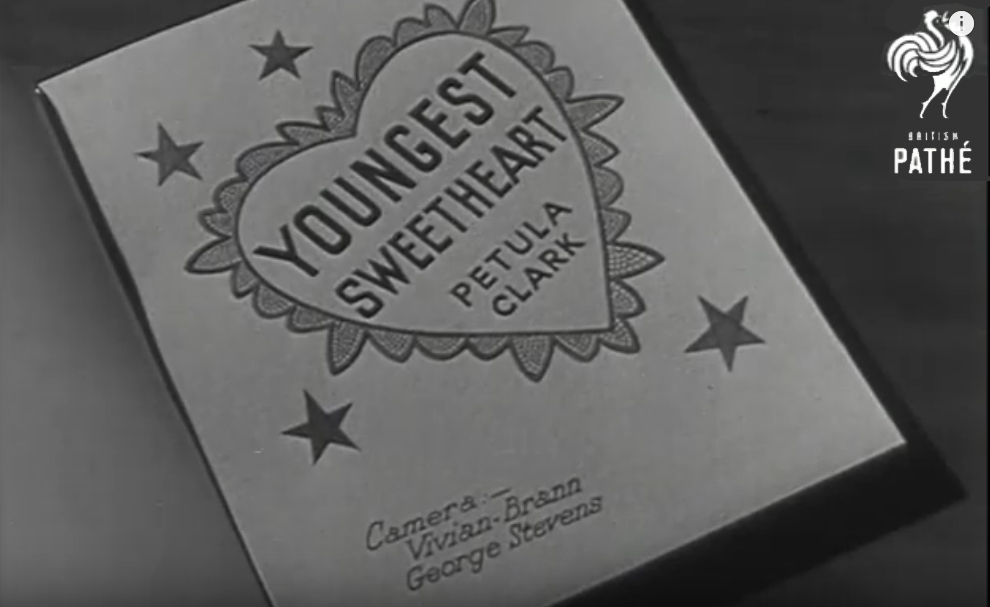
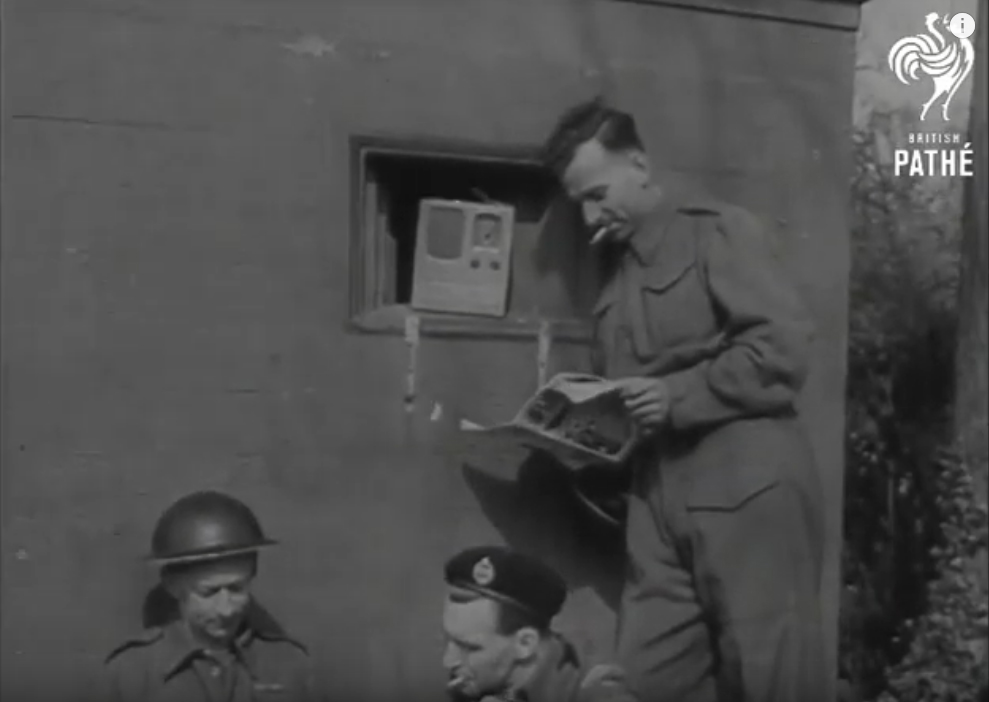
Petula's father, Corporal Clerk with soldier companions listening to his daughter singing on radio.
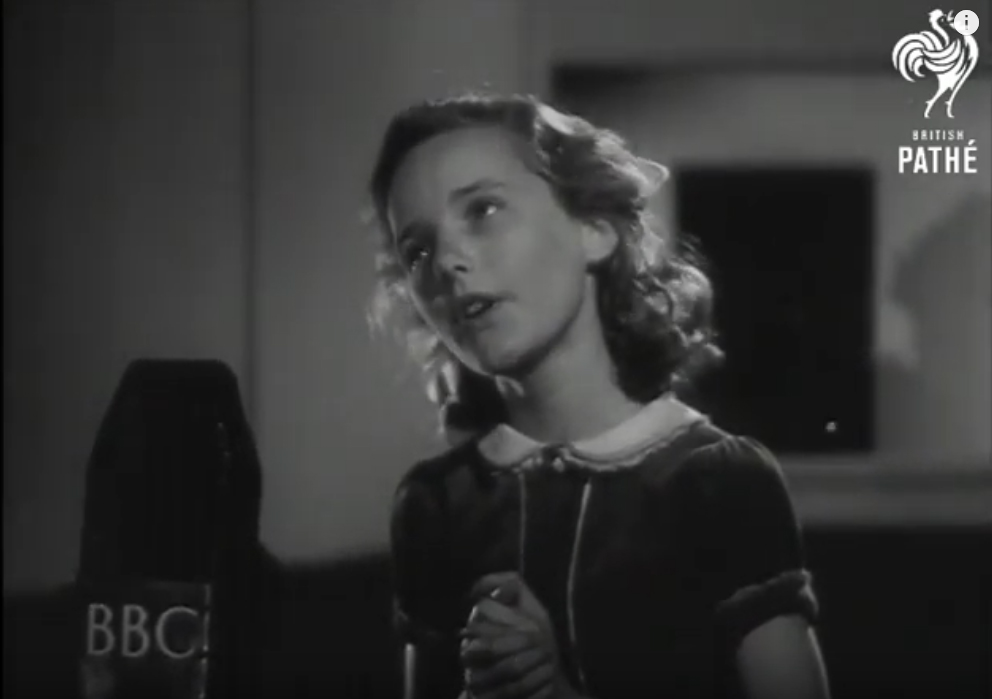
Singing a plaintive Mighty Lak a Rose.
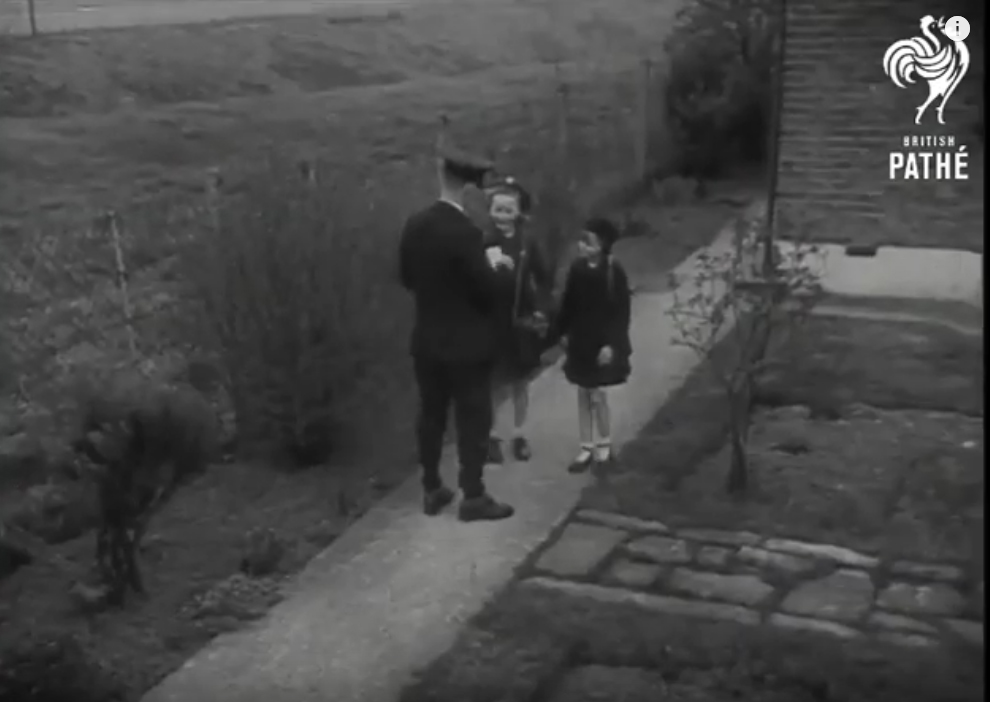
A postman delivering fan mail.
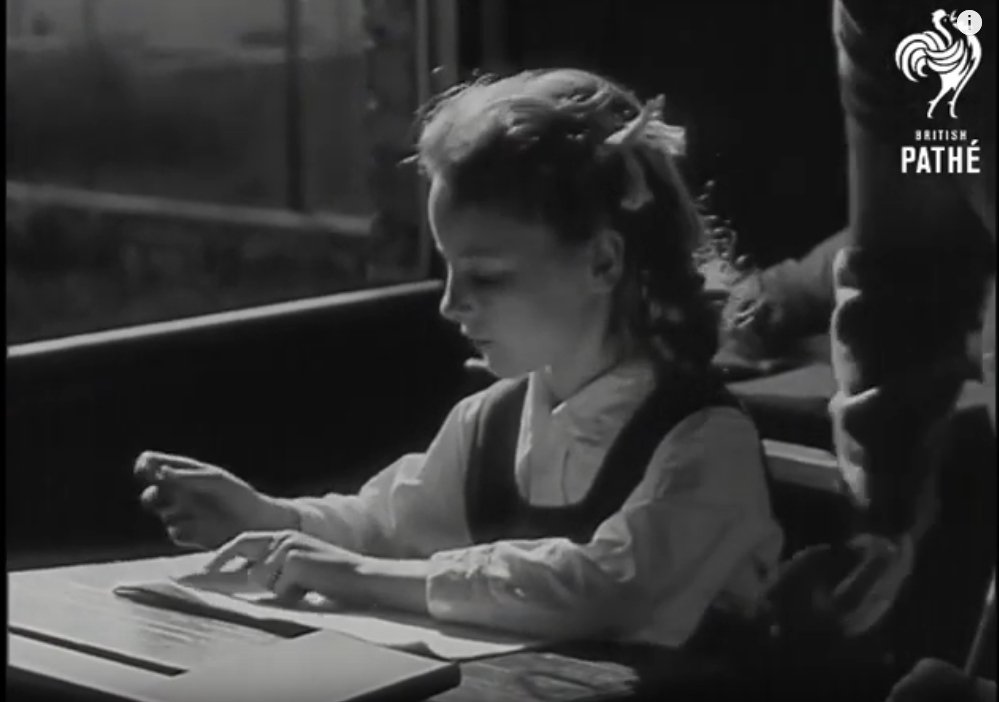
In uniform at her desk in school
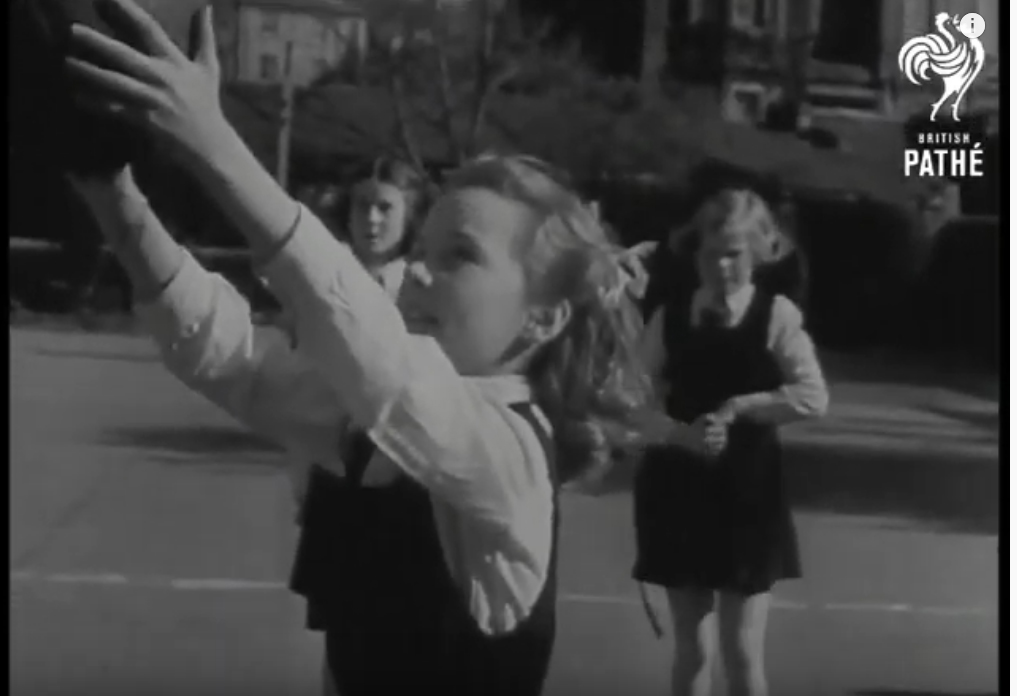
Playing netball.
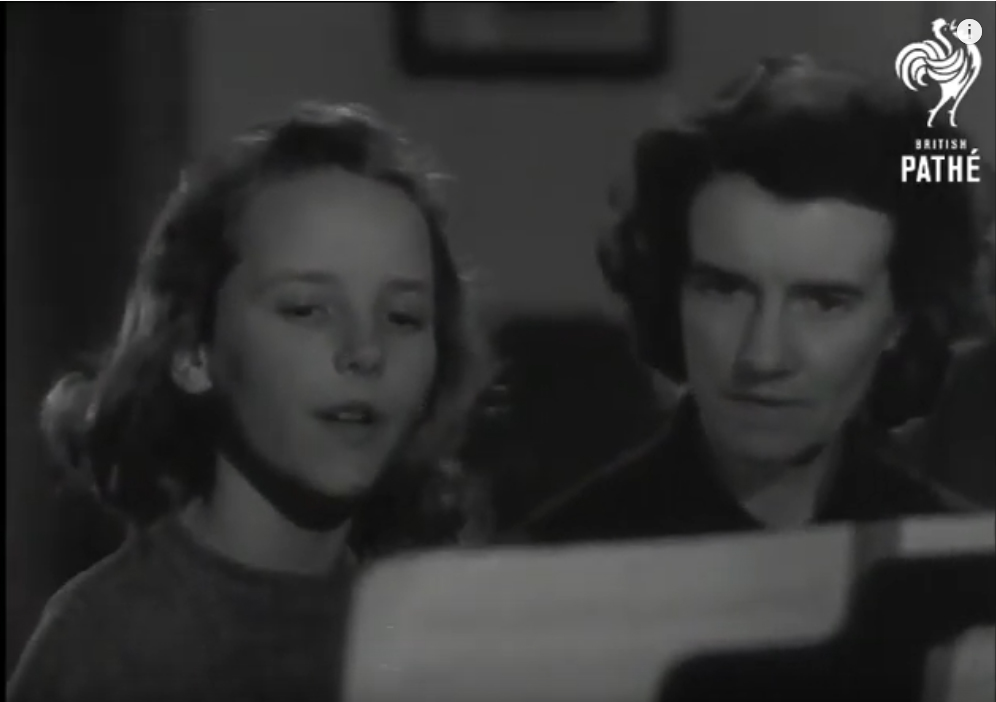
Petula rehearsing My Prayer with her accompanist,Miriam Reed.
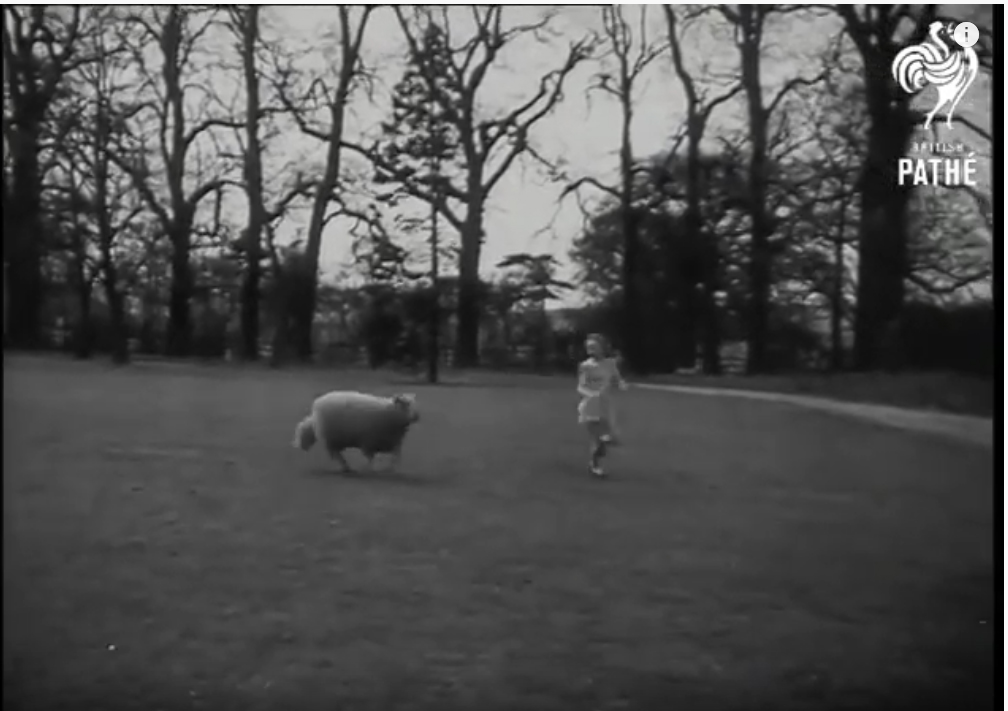
Playing chase with a sheep in the garden of stately home.
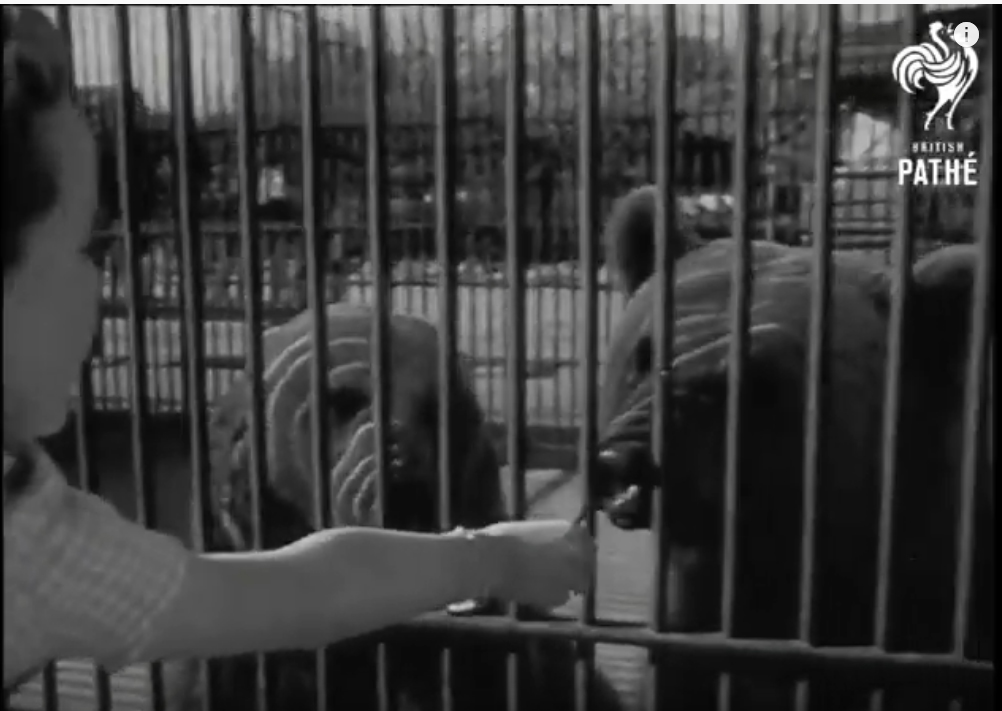
A visit to the Chesington Zoo with her sister, Barbara. They look at lions and Petula holds out a lollipop for the brown bears to lick.
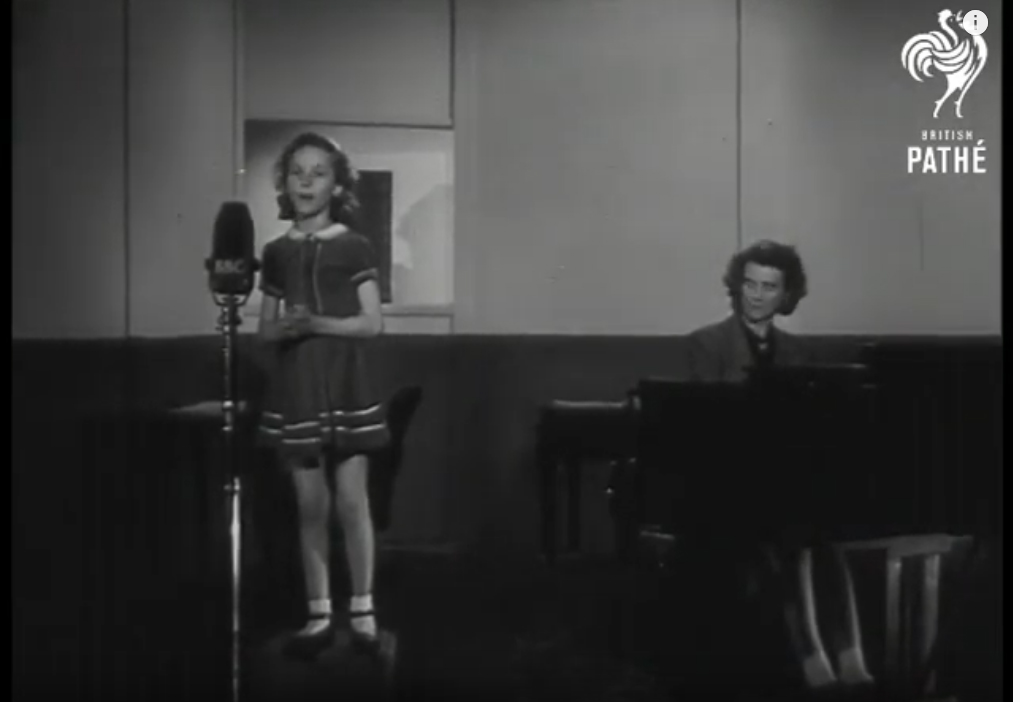
In a studio singing Mightly Lak a Rose.
MY DUTCH PEN FRIEND
Dutch Documentary Short
1945
Documentary Short (Netherlands)
Sponsored by National Savings and produced by British Foundation Pictures. Directed by Jean Haines. Petula is listed as the only cast member by the British Film Institute. Very little is known about this film. It is believed that Petula supplied narration.
MY DUTCH PEN FRIEND
Dutch Documentary Short
1945
Documentary Short (Netherlands)
Sponsored by National Savings and produced by British Foundation Pictures. Directed by Jean Haines. Petula is listed as the only cast member by the British Film Institute. Very little is known about this film. It is believed that Petula supplied narration.
CAST:
Tom Masterick................... William Hartnell
Tom Masterick................... William Hartnell
Peter Rogers.................... Jimmy Hanley
Doris Masterick................. Chili Bouchier
Fred Smith...................... John Slater
Sullivan........................ Brefni O'Rourke
Jill Masterick.................. Dinah Sheridan
Jill Masterick (as child)....... Petula Clark
FILM NOTES:
- Written and directed by Montgomery Tull
- Made at National Studios, Elstree, UK
- British National Film

REVIEWS:
- Full entertainment potentialities are extracted from a novel plot-twist in Britain's "Murder in Reverse," a taut melodramathat has a man sentenced to jail for a murder which, despite outward apperances, he never committed. In the picture's famour, in its development it avoids resorting to the many artifices and cliches that often find their way into a mystery-thriller. Also, as it goes on to its suspenceful climax, some intriguing character studies emerge.
It is a different type of film that sustains interest throughout and despite an inner-turbulence of theme, has restrained performances throughout. Also blended into the story is a pleasing romantic angle involving Dinah Sheridan and Jimmy Hanley.
Motion Picture Herald -- 28 December, 1946 - Seamark's well known story "Query" has been admirably adapted to the screen and poses with full dramatic force the question as to what happens to a man who has served a sentence for manslaughter, finds that his victim is alive after his release from prison and then really kills him.
Billy Harnell gives a fine performance as the wrongly-convicted stevedore who chased the man who seduced his wife and was convicted of murder with a strong recommendation to mercy. Chili Bouchier is very good as his unfaithful wife and Jimmy Hanley is bright and refreshingly jejeune as a young reporter who is sent after the story by his editor on the alledged murderer's release. Actually the latter had adopted the daughter of the convicted man, played with charm by Dinah Sheridan (as a child she is played by little Petula Clark)--and the reporter is in love with her.
Montgomery Tully's direction is imaginative but forceful and carries with it a sense of the French cinematic interpretation such as was instanced in "Quai des Brumes."
Picturegoer -10 November, 1945 - . . .Harsh, well-directed thriller.
British Sound Films - 1984
October 1945
Romance (UK) - 92 minutes
Plucky Englishwoman Joan Webster travels to the remote islands of the Scottish Hebrides in order to marry a wealthy industrialist. Trapped by inclement weather on the Isle of Mull and unable to continue to her destination, Joan finds herself charmed by the straightforward, no-nonsense islanders around her, and becomes increasingly attracted to naval officer Torquil MacNeil, who holds a secret that may change her life forever.
October 1945
Romance (UK) - 92 minutes
Plucky Englishwoman Joan Webster travels to the remote islands of the Scottish Hebrides in order to marry a wealthy industrialist. Trapped by inclement weather on the Isle of Mull and unable to continue to her destination, Joan finds herself charmed by the straightforward, no-nonsense islanders around her, and becomes increasingly attracted to naval officer Torquil MacNeil, who holds a secret that may change her life forever.
SYNOPSIS:
Stubborn, spoilt Joan Webster journeys north to marry wealthy Sir Robert Bellinger on the Scottish island of Kiloran, but a thick fog prevents her from leaving the mainland. Naval Lieutenant Torquil MacNeil suggests she spend the night at the house of his friend Catriona Potts. Next day the fog is replaced by a fierce gale, which again prevents a crossing. Torquil and Joan move to the Tobermory Hotel, on the way passing Castle Moy to which entry is forbidden to the Lairds of Kiloran by an ancient curse on the family. Torquil admits he is the penniless owner of Kiloran, forced to rent the island to Bellinger in order to pay the bills.
Still marooned, the pair attend a wedding anniversary ceilidh where it becomes clear that Torquil is in love with Joan, who, for the first time, is unsure of her feelings. She bribes young Kenny to take to sea in appalling weather but Torquil - concerned for Kenny's safety - takes command of the boat himself and by his skill and strength saves them from being lost in the treacherous Corryvreckan whirlpool. Next day, Joan finally sets off for Kiloran as Torquil enters the forbidden Castle Moy. He learns the true nature of the legend as Joan returns to fulfil the prophesy: any MacNeil who enters shall not leave there a free man, but be chained to a woman for the rest of his days.
--James Kendrick - Q Network
Stubborn, spoilt Joan Webster journeys north to marry wealthy Sir Robert Bellinger on the Scottish island of Kiloran, but a thick fog prevents her from leaving the mainland. Naval Lieutenant Torquil MacNeil suggests she spend the night at the house of his friend Catriona Potts. Next day the fog is replaced by a fierce gale, which again prevents a crossing. Torquil and Joan move to the Tobermory Hotel, on the way passing Castle Moy to which entry is forbidden to the Lairds of Kiloran by an ancient curse on the family. Torquil admits he is the penniless owner of Kiloran, forced to rent the island to Bellinger in order to pay the bills.
Still marooned, the pair attend a wedding anniversary ceilidh where it becomes clear that Torquil is in love with Joan, who, for the first time, is unsure of her feelings. She bribes young Kenny to take to sea in appalling weather but Torquil - concerned for Kenny's safety - takes command of the boat himself and by his skill and strength saves them from being lost in the treacherous Corryvreckan whirlpool. Next day, Joan finally sets off for Kiloran as Torquil enters the forbidden Castle Moy. He learns the true nature of the legend as Joan returns to fulfil the prophesy: any MacNeil who enters shall not leave there a free man, but be chained to a woman for the rest of his days.
--James Kendrick - Q Network
CAST:
Wendy Hiller................. Joan Webster
Roger Livesey ........... Torquil MacNeil
George Carney ........... Mr. Webster
Pamela Brown............. Catriona Potts
Walter Hudd.............. Hunter
Captain MacKenzie ......Captain of 'Lochinvar'
Petula Clark.................Cheril
Wendy Hiller................. Joan Webster
Roger Livesey ........... Torquil MacNeil
George Carney ........... Mr. Webster
Pamela Brown............. Catriona Potts
Walter Hudd.............. Hunter
Captain MacKenzie ......Captain of 'Lochinvar'
Petula Clark.................Cheril
FILM NOTES:
- Directed by Michael Powell and Emeric Pressburger
- Filmed on location in Scotland and Denham Studio (UK)
- Petula has a small role as Cheril Robinson, the bespectacled little know-it-all daughter of a wealthy family.
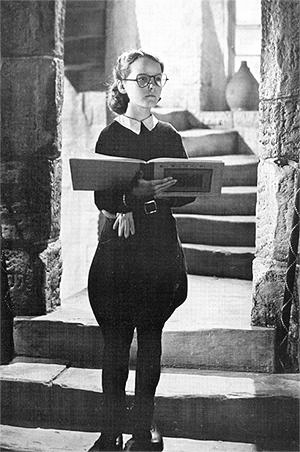
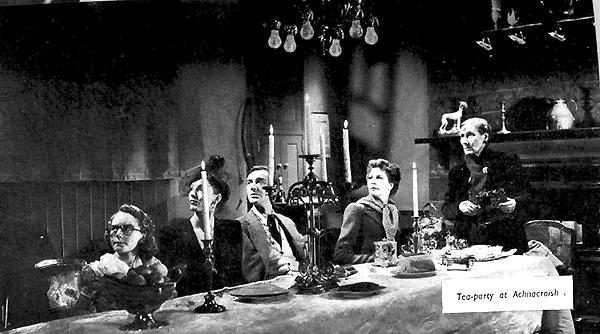
REVIEWS:
- "I know where I'm going!" declares the headstrong protagonist Joan Webster (Wendy Hiller). And she does. At only 25, she knows exactly where she's going as she heads off to an isolated island off the western coast of Scotland in order to marry an extremely wealthy industrialist. However, as Michael Powell and Emeric Pressburger's charming comedy of love and fate makes clear, just because you know where you're going doesn't mean you're going to end up there.
For the majority of the narrative in I Know Where I'm Going!, Joan is stranded in a small, Scottish coastal town as troublesome weather makes it impossible for her to cross the small stretch of ocean to get the island of Kiloran where her marriage is supposed to take place. At first, the problem is fog, and when Joan prays for winds to blow the fog away, she is answered with gale-force winds that further impede her journey.
Stranded along with her is Torquil MacNeil (Roger Livesey), a British naval officer on week's leave. Joan and Torquil make an unlikely pair, as he is generally polite and reserved, while she is brash and assured. Joan is a complex heroine in that, from the start, it is obvious that she is something of a gold digger. She never seems to act as if she is in love with the much-older man she plans on marrying (in fact, the movie makes sure that we never see them together, and we never see him at all, only hear his voice on a radio). The opening montage shows us Joan's development from infancy, while a comical narrator tells us how, from the time she was born, she knew where she was going (these early scenes have the dizzying rhythm and pace of a screwball comedy). Determination and self-reliance are what fortify her ambition, and Joan is so sure about herself that it takes her several days in Torquil's company to realize that she may be headed down the wrong path.
I Know Where I'm Going was the fifth film Powell and Pressburger wrote, produced, and directed together, and it shows them at the top of their form. Using the simple genre of the romantic comedy, they turn a few conventions on their heads while still filling the story with the requisite warmth and charm. After the first 10 minutes, the entire film is set in the mist-enshrouded Scottish highlands, which would seem an unlikely setting for a romantic comedy. Powell had a special affinity for Scotland, and it shows in the film's careful compositions and elegant photography. Stylistically, the film changes as the narrative progresses, starting off with jokey dissolve shots (such as one where a man's top hat dissolves into the steam-spewing stack of a locomotive) and bizarre dream sequences that gradually give way to the naturalistic splendor of the Scottish moors.
Cinematographer Erwin Hillier (who also shot Powell and Pressburger's A Canterbury Tale) gives I Know Where I'm Going a distinct visual texture that sets it apart. (The film was shot in black and white because Powell and Pressburger were waiting to get access to Technicolor cameras so they could make A Matter of Life and Death). The rough terrain and somber skies play counter to the lighter romantic elements of the story, while simultaneously enhancing the story's more mythical elements, such as an ancient curse that was supposedly put on a local castle that forbids Torquil from entering. The film climaxes in a spectacular action sequence that finds Joan and Torquil trapped on stormy seas and about to be sucked into a giant whirlpool created by the currents between two islands. This climax might feel oddly placed had it not been set up so well earlier in the film and nourished by its mythical undertones.
Like all of Powell and Pressburger's films, I Know Where I'm Going is a technical delight, mixing location photography with studio sets, trick photography, and a skilled use of doubles (although he appears to walk through the Scottish highlands in several scenes, Roger Livesey never shot a single scene outside of a soundstage). They also get great performances from their leads, especially Wendy Hiller (Pygmalion) who maintains Joan's spirited, but obstinate, personality with charm and grace (the role was originally intended for Deborah Kerr). Roger Livesey, who had played the lead role in Powell and Pressburger's The Life and Death of Colonel Blimp (1943), proves to be every bit her equal, with a solid performance as Torquil, a role that easily could have been a bore (it's always hard to play a nice guy and keep him interesting).
I Know Where I'm Going is an irresistibly charming film, one that is brimming with sly humor, gentle romance, and that wonderful sense of humanity and decency that was one of the hallmarks of Powell and Pressburger's films. Its deceptive simplicity is perhaps its greatest virtue.
James Kendrick - Q Network
Motion Picture Herald -- 28 December, 1946
CAST:
Mary...................Petula Clark
Mike......................David Lees
Mary...................Petula Clark
Mike......................David Lees
FILM NOTES:
- Story by Malcolm Saville
- The first book in the Michael and Mary series.
- Script adaptation by Darrel Catling
- Directed by Darrel Catling
- Produced by H. Bruce Turner
- Filmed at "No Man's Land" (the book author's farm) Hertfordshire & Merton Park Studios
- Director Darrel Catling recalls that Petula gave such a brilliant performance in several telling scenes (where she had to be bitchy) that the producer cut them out as they might be thought to encourage child audiences to get bad ideas!
REVIEWS:
- Another G.B. Instructional production dealing with the case of two children who visit their uncle's farm and learn something of country ways as the result of their numerous misdoings. Talented juvenile portrayal; pleasant scenic backgrounds. Very good.
THE CINEMA -- 30 January, 1946
September 1946
Musical (UK) - 126 minutes
A provincial comedian travels to London believing he's the star of a new show only to discover that he's merely been hired as understudy. He finally gets his big break, thanks to his mischevious daughter (Petula) who sabotages the revue's star.
September 1946
Musical (UK) - 126 minutes
A provincial comedian travels to London believing he's the star of a new show only to discover that he's merely been hired as understudy. He finally gets his big break, thanks to his mischevious daughter (Petula) who sabotages the revue's star.
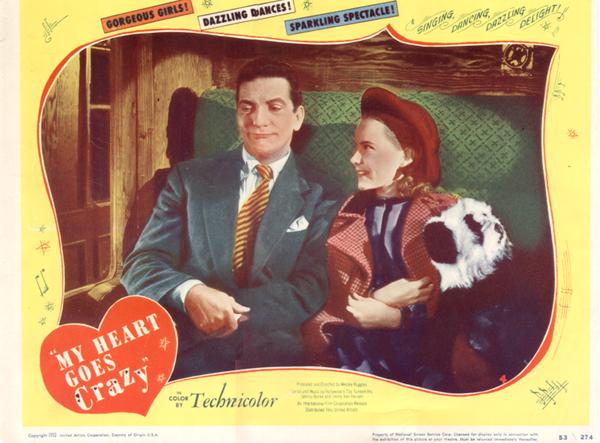
CAST:
Sid Field .............. Jerry Sanford
Greta Gynt ............. Mrs. Barry
Petula Clark .......... Peggy
Kay Kendall ............ Patsy
Sonnie Hale ............ Charlie
Claude Hulbert ......... Belgrave
Mary Clare ............. Mrs. Gates
Tessie O'Shea .......... Herself
Sid Field .............. Jerry Sanford
Greta Gynt ............. Mrs. Barry
Petula Clark .......... Peggy
Kay Kendall ............ Patsy
Sonnie Hale ............ Charlie
Claude Hulbert ......... Belgrave
Mary Clare ............. Mrs. Gates
Tessie O'Shea .......... Herself
FILM NOTES:
MUSIC: Musical numbers written by Jimmy Van Heusen & Johnny Burke
- Produced and directed by Wesley Ruggles
- Story by Wesley Ruggles
MUSIC: Musical numbers written by Jimmy Van Heusen & Johnny Burke
- "Moonlight on the Thames"
- "My Heart Goes Crazy"
- "So Would I"
- "Any Way the Wind Blows"
- "Amstead Way"
- "Trafalgar"
- "Daffodil"
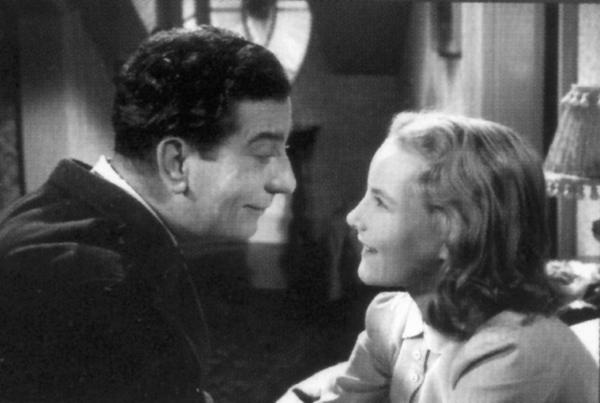

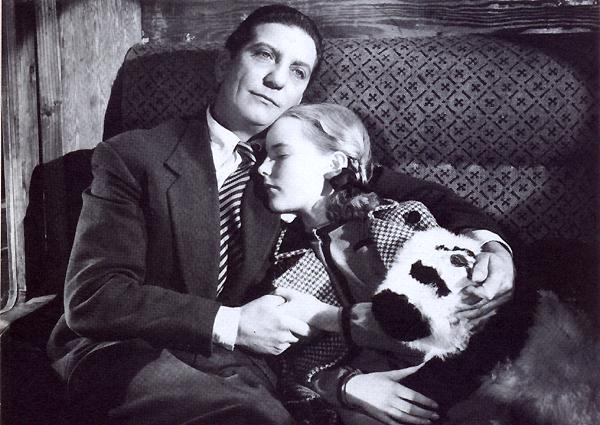
VIDEO PROMOTIONAL REVIEW:
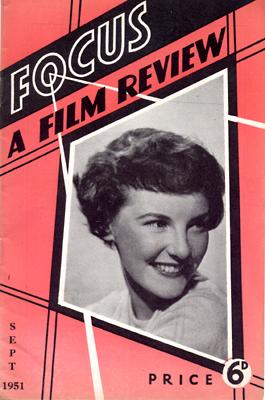 Cover Personality: Petula Clark
Cover Personality: Petula Clark
At the Press Reception which followed London Town, that lamentable effort to put London into a musical film, I noticed a rather shy little girl of about 11 years sitting demurely on a chair behind the gossiping film critics and film technicians and stars. She was dealing with an ice cream and seemed quite apart from the clatter of publicity with which she was surrounded. She was not eager to talk about herself and I remember that our conversation consisted mainly of exchanges of view about the films we had recently seen. I saw her again at the Press Reception which followed Vice Versa another gallant attempt to make us laugh which did not quite come off. Once again the little girl was eating ice cream and sitting in a sheltered part of the room while the critics and others made their customary after -film noises. Again she smiled shyly and seemed unwilling to talk about her own work and we exchanged a few remarks about other people's films.
Since then, Petula Clark has appeared in Easy Money, the Huggetts films, The Romantic Age and lately, as the probationer nurse in White Corridors. She began her film career in Medal for the General in 1944, and followed it up with a part in Strawberry Road(sic) and I Know Where I'm Going, for Archers, in 1946.
She also works very hard for the BBC. Whatever she does, whether the part be trivial or worthwhile, one notices the same intense earnestness to take trouble about films as such. The same pleasing shyness comes through the screen and one has the impression of an unspoilt personality. She has now reached the dangerous age for child film stars who have made the grade from little girl to teen-ager.
JOHN VINCENT
-
This was to be Rank Organisation's biggest musical extravaganza ever when they invited Hollywood producer/director Wesley Ruggles to descend on the Pinewood Studios and deliver a musical to rival Hollywood's best. The man that directed the Oscar winning Best Picture of 1931, the western "Commaron"; the Mae West comedy/musical "I'm No Angel"; the Bing Crosby musical "Sing You Sinners"; and the WW2 romance "Somewhere I'll Find You" starring Clark Gable and Lana Turner certainly had the credentials to carry it off. But despite the songwriting talents of Johnny Burke and Jimmy Van Huesen, Technicolor comedian Sid Field and the beautiful young Kay Kendall "London Town" proved ultimately to be an enormous flop.
It is however not without charm, much of it provided by a very English, young 13 year old named Petula Clark. She had made her movie debut two years earlier in "Medal for the General." She survived "London Town" to join the series of comedies about the Huggett family with Jack Warner and Kathleen Harrison. "Here Come the Huggetts" proved such a success for Gainsborough that it was followed by "Vote for Huggett" and "The Huggetts Abroad." Now 18, Petula moved to more adult fare in the nursing drama "White Corridors" and the comedies "Made in Heaven" and "The Card." Unfortunately, the roles did not get better for the lovely young star and she had opted out of movies by the end of the decade. Her burgeoning singing career delivered hits in the UK such as "The Little Shoemaker" and "Sailor." She met and married Frenchman Claude Wolff and moved to Paris where her recording career continued unabated. A song by a young composer Tony Hatch became an international hit makeing the #1 spot in the US charts. "Downtown" reinvented Petula Clark and her relationship with Hatch and his wife Jackie Trent led to further hits such as "I Know a Place", "Sign of the Times", "Don't Sleep in the Subway", "My Love", "You're the One" and "Colour My World"> She sang "This is My Song" to accompany the opening titles of Charles Chaplin's "Countess from Hong Kong" and soon found herelf back up on the big screen the following year in Warner Bros. production of the 1947 Broadway musical "Finian's Rainbow" with Fred Astaire and Tommy Steel. In 1969 she starred with Peter O'Toole in the musical remake of "Goodbye Mr. Chips". Still busy performing, Petula Clark visited Australia for concerts in 1998 and appeared in the touring musical "Sunset Boulevard" in the USA.

At the Press Reception which followed London Town, that lamentable effort to put London into a musical film, I noticed a rather shy little girl of about 11 years sitting demurely on a chair behind the gossiping film critics and film technicians and stars. She was dealing with an ice cream and seemed quite apart from the clatter of publicity with which she was surrounded. She was not eager to talk about herself and I remember that our conversation consisted mainly of exchanges of view about the films we had recently seen. I saw her again at the Press Reception which followed Vice Versa another gallant attempt to make us laugh which did not quite come off. Once again the little girl was eating ice cream and sitting in a sheltered part of the room while the critics and others made their customary after -film noises. Again she smiled shyly and seemed unwilling to talk about her own work and we exchanged a few remarks about other people's films.
Since then, Petula Clark has appeared in Easy Money, the Huggetts films, The Romantic Age and lately, as the probationer nurse in White Corridors. She began her film career in Medal for the General in 1944, and followed it up with a part in Strawberry Road(sic) and I Know Where I'm Going, for Archers, in 1946.
She also works very hard for the BBC. Whatever she does, whether the part be trivial or worthwhile, one notices the same intense earnestness to take trouble about films as such. The same pleasing shyness comes through the screen and one has the impression of an unspoilt personality. She has now reached the dangerous age for child film stars who have made the grade from little girl to teen-ager.
JOHN VINCENT
REVIEW:
- The critical and financial failure of the extravagant London Town (1946), Britain's first major Technicolor musical (there were one or two attempts in the thirties, but not on this scale), is part of British film legend. Lavishly funded, and produced by the Rank Organization in association with the American director Wesley Ruggles at a time of rationing and shortages of materials (perhaps this explains why so many of the chorus girls costumes are muddy green or khaki!), it was filmed in the shell of 'Sound City Shepperton' (later renamed the London Film Studios by Korda, and later Shepperton Studios) which had just been made available as a film studio after being requisitioned during the war as a factory for aircraft parts. According to reports, part of the studio was still being used for this purpose during the production of London Town. It was unusual for Rank to produce a film here, but perhaps Denham was fully booked! (Pinewood was still occupied by the goverment, not being released for film production until well after the war).
Sid Field was the talk of London town at the end of the war, having just conquered and cheered up wartime London audiences with his enormously successful stage variety shows, and so he could more or less dictate his own terms for the film. He insisted on having an American director, as he was of the opinion that no British director was capable of making a good musical (hadn't he heard of Victor Saville?). J.Arthur Rank, flush with funds (cinema admissions in 1945 were at an all-time high), was happy to spend large sums of money to bring over a fading American comedy director of the 1930's with little experience of musicals, whose career was, frankly, on the slide in Hollywood, then give him lots of money and a financial stake through his own production company, mainly funded by Rank. Top US songwriters were comissioned, musicians were placed under "long term contracts", and the studio also had to be re-equipped from the ground up! Rank was confident that, even though he was wasting money left, right and centre, the cinema business was so bouyant at this time, that he would still make a healthy profit. And financial controls were slack, to say the least....
The movie became a legendary turkey! It was not that UK audiences stayed away in droves from London Town, just that the film needed to perform spectacularly well just to break even at the box office. Critics were dismissive, calling it "Tacky and Tasteless". In hindsight, and especially for 1940's nostalgia fans, these aspects make it absolutely fascinating! Apart from the kitsch elements, the film is also interesting historically. After Britain's victory in the war, it can be seen as a tribute to London and its citizens, and as a celebration of popular cockney culture, especially music hall. It also, in a way in which the makers almost certainly didn't intend, celebrates the sense of community, the "all classes in harmony" as seen in the Riverboat sequence, filmed as a day out on the River Thames, below Windsor Castle. The symbolism of this is fascinating, as all are included, from the very high Royalty in the Castle, to an Eton Schoolboy, to the cockney folk, all living in harmony in this "English Utopia." With its emphasis on "Community Values," it could almost be an election commercial for Clement Atlee's Labour government, which swept to power in the same year!
The Songs in London Town include: 'You Can't Keep a Good Dreamer Down,' 'The 'Ampstead Way,' 'Any Way the Wind Blows,' 'So Do I ' (performed by 1940's Dance Band singer Beryl Davis), 'My Heart Goes Crazy,' and a medley of cockney songs: 'Knock 'em in the Old Kent Road/Any Old Iron/(My Old Man Said) Follow the Van.'
The musical director was Tutti Camerata, from Decca Records, and many of the musicians who played on the soundtrack went on to form the Ted Heath band. The film orchestra is, in effect, the Ted Heath band of 1945 in embryonic form. (Ted Heath was the "orchestral contractor" for the film, which may have given him a taste for band leadership!). The music and lyrics were by Bing Crosby's regular collaborators Jimmy Van Heusen and Johnny Burke, and the film is not without interest. Much of the material for the comedy sketches comes from comedian Sid Field's two West End wartime variety revues, Strike a New Note (Prince of Wales, 1943) and Strike it Again (Prince of Wales, 1944), which were highly successful with the public (followed by Piccadilly Hayride (Prince of Wales,1946). Strike it Again featured the golf sketch which is seen in London Town. Thus the film provides a valuable historical record of 1940's variety, with comic sketches and musical production numbers, all in Technicolor. Among those featured are Kay Kendall singing 'The 'ampstead way,' and with The Dozen and One Girls (also known as The London Lovelies, as they are billed in the film's press book) 'My heart goes crazy': fourteen year old Petula Clark appears in a non singing role, and Tessie O'Shea, later to appear in Noel Coward's The Girl Who Came to Supper (Broadway Theatre NY, 1963) demonstrates her ability to steal the show, in the 'Pearly Kings and Queens' sequence. London Town was released in the US in a truncated form by United Artists in 1953 under the title My Heart Goes Crazy.
Roger Mellor - Full Alert Reviews
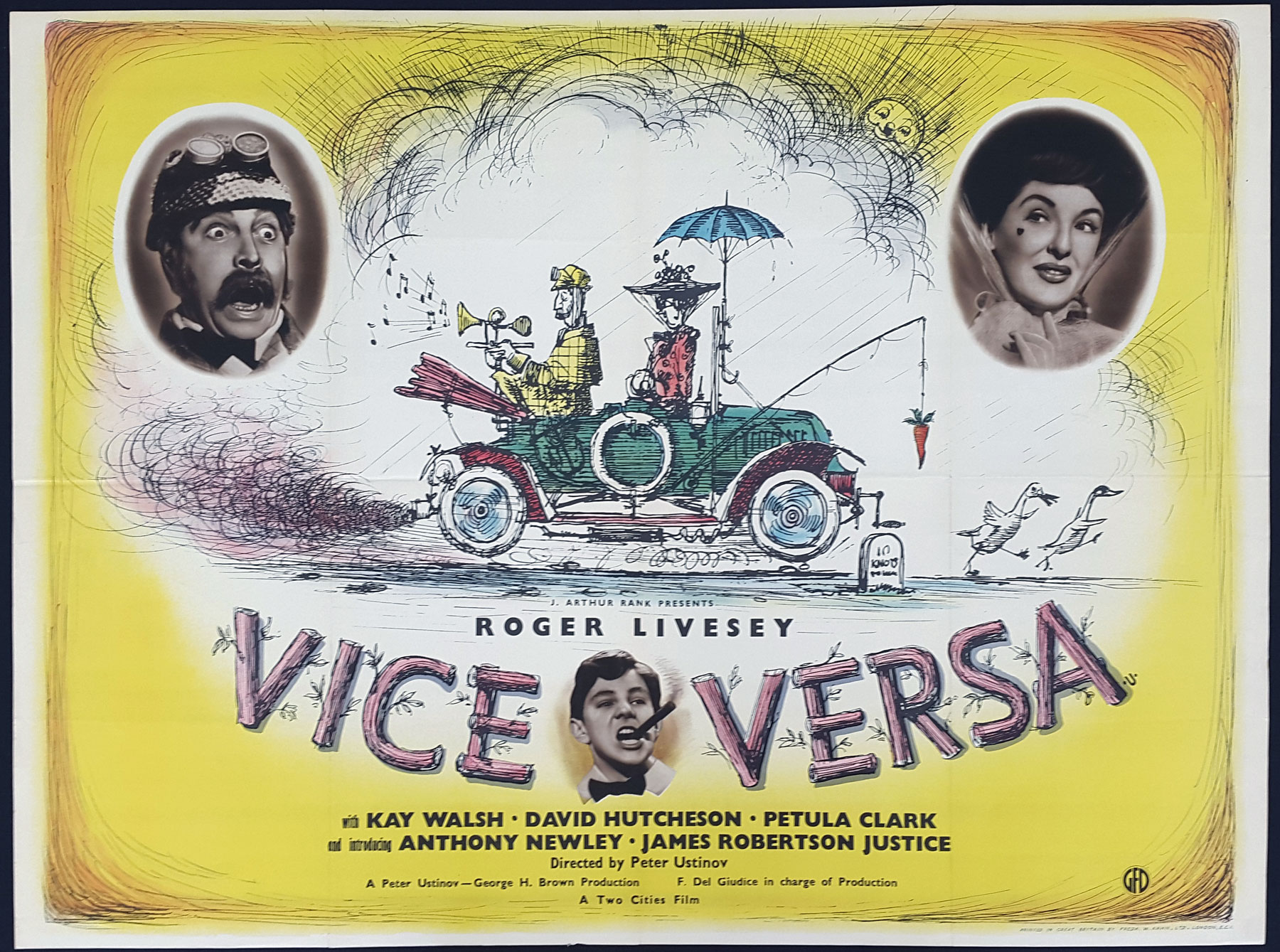
SYNOPSIS:
Mr Bultitude is returning his reluctant son, Dick, to boarding school when he announces he wishes he were a boy again. Being in the possession of the Garuda Stone, a magical Indian treasure, his wish is granted. Moments later his son takes the stone and wishes to be an adult. So the two swap roles and lives, but as they both live out their desires, they get slightly more than they bargained for.
Petula's role is that of the schoolmaster's daughter, Dulcie, to whom the boy, Dick had been most attentive the year before, and is heart-broken by the priggish behavior of the father.
CAST:
Roger Livesey .....................Paul Bultitude
Kay Walsh .........................Florence 'Fanny' Verlane
Petula Clark ..................... Dulcie Grimstone
David Hutcheson ...................Marmaduke Paradine
Anthony Newley ................... Dick Bultitude
James Robertson Justice ...........Dr. Grimstone
Patricia Raine ....................Alice
Joan Young ........................Mrs. Grimstone
Vida Hope .........................1st Nanny
Roger Livesey .....................Paul Bultitude
Kay Walsh .........................Florence 'Fanny' Verlane
Petula Clark ..................... Dulcie Grimstone
David Hutcheson ...................Marmaduke Paradine
Anthony Newley ................... Dick Bultitude
James Robertson Justice ...........Dr. Grimstone
Patricia Raine ....................Alice
Joan Young ........................Mrs. Grimstone
Vida Hope .........................1st Nanny
FILM NOTES:
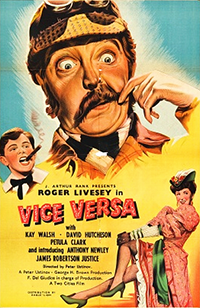
- Written and directed by Peter Ustinov
- Based on the novel by F. Anastey
- Remade in 1988 starring Judge Reinhold and Fred Savage

REVIEWS:
- Peter Ustinov at twenty-six is just the right age to direct Two Cities' Vice Versa, for F. Anstey was twenty-six when he published the book. That was way back in 1882, but this classic of late Victorian humour comes to life on the screen with its preposterous situations and absurd characters as fresh as ever they were, and with a little modern something added for good measure by Peter Ustinov and his co-producer George Brown. Making this light-hearted frolic must have been as much fun as seeing it on the screen, especially as the cast included an elephant, four white mice, one Pekinese dog, one seal, a troop of monkeys, a 1912 vintage car and actors dressed in all the strange sartorial elegance of the 'eighties. But. amusing as such a collection might be, there was work to be done too, and at times this varied cast was a little difficult. The Pekinese, for example, was required to take a violent dislike to Roger Livesey, who plays Paul Bultitude. This was beyond her powers, and indeed she loved him from the first! But as she was chosen from fifty applicants for the part, it seemed a pity to replace her; so, one way or another (but don't ask how!) she was persuaded to attack Roger tooth and claw, and as the film shows, she was then a very formidable Pekinese indeed.
Paul Bultitude is a pompous and prosperous stockbroker. One chilly evening in the year 1890 he is saying goodbye to his elder son, who is returning unhappily to boarding school. Fatuously he expresses the wish to become a boy again. At the same time the boy wishes to be a man like his father; and because he is holding a jewel stolen years before from an Indian temple, the miracle happens. The schoolboy Dick becomes Paul Bultitude. The reluctant stockbroker, who has suddenly been turned into a knicker-bockered boy, is hustled off to school by the butler - his son becomes head of the prim Victorian household.
Dr Grimstone, the headmaster, is scandalised by the 'boy's' antics. His daughter Dulcie, to whom the real Dick was most attentive, is heartbroken. His school fellows, amazed by the behaviour of the prig that 'Dick' seems to have become during the holidays, proceed to deal with him as only schoolboys can. At home in London, 'Paul' gives children's parties on a lavish scale, flirts with the parlourmaid, wards off his father's shady lady friend, Mrs Verlayne, and starts a motor car factory in partnership with his reprobate Uncle Marmaduke, who stole the temple jewel. At length, 'Dick' escapes to London. With the help of his younger son and the magic stone he reverses the situation. Once more Paul becomes the real Paul - and Vice Versa.
Brit Movie Review
SYNOPSIS:
This Gainsborough picture presents a quartet of separate stories about people who win a fortune on the football pools. The four stories involve vastly differing characters and show the hilarious events that can occur when people are suddenly thrust into wealth.
Petula stars in Episode One, which features the calamaties that befall a suburban family who believe they have won the pool, only to discover that the winning coupon hadn't been posted.
CAST:
(Episode 1)
Philip Stafford..............Jack Warner
Ruth Stafford ...............Marjorie Fielding
Carol Stafford...............Yvonne Owen
Dennis Stafford..............Jack Watling
Jackie Stafford...............Petula Clark
Grandma.........................Mabel Constanduros
Martin Latham................David Tomlinson
Det.-Inspector Kirby.........Maurice Denham
(Episode 1)
Philip Stafford..............Jack Warner
Ruth Stafford ...............Marjorie Fielding
Carol Stafford...............Yvonne Owen
Dennis Stafford..............Jack Watling
Jackie Stafford...............Petula Clark
Grandma.........................Mabel Constanduros
Martin Latham................David Tomlinson
Det.-Inspector Kirby.........Maurice Denham
FILM NOTES:
- Directed by Bernard Knowles
- Written by Muriel Box & Sydney Box
- Based on the play by Arnold Ridley
A BRILLIANT CAST OF BRITAIN'S UP AND COMING YOUNG STARS will win high praise in a film that has everything--Comedy, Drama, Pathos--and a first-rate topical up-to-the-minute story

PETULA CLARK Born at Ewell, Surrey, she broadcast early in the war and so impressed BBC listeners that she was given more broadcasts and was subsequently in great demand for charity shows. Became a great favourite with American troops at Rainbow Corner and has made many films including "A Medal for the General," "Strawberry Roan," "Trouble at Townshend," (sic) "I Know Where I'm Going,""Murder in Reverse," and "London Town." Last two pictures include "Easy Money" and "Vice Versa." She has been signed by Sydney Box to play the young daughter in his new family series. Noted chiefly for her mature signing, she broadcasts each week in the Michael Howard--Monte Rey programme.
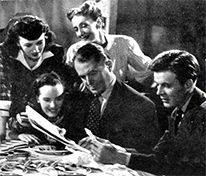

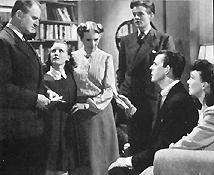
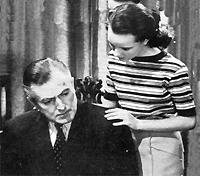
REVIEWS:
- Easy Money is a satire of that most venerated of all middle-class British traditions, the football pool. The film is divided into four separate episodes, illustrating the effects of the football pool on the "average chap." Among those who participate in the pool in hopes of winning the 50,000-pound jackpot are the Stafford family: husband Phillip (Jack Warner), wife Ruth (Marjorie Fielding), son Dennis (Jack Watling), and daughter Jackie (Petula Clark). Other interested parties are the Atkins clan -- Herbert (Mervyn Johns) and Agnes (Joan Young) -- and lovers Pat (Greta Gynt) and Joe (Dennis Price). Among the huge cast of supporting players, Edward Rigby stands out as the hapless Teddy Ball. Critics of the time noted that Easy Money was faintly reminiscent of the all-star 1932 Hollywood film If I Had a Million.
Hal Erickson, All Movie Guide
- Portmanteau comedy about people who win or try to win the pools. A nice cast of forties stalwarts (Petula Clark, Dennis Price, Maurice Denham, Mabel Constanduros and many others) tries to breathe life into Muriel and Sidney Box' script but as usual with these movies it's all very variable. The only real interest is in the documentary sequences showing a pools operation. Also Greta Gynt does a number (Lady Spiv by Vivian Ellis) as a blatant rip-off of Rita Hayworth doing Put the Blame on Mame, and shows us how thin the line between greatness and naffness is.
David Absalom - britishpictures.com
- When the film opened, I was genuinely intrigued with the story of a suburban family headed by Jack Warner, rather down on his luck, who believes they have won a big football pool. Later they discover the younger daughter (our Pet) had forgotten to post the coupon. Later still it turns out that it is the letter of the week before she had forgotten to post. Whilst all this excitement is afoot, all sorts of domestic upheavals occur. Delightfully human and well presented. And that's the end of that--unfortunately--because this picture has four episodes all dealing with the business of football pools. I must say I found this disconcerting. . .
Generally the acting is on a high level. Pleasant entertainment, but too disjointed.
Picturegoer - January 1948
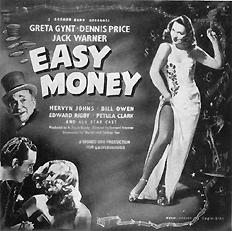 Poster
Poster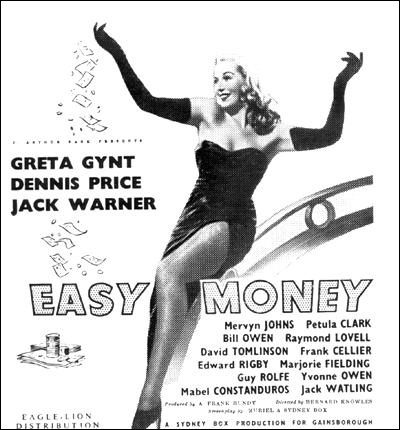 Ad
Ad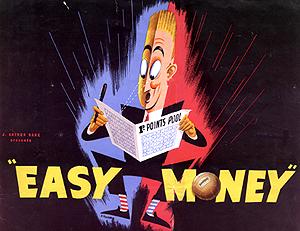 Press Book
Press Book
1948
Documentary Short (UK) - 2 minutes
Two-minute narrated documentary short that follows a day in Petula's life. The day begins with a morning beverage. Petula is then driven to a studio where her hair is done before she arrives on set to film a scene from Here Come the Huggetts with Kathleen Harrison. A movie clip follows. Having no television or radio show to do in the afternoon, Petula has her afternoon free to visit a farm while the narrator discusses healthy products that go into making a certain hot beverage. That drink is not actually mentioned but at the end Petula's (real) mother enters the living room with drinks on a tray to serve to her family, and the tin of drink powder is clearly visible but the label is not. (This is actually Ovaltine.)
1948
Documentary Short (UK) - 2 minutes
Two-minute narrated documentary short that follows a day in Petula's life. The day begins with a morning beverage. Petula is then driven to a studio where her hair is done before she arrives on set to film a scene from Here Come the Huggetts with Kathleen Harrison. A movie clip follows. Having no television or radio show to do in the afternoon, Petula has her afternoon free to visit a farm while the narrator discusses healthy products that go into making a certain hot beverage. That drink is not actually mentioned but at the end Petula's (real) mother enters the living room with drinks on a tray to serve to her family, and the tin of drink powder is clearly visible but the label is not. (This is actually Ovaltine.)
November 1948
Comedy (UK) - 93 minutes
Cozy, domestic comedy-drama revolving around the ups and downs of the Huggetts, a typical British middle-class family first introduced in Holiday Camp. In this episode, flashy cousin Diana comes for a visit with calamitous results: She costs Father Huggett his job, inspires the boy next door to take the family car out for a spin only to crash it and she causes Pet to mistakenly believe that her cousin is jeopardizing the Huggett marriage.
November 1948
Comedy (UK) - 93 minutes
Cozy, domestic comedy-drama revolving around the ups and downs of the Huggetts, a typical British middle-class family first introduced in Holiday Camp. In this episode, flashy cousin Diana comes for a visit with calamitous results: She costs Father Huggett his job, inspires the boy next door to take the family car out for a spin only to crash it and she causes Pet to mistakenly believe that her cousin is jeopardizing the Huggett marriage.
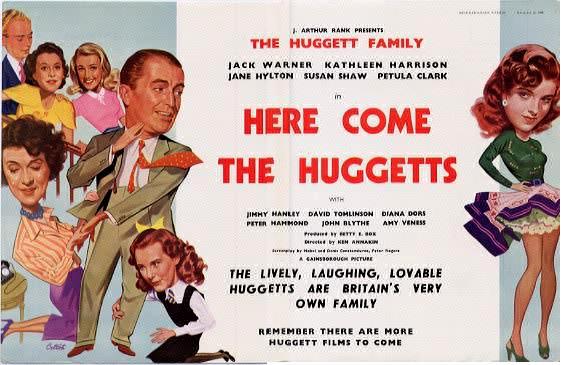
CAST:
Jack Warner
Kathleen Harrison
Jane Hylton
Susan Shaw
Petula Clark
Jimmy Hanley
David Tomlinson
Diana Dors
Peter Hammond
Jack Warner
Kathleen Harrison
Jane Hylton
Susan Shaw
Petula Clark
Jimmy Hanley
David Tomlinson
Diana Dors
Peter Hammond
................Joe Huggett
........Kathleen Huggett
.................Jane Huggett
..............Susan Huggett
.................Pet Huggett
.................Jimmy
...........Harold Hinchley
............Diana Hopkins
..............Peter Hawtrey
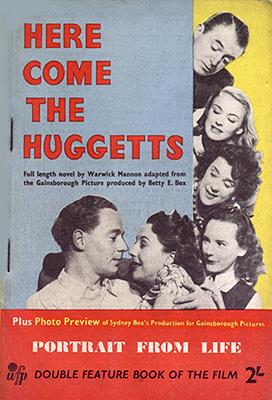 Paperback
Paperback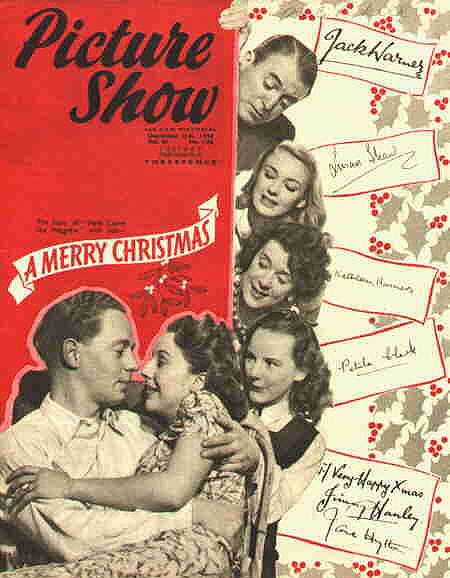 Picture Show magazine
December 1948
Picture Show magazine
December 1948 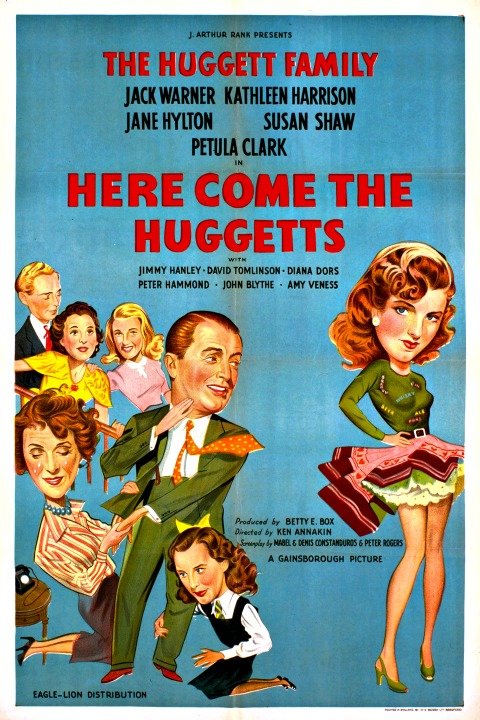
FILM NOTES:
- Directed by Ken Annakin (who directed all of the Huggett films)
- Rank/Gainsborough Production
- Filmed at Islington Studios
- Soundtrack: Petula sings "Walking Backwards" by Jack Fishman and Peter Hart
- Ken Annakin's initial feature film was Holiday Camp, a delightful British comedy set in one of the new Butlin holiday camps, starring Jack Warner and Kathleen Harrison as Mr. and Mrs. Joe Huggett. The Huggett sagas were something like Britain's version of the successful American Ma and Pa Kettle films spawned by The Egg and I. British moviegoers responded enthusiastically to light-hearted comedy, as if to say that the sacrifices of the war had been made in part to preserve humor and gaiety. Gainsborough was only too happy to oblige the public and Annakin directed two Huggett films released in 1948, Here Come the Huggetts and Vote for Huggett, and another in 1949, The Huggetts Abroad. "I believe that the Huggett films succeeded for the same reason that successful sitcoms do today," Annakin surmises. "The films focused on the happy side of life without unpleasantness. Audiences could identify with the characters and were entertained. Things were always upbeat and never downbeat. The Huggett films made audiences feel good."
Two budding stars who learned their craft in Annakin films were Petula Clark and Anthony Newley. Future sex symbol Diana Dors first titillated British audiences in the Huggett series. Dors, a 15-year-old jitterbug queen, was selected by Annakin to display her natural charms in Vote for Huggett. "It is my feeling based on experience as a director that 40% of young people have the ability to act," Annakin says. "The hard part is to determine the 10% I feel have the capability to become outstanding. It was a pleasure working with young performers like Pet Clark, Tony Newley, and Diana Dors and see them progress as performers."
The Ken Annakin Story by William Hare

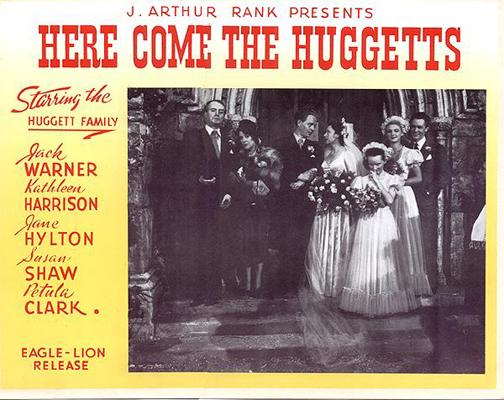
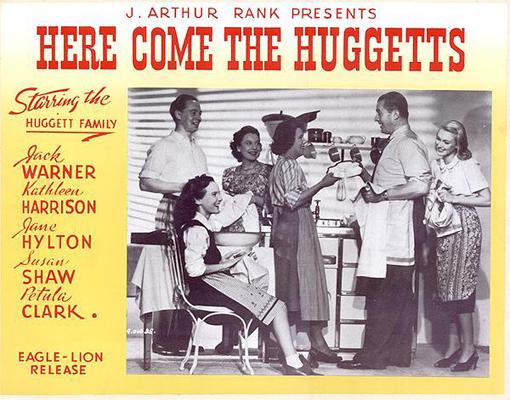
REVIEWS:
- Here come the Huggetts--and they are welcome! Admittedly the picture dealing with a suburban family consisting of father, mother and three daughters--incidentally, why no son? -- is rather discoursive and lacks tautness in its continuity, but it's good fun. Mabel and Denis Constanduros have written in some very birght lines and the incidents generally are amusing, the interest quite well sustained. It's an unpretentious affair and none thw worse for that. Jack Warner and Kathleen Harrison, notable parents in "Holliday Camp", keep up the same spirit with the requisite touch of sentimentality. As their eldest daughter, Jan Hylton is good, Susan Shaw registers as the second daughter. Particularly likeable is Petula Clark, as the youngest, who believes her father is having an affair with a flashly blonde cousin who has come to stay with them. Diana Dors is just right as the up-to-date good-time girl.
If the series keeps up the standard, it is going to be very popular, even if it does not break records in the West End.
Picturegoer -- 18, December 1948 - Britain's answer to the Hardys, depending on how you look at it. Tolerable at the time. Leslie Halliwell
- The first of a famous series of British family films revolving around a Royal Wedding. The film deals with the ordinary happenings of a typical middle-class household. Drama and comedy, laughter and tears combine to form the ideal entertainment mixture.
Carlton International
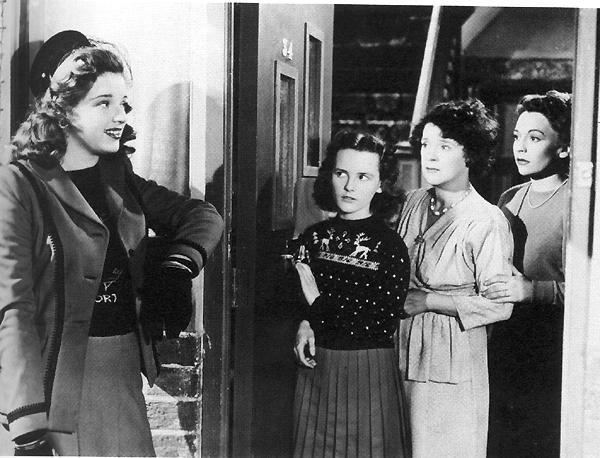
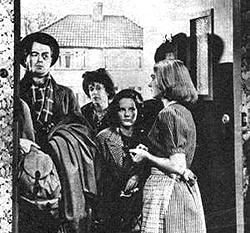
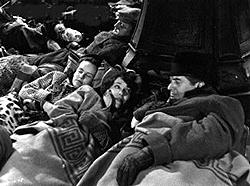
1949
Comedy(UK) - 82 minutes
In this comedy, the Huggett family patriarch decides to run for public office. His entire platform is built upon a promise to construct a war memorial. Unfortunately, he wants to build it on a parcel of his wife's land. She doesn't want anything there so her niece fakes her signature and the land gets donated. Fortunately, the candidate's daughter finds out about her conniving cousin and is able to save her father's name and his election.
Sandra Brennan, All Movie Guide .
1949
Comedy(UK) - 82 minutes
In this comedy, the Huggett family patriarch decides to run for public office. His entire platform is built upon a promise to construct a war memorial. Unfortunately, he wants to build it on a parcel of his wife's land. She doesn't want anything there so her niece fakes her signature and the land gets donated. Fortunately, the candidate's daughter finds out about her conniving cousin and is able to save her father's name and his election.
Sandra Brennan, All Movie Guide .
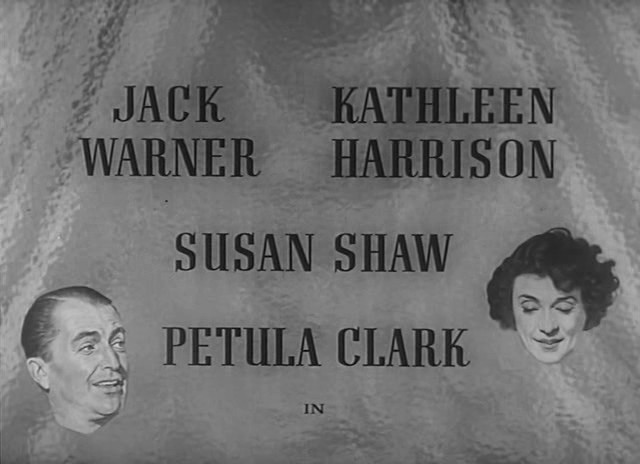
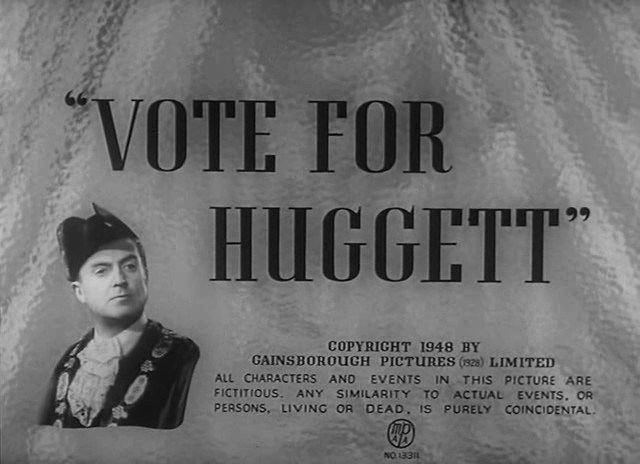
CAST:
Jack Warner
Kathleen Harrison
Susan Shaw
Petula Clark
Diana Dors
David Tomlinson
Jack Warner
Kathleen Harrison
Susan Shaw
Petula Clark
Diana Dors
David Tomlinson
................Joe Huggett
........Kathleen Huggett
..............Susan Huggett
.................Pet Huggett
............Diana Hopkins
...........Harold Hinchley
FILM NOTES:
- Directed by Ken Annakin (who directed all of the Huggett films)
- Rank/Gainsborough Production
- Filmed at Islington Studios
- Soundtrack: Petula sings "In the Shade of the Old Apple Tree" by Jack Fishman and Peter Hart
REVIEWS:
- This second in the Huggett family series is a considerable improvement on the lamentable Here Come the Huggetts, that strangely distorted mirror of British family life with which the series made its bow. Sustituting robust local politics for sex unpleasantries, these new escapades show Pa Huggett advocating a pleasure garden and lido for the community, thus incurring the rivalry of an alderman who, being a builder, is naturally keen on a community centre. With Huggett pressed to made the issue one of local politics, the whole family rally round the old man, young daughter Pet doing stout work on the home-made poster front, Ma refusing to sell the bit of land on which the lido must be built and second daughter Susan dramatically producing proof of the forged document, which says that Ma has been making a bit on the side. All of which adds up to Pa becoming Councilor Huggett but not before enduring a riotous political meeting and being generally branded as liar, twister and crook. This time, too, the family enjoy much more engaging by-play to charaterise their domestic unity. As a result, Jack Warner emerges as a down-to earth dad with the humble yet forthright diction of the species with Kathleen Harrison suitably stricken at the prospect of dad's looming political fame Likeable collaboration is on hand from Susan Shaw and Petula Clark as the earnest young daughters.
Today's Cinema-- 8/2/49
- . .The film is well up to the standard set by the first in the series, and relies for its appeal on its homely humour and fine characterisations by Jack Warner and Kathleen Harrison as Joe and Ethel Huggett, Susan Shaw and Petula Clark as their daughters and Diana Dors as niece Diana. Strong support is rendered by the remainder of the cast.
Monthly Film Bulletin - February 1949
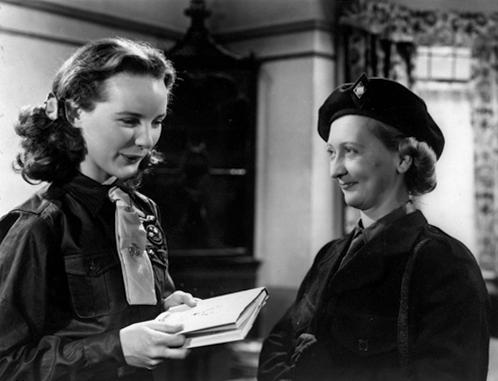


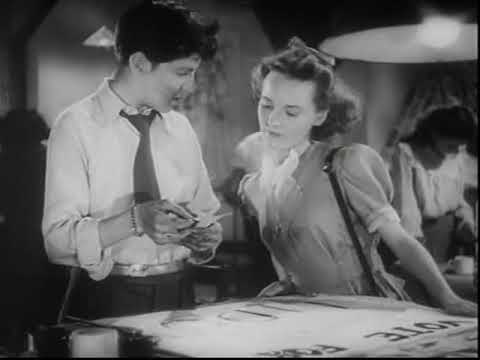
May 1949
Comedy (UK) - 87 minutes
Life is not going well for the Huggetts. Father has lost his job. Jimmy and his wife cannot get to South Africa where he has a new job. So the family decide that they should go to South Africa by truck. With their travelling companion they travel across the desert which includes a brush with the law.
May 1949
Comedy (UK) - 87 minutes
Life is not going well for the Huggetts. Father has lost his job. Jimmy and his wife cannot get to South Africa where he has a new job. So the family decide that they should go to South Africa by truck. With their travelling companion they travel across the desert which includes a brush with the law.

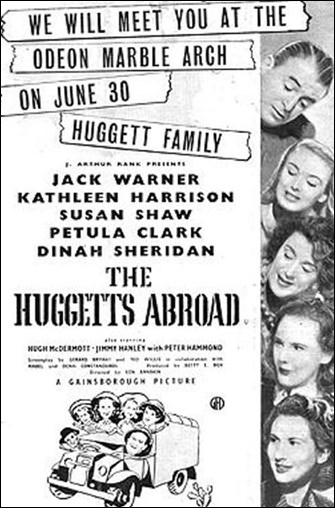
CAST:
Jack Warner
Kathleen Harrison
Dinah Sheridan
Susan Shaw
Petula Clark
Jimmy Hanley
Jack Warner
Kathleen Harrison
Dinah Sheridan
Susan Shaw
Petula Clark
Jimmy Hanley
................Joe Huggett
........Kathleen Huggett
..........Dinah Sheridan
..............Susan Huggett
.................Pet Huggett
............Jimmy
FILM NOTES:
- Directed by Ken Annakin (who directed all of the Huggett films)
- Rank/Gainsborough Production
- Made at Islington Studios and Petula has not-so-fond memories of sand--everywhere!
- Soundtrack: Petula sings "House in the Sky" and "Doodle-oodle-day" by Jack Fishman and Peter Hart
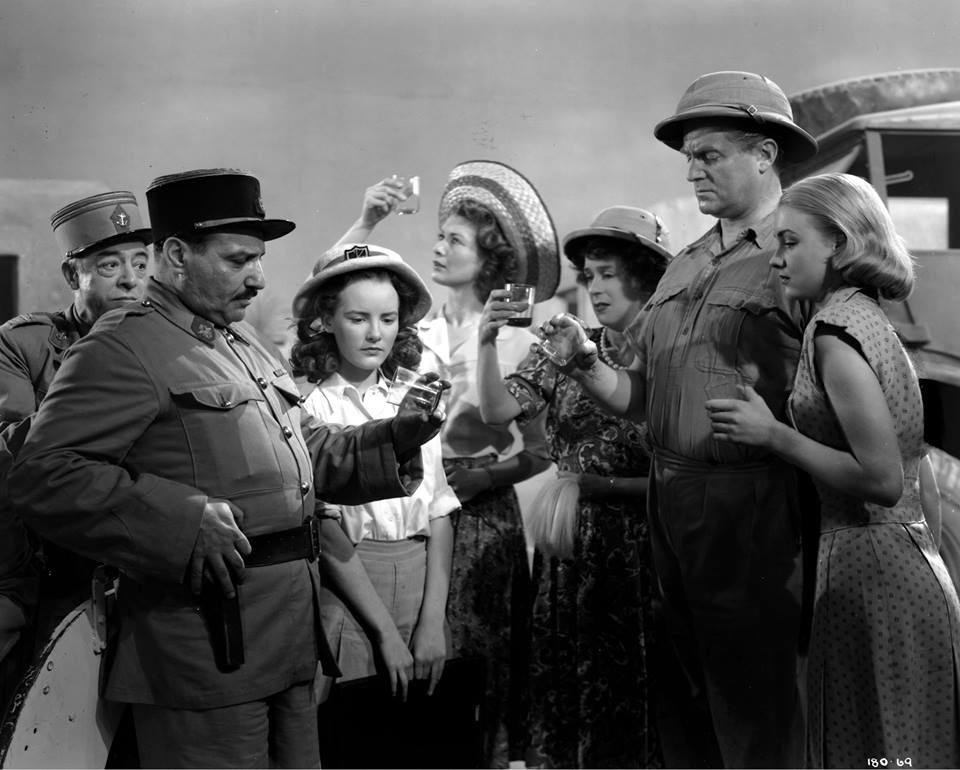
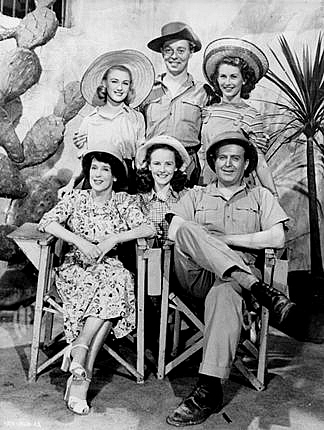
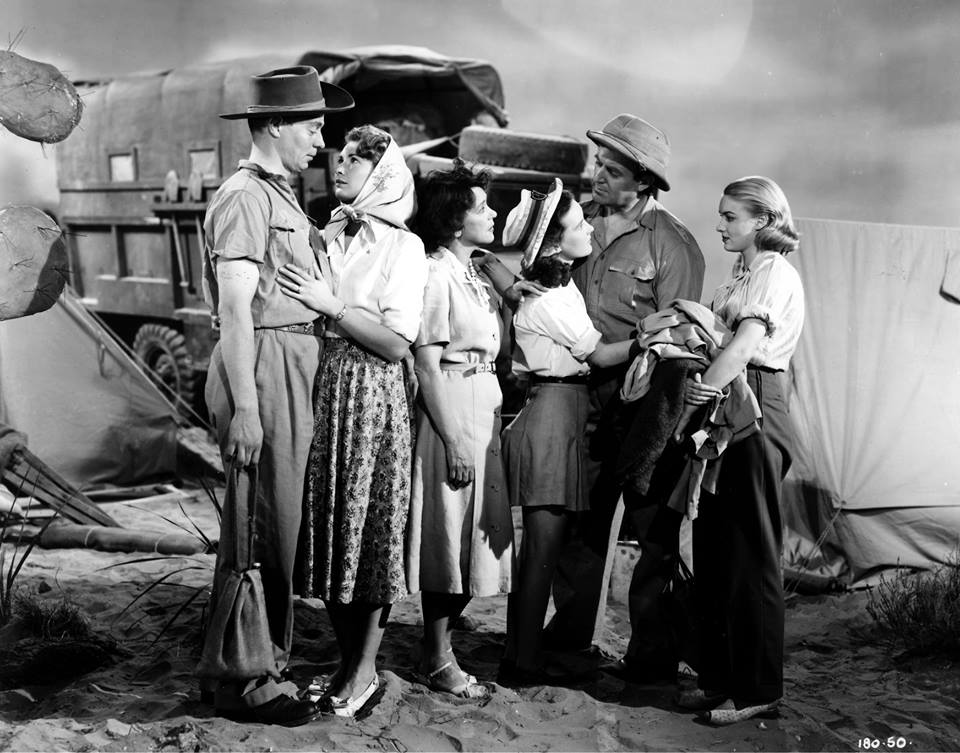
REVIEWS:
- The Huggetts Abroad is the last and most contrived of Britain's "Huggetts" film series. The titular family members, first introduced in the 1947 film Holiday Camp, are played by Jack Warner, Kathleen Harrison, Susan Shaw and Petula Clark (the same). Mr. Huggett feels he's in a rut, so he quits his jobs and packs himself and his family off to Africa. In quick order, the innocents abroad (a) become involved with diamond smugglers and (b) wind up in jail. When his job becomes available again, the chastened Mr. Huggett returns to his own back yard. Four writers were required to concoct this tired British Ma and Pa Kettle equivalent.
Hal Erickson, All Movie Guide - Thanks to Pa Huggett being suspected of a spot of "fiddling" at his job, the family depart for South Africa in this third of their screen adventures, taking with them a Canadian who turns out to be a diamond smuggler. En route, the latter gets a bullet in his leg, the convoy runs into a sand storm, the Huggett lorry loses its way, Pa heroically goes for help in company with his son-in-law, and in the resultant hospital climax the gaff is blown about their smuggling buddy. Gladly the Huggetts plan to return to England!
The andventure angle of these goings-on is at once fanciful and placid--from the viewpoint of really exciting action--leaving the material entertainment once more vested in the likeable domestic charterisation and the down-to-earth dialogue. As these latter have already been widely acclaimed by the masses, the successs of more flock to renew acquaintance with the phiosophic Joe Huggett, his voluble better half, the fickle Susan and the youthful Pet. These dominating roles are once again engagingly played by Jack Warner, Kathleen Harrison, Susan Shaw and Petula Clark, who are this time abetted by Dinah Sheridan and Hugh McDermott as the suavely pattering smuggler. Faithful sweetheart Peter Hammond, grandma Amy Veness and son-in-law Jimmy Hanley remain in the cast to divert with their homely portraiture.
Today's Cinema - 22 April, 1949 - . . .Just a few smiles in meandering Huggett film: the series went no further.
[Ed. note: Despite best efforts]
British Sound Films - 1984
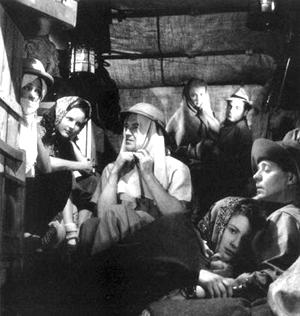
>
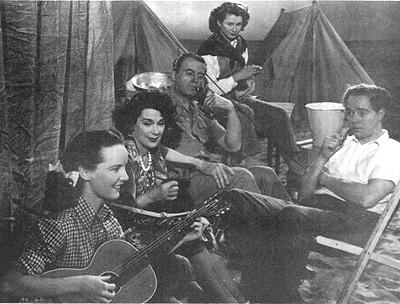 Pet entertains the family with a rendition of House in the Sky.
Pet entertains the family with a rendition of House in the Sky.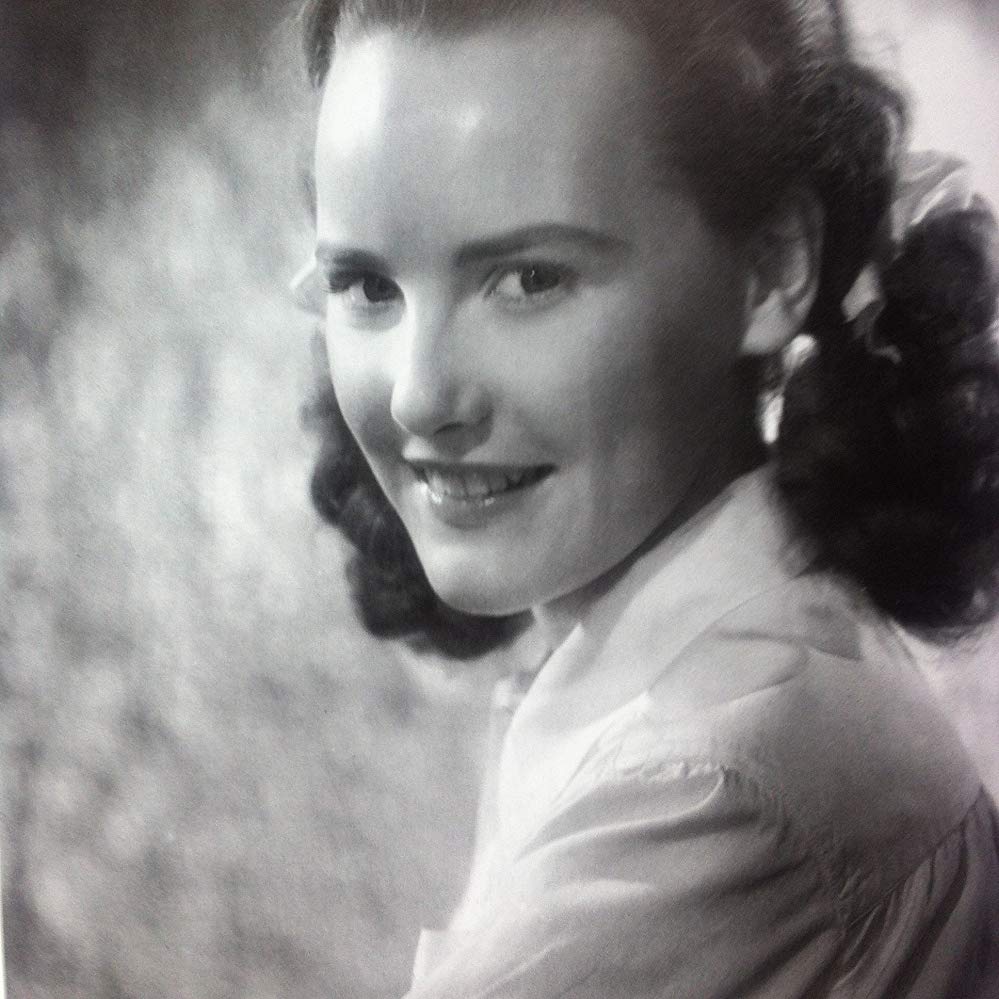
July 1949
Comedy-Musical-Romance (UK) - 85 minutes
Jack Denton (has gone to collect his wayward grandfather, Harry, from prison. As soon as he is free, however, Harry returns to his old ways and steals the car of famous actor Michael Farlaine, kidnapping his 16 year old daughter, Sheila (Petula) in the process. Sheila, bored with her home life, proves to be a willing victim, especially after she meets Jack. She blackmails her captor into continuing the kidnapping and it takes considerable planning and a good deal of embarrassment before she is finally persuaded to return home.
July 1949
Comedy-Musical-Romance (UK) - 85 minutes
Jack Denton (has gone to collect his wayward grandfather, Harry, from prison. As soon as he is free, however, Harry returns to his old ways and steals the car of famous actor Michael Farlaine, kidnapping his 16 year old daughter, Sheila (Petula) in the process. Sheila, bored with her home life, proves to be a willing victim, especially after she meets Jack. She blackmails her captor into continuing the kidnapping and it takes considerable planning and a good deal of embarrassment before she is finally persuaded to return home.
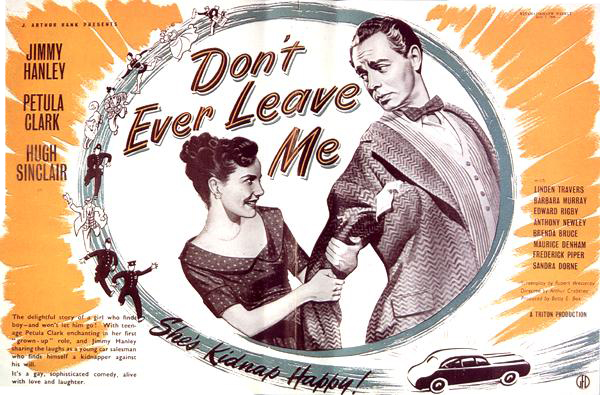
CAST:
Jimmy Hanley............
Petula Clark.............
Linden Travers...........
Hugh Sinclair............
Edward Rigby.............
Anthony Newley...........
Barbara Murray...........
Jimmy Hanley............
Petula Clark.............
Linden Travers...........
Hugh Sinclair............
Edward Rigby.............
Anthony Newley...........
Barbara Murray...........
Jack Denton
Sheila Farlaine
Mary Lemont
Michael Farlaine
Harry Denton
Anthony Newley
Barbara Murray
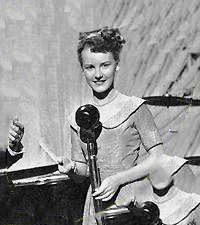
FILM NOTES:
- Filmed at Islington and Shepherds Bush Studios
- A new British song, specially written by Jack Fishman and Peter Hart--composers of "Miranda"--will be featured in Gainsborough's Don't Ever Leave Me. The song, a slow fox-trot entitled "It's Not for the Want of Trying" has a sparkling and attractive melody, whith clever lyrics to match. In Don't Ever Leave Me the song is sung by sixteen-year-old PETULA CLARK who plays the part of a girl who is kidnapped. She sings it twice: once in a dance-hall sequence, when she croons with the band, and the second-time in her bath.
PROMOTIONAL REVIEWS:
- Don't Ever Leave Me is Delightful. . .Diverting. . .Delicious Entertainment. With Petula Clark in her first 'grown up' role as the Girl who finds Boy. . .and Won't let him Go!
- Gainsborough's sophisticated comedy Don't Ever Leave Me is a happy-go-lucky story of a girl who is kidnapped--and likees it! In her first grown-up role, teenage PETULA CLARK is enchanting as ever, while JIMMY HANLEY provides a lot of laughs as the harmless young car-salesman who finds himself a kidnapper against his will. HUGH SINCLAIR, in the part of a West End actor, and LINDEN TRAVERS, as his temperamental leading lady, are both excellently cast, and veteran EDWARD RIGBY leads the supporting players with yet another fine character portrayal. A film which will delight all cinemagoers. Don't Ever Leave Me was produced by Betty E. Box and directed by Arthur Crabtree.
- Clark (now starring in Andrew Lloyd Webber's Sunset Boulevard) gives a bright, charming performance. While Hanley and Rigby are splendid in support and there's lively comedy from Anthony Newley as a potential juvenile delinquent.
DVD promotion.
- I can see quite a busy future for Petula Clark, for in this new film she has her first grown-up part, and she makes the most of it.
As Sheila Farlaine, the bored young daughter of a famous actor, she is thrilled when kidnapped, in the most unprofessional way, by an old lag named Harry Denton who wants to prove to his friends that he is not a back number.
After abducting her he gets pangs of conscience but Sheila, delighted at the adventure, insists on him taking her to his grandson Jack's flat.
Meanwhile her father is making the most of the publicity that her disappearance is bringing him.
After a few hectic days Sheila is persuaded to go home, but instead of just arriving on the doorstep she crashes in on her father's big act, much to the delight of the audience.
Her father now acknowledges that she is no longer a child and agrees that she will be his next leading lad.
Suporting Petula in this good in parts comedy, are a list of well-known actors and actresses. Edward Rigby as the reluctant kidnapper is so kind that you must like him. Hugh Sinclair as the father proves that every inch of him is an actor, while Jimmy Hanley is both convincing and charming. Brenda Bruce, Linden Travers and Barbara Murray are all equally good in their small parts.
Anthony Newley as Petula's boyfriend is a perfect pest to one and all. Watch out for the hairdresser, she really does deserve a mention.
Picturegoer - 8/20/49
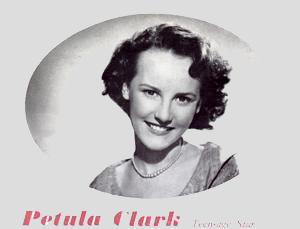
Petite blue-eyed Petula Clark, who plays her first grown-up role in Gainsborough's Don't Ever Leave Me, is already an established star in Britain--although only sixteen years old.
Talented Petula had sung in scores of broadcasts and over 500 service shows, before she was "spotted" as a potential screen actresss as long ago as 1943. After her first film role--a little Cockney girl evacuee in Medal for the General--other parts followed thick and fast, notably in I Know Where I'm Going, London Town, Vice Versa and Easy Money.
Although Pet's voice was well known to radio audiences, she had never sung on the screen until the first Huggett film was made. She sang again in Vote for Huggett and The Huggetts Abroad, and now repeats her success in Don't Ever Leave Me.
Apart from her work and music, Pet's greatest enthusiasm is riding, and she spends all her spare time at the local livery stables, having lessons in horsemanship.
Talented Petula had sung in scores of broadcasts and over 500 service shows, before she was "spotted" as a potential screen actresss as long ago as 1943. After her first film role--a little Cockney girl evacuee in Medal for the General--other parts followed thick and fast, notably in I Know Where I'm Going, London Town, Vice Versa and Easy Money.
Although Pet's voice was well known to radio audiences, she had never sung on the screen until the first Huggett film was made. She sang again in Vote for Huggett and The Huggetts Abroad, and now repeats her success in Don't Ever Leave Me.
Apart from her work and music, Pet's greatest enthusiasm is riding, and she spends all her spare time at the local livery stables, having lessons in horsemanship.
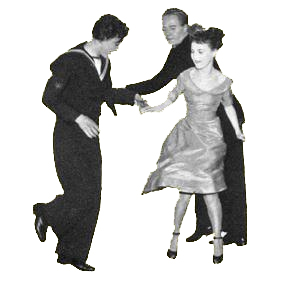
SONG AND DANCE GIRL Petula Clark sings again in Don't Ever Leave Me, this time a number that has been specially written for her entitled "It's Not for the Want of Trying." At the same time she makes her debut as a dancer--in a gay jitterbugging sequence which is one of the film's highlights.
OH! MY POOR FEET.
Sixteen-year-old PETULA CLARK, starring in Gainsborough's Don't Ever Leave Me, took part in an all-day jitterbug session during production of the film. The "dance-hall" was on Stage Three at Shepherd's Bush, and her dancing partner was JIMMY ("Hate-this-jive-stuff") HANLEY.
At the end of the day PETULA was exhausted. She explained: "I didn't mind the jitterbugging, but I had to wear high-heeled shoes--which I detest. Now my feet are killing me!"
Sixteen-year-old PETULA CLARK, starring in Gainsborough's Don't Ever Leave Me, took part in an all-day jitterbug session during production of the film. The "dance-hall" was on Stage Three at Shepherd's Bush, and her dancing partner was JIMMY ("Hate-this-jive-stuff") HANLEY.
At the end of the day PETULA was exhausted. She explained: "I didn't mind the jitterbugging, but I had to wear high-heeled shoes--which I detest. Now my feet are killing me!"
December 1949
Comedy (UK) - 86 minutes
Naughty Arlette is an spoiled, overly-sophisticated French schoolgirl who uses her feminine wiles to seduce every man gullible enough to respond to her flirtations. On a dare, she sets her cap for the art professor finally getting him to agree to run off to Paris with her. Fortunately, his daughter (Petula) orchestrates a scheme that helps him put the affair into perspective.
December 1949
Comedy (UK) - 86 minutes
Naughty Arlette is an spoiled, overly-sophisticated French schoolgirl who uses her feminine wiles to seduce every man gullible enough to respond to her flirtations. On a dare, she sets her cap for the art professor finally getting him to agree to run off to Paris with her. Fortunately, his daughter (Petula) orchestrates a scheme that helps him put the affair into perspective.
CAST:
Arlette..........Mai Zetterling
Arnold Dixon.....Hugh Williams
Helen............Margot Grahame
Julie............Petula Clark
Patricia.........Carol Marsh
Bessie...........Margaret Barton
Hedges...........Raymond Lovell
FILM NOTES:
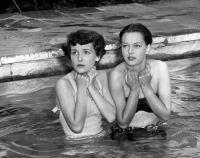 Petula and Carol Marsh
Petula and Carol Marsh
Arlette..........Mai Zetterling
Arnold Dixon.....Hugh Williams
Helen............Margot Grahame
Julie............Petula Clark
Patricia.........Carol Marsh
Bessie...........Margaret Barton
Hedges...........Raymond Lovell
FILM NOTES:
- Directed by Edmond T. Grenville
- Produced by Eric L'Epine Smith
- Based on the novel Lycee de Jeunes Filles by Serge Weber
- Pinnacle Productions
- Made at Denham Studios
 Petula and Carol Marsh
Petula and Carol Marsh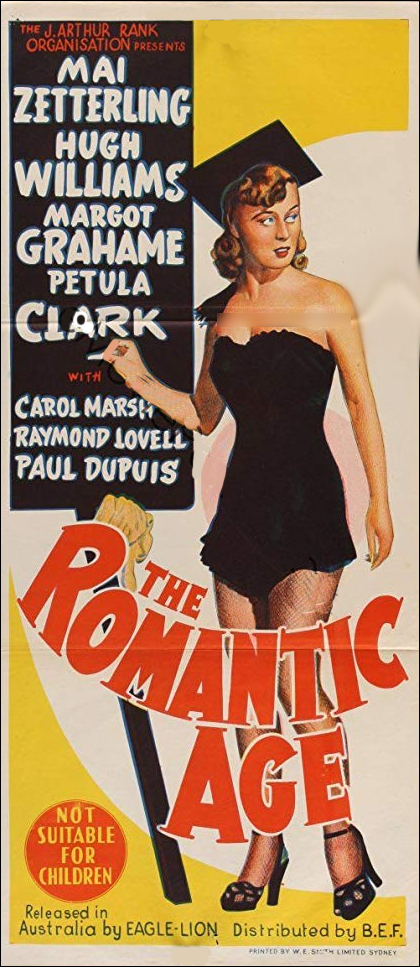
REVIEWS:
- We are not sure of the type of patron for which this rather dull story of a minx and a master was designed , for although the story has been conscientiously treated it lacks the sparkle and fun that would have widened its appeal. there is a certain amount of comedy in the earlier sequences but the more serious note of the climax throws it out of balance. There is always something a little unpleasant about scenes in which youngsters attempt to treat parents as moral delinquents and, despite the charm of Petula Clark, one remains conscious of the fact. The director does not seem altogether at ease with his subject, although he has succeeded in showing schoolgirsls as they really are--all that is except Mai Zetterling who plays Arlette, a sophisticate who accepts the presence of any man as a direct challenge. The school sequences are not without comedy appeal and the settings effective.
Mai Zetterling is too mature for the role of Arlette for her mannerisms become irritating and her attitude quite absurd. Petula Clark is much more successful as the master's charming daughter Julie for she has been given a role suited to her age and experience. Hugh Williams plays the master with the necessary mutton-headedness and Margot Grahame essays the role of the sensible wife. The schoolgirls are agreeably played by decorative maidens, and the mistresses on severe lines. Supporting players are more than equal to the demands made upon them. The musical accompaniment is undistinguished but the camerawork sound. "The Romantic Age" should amuse adolescents who may be more able to appreciate its point but it is unlikely to be equally entertaining to adults.
Today's Cinema - 29 November, 1949
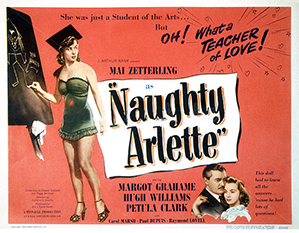 [American poster]
[American poster]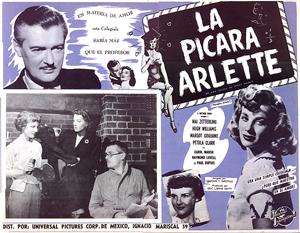 [Mexican poster]
[Mexican poster]
REVIEWS:
- Flimsy, but in parts not unamusing trifle about a teacher of English literature at a girls' finishing school who is vamped by a French pupil, who feels he has slighted her. Thing sare complicated by the fact that the teacher has a wife and a devoted daughter, who is at the school. It's very theatrical. It's the daughter who eventually sees to it that her father returns to the "straight and narrow" after his amorous adventures. Characterisation is good, but continuity rather ragged. Mai Zetterling has an unsitable role for her as a French girl and Hugh Williams is suitably stodgy as the master. His wife is well characterised by Margot Grahame and Petula Clark is charming and ingenuous as his daughter.
Picturegoer - 31 December, 1949
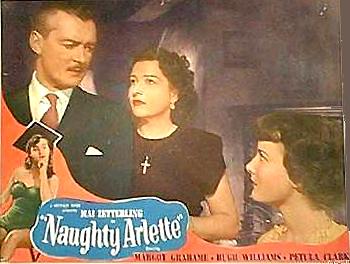 [American lobby card]
[American lobby card]
June 1950
Drama (UK) - 80 minutes
Episodic tale of four factory girls and their various romances at the local dance hall. Petula plays Georgie whose ambition it is to become a dance champion with her partner, Peter. Although the two fail to win the Greater London Amateur Dancing Championships, they do find romance with one another and the film ends with the duo becoming engaged at the climatic New Year's Eve dance.
June 1950
Drama (UK) - 80 minutes
Episodic tale of four factory girls and their various romances at the local dance hall. Petula plays Georgie whose ambition it is to become a dance champion with her partner, Peter. Although the two fail to win the Greater London Amateur Dancing Championships, they do find romance with one another and the film ends with the duo becoming engaged at the climatic New Year's Eve dance.
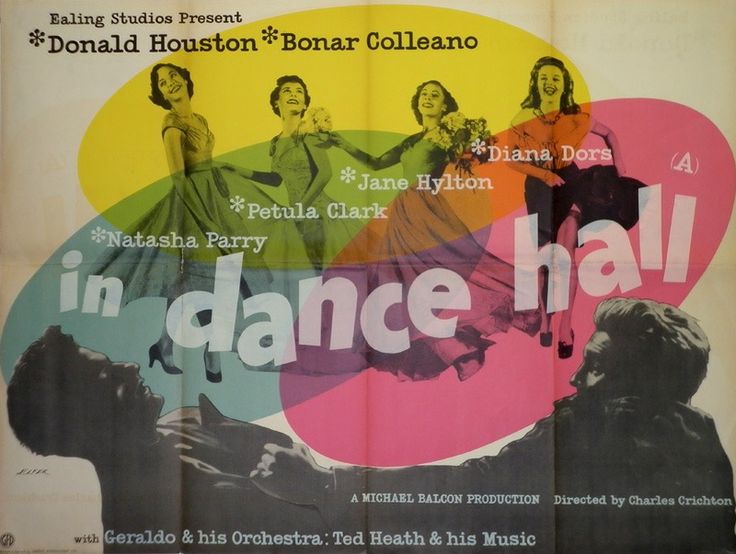
CAST:
Eve......................... Natasha Parry
Mary........................ Jane Hylton
Carole................... Diana Dors
Georgie................Petula Clark
Peter..................... Douglas Bar
Phil......................... Donald Houston
Alec........................ Bonar Colleano
Mrs Wilson........... Gladys Henson
Sydney Tafler....... Manager
Kay Kendall...........Doreen
FILM NOTES:
Eve......................... Natasha Parry
Mary........................ Jane Hylton
Carole................... Diana Dors
Georgie................Petula Clark
Peter..................... Douglas Bar
Phil......................... Donald Houston
Alec........................ Bonar Colleano
Mrs Wilson........... Gladys Henson
Sydney Tafler....... Manager
Kay Kendall...........Doreen
FILM NOTES:
- Written by E.V.H. Emmett, Alexander Mackendrick, Diana Morgan
- Directed by Charles Crichton
- Filmed: Ealing Studios, England
MISCELLANEOUS:
- 'You Haven't Lived Until You've Jived / Anyone Can Rock 'n' Roll'
In the mid-50's the world woke up to rock 'n' roll, began jiving to it, and hasn't stopped since... A great line from the film "Dance Hall"(1950) where Diana Dors and Petula Clark are jiving on the dance-floor is when the manager comes up to them and says, "Ladies! Come out of that jungle!"
1st 1950's Rock 'n' Roll, Rockabilly monthly magazine
- Petula was awarded the INSTITUTE OF DANCING BRONZE AND SILVER MEDALS for her work on the film.
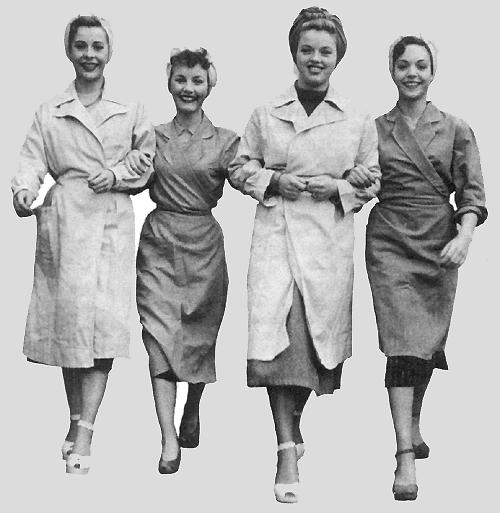
Four of Mr. Rank's Charm School Hopefuls--and you'd better believe it!
They are Jane Hylton, Petula Clark, Diana Dors and Natasha Perry;
they play factory workers who spend Saturday night at the local Dance Hall.
REVIEWS:
- Exquisitely stylish Ealing evocation of Fifties London and its dance dens. And, lumme, don't young Dors and Clark look a proper picture.
Virgin Net Movies
- Dance Hall was one of Ealing's rare attempts to get to grips with a feminine subject. Directed by Charles Crichton, the film contrasted the monotony of factory life with the glamour and excitement of the Palais, following the stories of four girls played by Diana Dors (her only Ealing appearance), Petula Clark, who had only just emerged from children's roles, Jane Hylton, who had been in It Always Rains on Sunday and Passport to Pimlico, and Natasha Parry, the future wife of Sir Peter Brook, making her film debut. The storyline is somewhat thin, and the purpose of the film is to get behind the scenes of a big dance hall and show something of the life it represents.
Natasha Parry stars as Eve, whose marriage to Phil (Donald Houston) is imperilled when she takes a different partner for an upcoming dance contest. Her reasoning is that Phil is a lousy dancer, but she loves him all the same; Phil, however, is the jealous type, who doesn't quite see things Eve's way. Although the background is reasonably authentic, with famous bands such as those of Geraldo and Ted Heath given opportunities to perform on camera, little is revealed about the girls, who are far too actressy to be taken as genuine working-class fugitives from the shop floor.
http://www.britmovie.co.uk/index.html
- Ealing Studios have once again taken the London scene and made it the backbone of an enjoyable and extremely well-made British film. The particular aspect of the London scene depicted here is a hug palais-de-danse; and it is in its picture of this vast throbbing dynamo of entertainment with its strange magnetic lure for all kinds of young people that the film is most successsful. The frenzied atmosphere of the palais, the easy=going relationships that exist withink its walls, the exceitement of the dance contest, the rather weaary indifference of the musicians--these are brought most vividly to life. The technical work is uniformly excellent and the uctting in some of the dance-hall sequences is brilliant. The story itself, though not without its effective dramatic touches, appears a trifle dim and contrived in comparison with the vitality of its background. It concerns mainly the marriage troubles of a girl who, even after her marriage, finds she cannot quite escape the lure of the palais and who, quite innocently, maintains her friendship with the immoral American who had once been her dance partner. The husband becomes unjustly jealous and threatens divorce. Two sub-plots concern the disillusion of the young girl who fails to win the dance contest but finds romance instead, and the loyalty of another girl who sacrifices her own love to bring the husband and wife together again. The role of the unhappy wife is played appealingly by Natash Perry. She, Jane Hylton, Petula Clark and Diana Dors give agreeable, unaffected performances but do not quite express the uninhibited high spirits of the factory-girls they are intended to be. Donald Houston, as the obstinate but kind-hearted husband, gives a sympathetic performance, and Bonar Colleano is impressively convincing as the ruthless, persuasive American. Minor performaces are in the best Ealing Studios tradition of liveliness and realism.
Today's Cinema - May 31, 1950
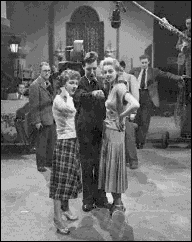
Diana Dors and Petula Clark receiving advice about the boogie-woogie scene from director Charles Crichton, 1952
(Photographer - Kurt Hutton, from The Ealing Studios Tradition)

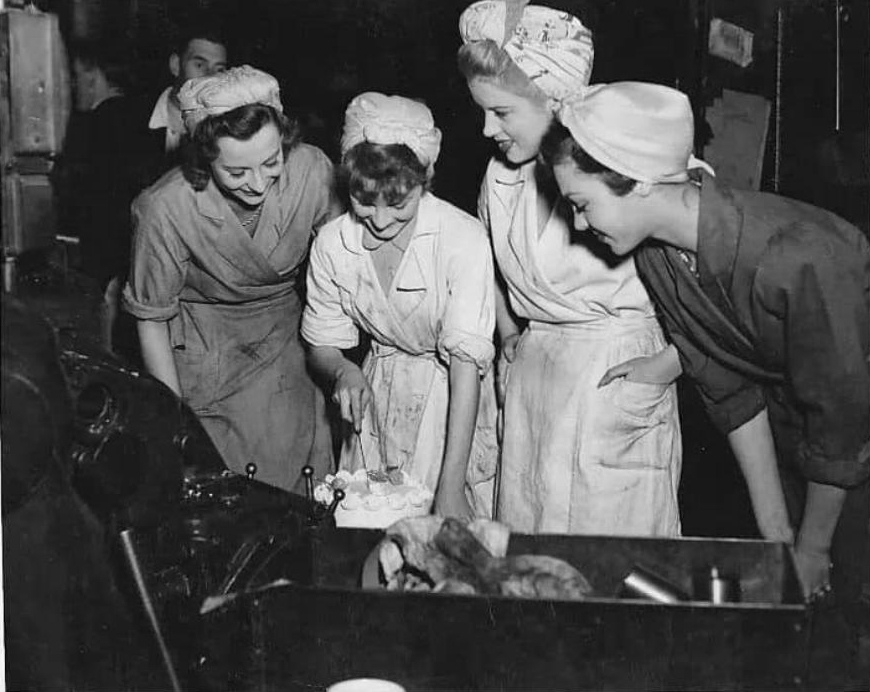
Celebrating Petula's birthday on set.
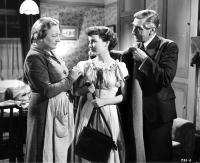
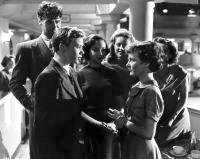
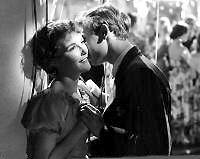

January 1951
Documentary Short (UK)
Short documentary film which features the activity taking place in London's famous "Street of Song" (Denmark Street) also known as "Tin Pan Alley." The idea of the film is to lift the veil and show cinema audiences just how a new number is created and set upon the road to success.
The song in question is "Last Night's Kisses" by Sam Brown, Ray Harley and Jimmy Kennedy. To help launch the song, stars come from far and near and are seen trying it out and discussing its possibilities.
Terry Young - The Films of Petula Clark, A Complete Guide, 1987
January 1951
Documentary Short (UK)
Short documentary film which features the activity taking place in London's famous "Street of Song" (Denmark Street) also known as "Tin Pan Alley." The idea of the film is to lift the veil and show cinema audiences just how a new number is created and set upon the road to success.
The song in question is "Last Night's Kisses" by Sam Brown, Ray Harley and Jimmy Kennedy. To help launch the song, stars come from far and near and are seen trying it out and discussing its possibilities.
Terry Young - The Films of Petula Clark, A Complete Guide, 1987
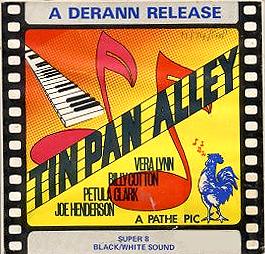
FEATURED STARS:
Petula Clark
Joe "Mr. Piano" Henderson
Vera Lynn
Billy Cotton
The Beverley Sisters
Pat Kirkwood
Geraldo
Henry Hall
The Keynotes
Billy Ternant
Eric Winstone
FILM NOTES:
Petula Clark
Joe "Mr. Piano" Henderson
Vera Lynn
Billy Cotton
The Beverley Sisters
Pat Kirkwood
Geraldo
Henry Hall
The Keynotes
Billy Ternant
Eric Winstone
FILM NOTES:
- Produced and directed by Terry Ashwood
- Pathe Pictorial
- Made on location in Denmark Street, London on December 7 & 8, 1950
1 October, 1951
Drama (UK) - 102 minutes
White Corridors was based on Yeoman Hospital, a novel by Helen Ashton. Told episodically, the story concentrates on the day-to-day activities in a busy hospital, where research pathologist Neil Marriner conducts experiments in the hopes of curing diseases impervious to penicillin. Marriner is aided in this endeavor by lady surgeon Dr. Sophie Dean, who happens to be in love with him. After a tragedy occurs for which Marriner holds himself responsible, the film builds steadily to an exciting climax involving a untested -- and potentially dangerous -- serum. The top-rank British supporting cast includes Barry Jones, Moira Lister, Petula Clark, Basil Radford, Dagmar Wynter, Bernard Lee, and, in a minor role, future "Dr. Who" Patrick Troughton.
Hal Erickson, All Movie Guide
1 October, 1951
Drama (UK) - 102 minutes
White Corridors was based on Yeoman Hospital, a novel by Helen Ashton. Told episodically, the story concentrates on the day-to-day activities in a busy hospital, where research pathologist Neil Marriner conducts experiments in the hopes of curing diseases impervious to penicillin. Marriner is aided in this endeavor by lady surgeon Dr. Sophie Dean, who happens to be in love with him. After a tragedy occurs for which Marriner holds himself responsible, the film builds steadily to an exciting climax involving a untested -- and potentially dangerous -- serum. The top-rank British supporting cast includes Barry Jones, Moira Lister, Petula Clark, Basil Radford, Dagmar Wynter, Bernard Lee, and, in a minor role, future "Dr. Who" Patrick Troughton.
Hal Erickson, All Movie Guide
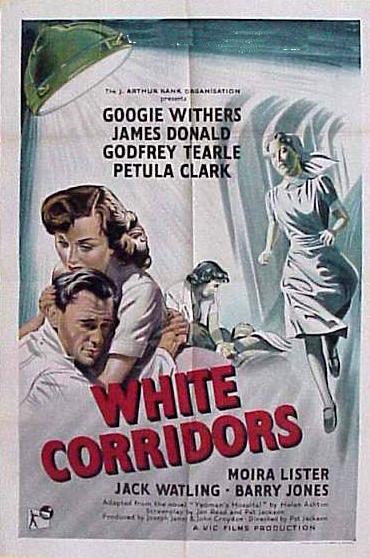
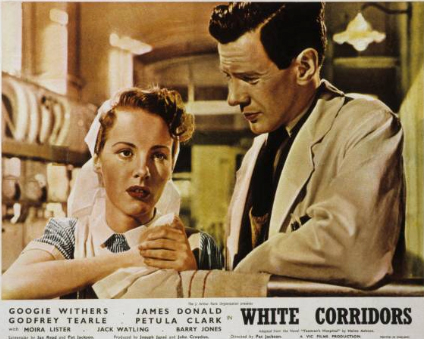
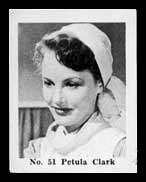
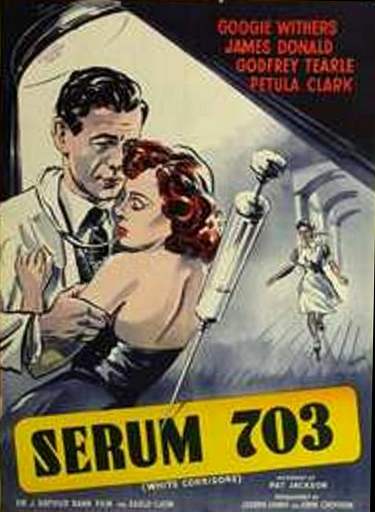
CAST:
Dr. Sophie Dean......Googie Withers
Neil Marriner........James Donald
Groom Sr............. Godfrey Teale
Joan Shepherd........ Petula Clark
Dolly Clark.......... Moira Lister
Dick Groom........... Jack Watling
Dr. Shoesmith........ Barry Jones
FILM NOTES: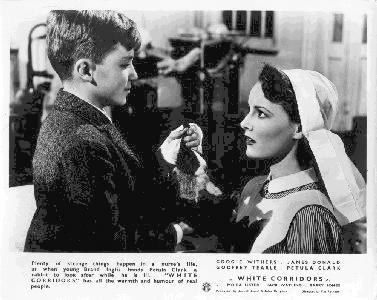
Dr. Sophie Dean......Googie Withers
Neil Marriner........James Donald
Groom Sr............. Godfrey Teale
Joan Shepherd........ Petula Clark
Dolly Clark.......... Moira Lister
Dick Groom........... Jack Watling
Dr. Shoesmith........ Barry Jones
FILM NOTES:
- Directed by Pat Jackson
- Writing credits: David E. Jackson, Pat Jackson, Jan Read
- Based on the novel Yeoman's Hospital by Helen Ashton
- Nominated for two British Film Academy Awards (BAFTA) -Best British Film of 1951 (Lost to The Lavender Hill Mob) -Best Film from any Source

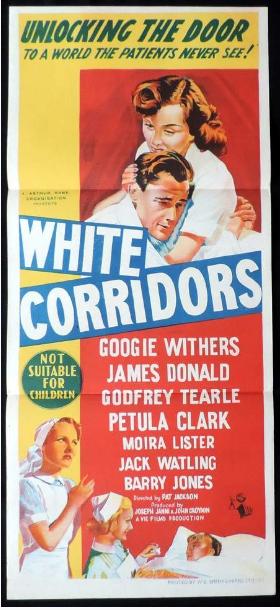
REVIEWS:
- Everything happens in hospitals, given the time. Realizing this, director Pat Jackson has built one of those "omnibus" stories around hospital life, using a camera that flits restlessly from out -patients department to pathological laboratory, from doctor's rest-room to ward kitchesn. Precious little is left out, and the result is an unusually well-constructed, sober-sided film. It contains, among other things, one of the most realistic scenes of an operation that I can remember. The picture is nothing if not expert. Jackson, who on this showing is now one of the best directors in Britian, is a man with an eye for character, a sense of line and the knowledge of how to get the smoothest performances out of his players. He gives us a restless, fascinating parade of hospital life, ward sisters, probationer nurses, amorous doctors and the like. Maybe they're all stock characters. But undoubtedly they're well played and well handled. There is a young research doctor who isolates a drug that works where penicillin fails. He nearly dies proving his own case. There is a handsome woman surgeon--extremely well played by Googie Withers--who is sufficiently in love with him to throw away a promising career in London for his sake. There is a senior surgeon, turned in like clockwork by Godfrey Tearles, whose son lets down the family standards. And there are nurses who giggle, sisters who scold, matrons who bully and porters who drink cups of tea and think about football pools. The mixture, in short, as Ealing has so often concocted it, but done more convincingly than usual. The cast is long and good. In addition to Miss Withers and Mr. Tearle, there are some very competent sketches by James Danald and Petula Clark, the last named in the most mature part she has had so far, and doing very well in it. But this is not really a players' picture. It is a piece of director's craftsmanship. Thoughtful picturegoers will watch how Jackson takes this rather static subject and gives it a feeling of urgency and movement. This result is a clever piece of work that is much more solid and satisfying entertainment than most.
Picturegoer - 16 June, 1951.
- A hospital background provides the setting for a tense, emotional drama which has been handled on adult lines. It is occasionally scrapy in its characterisations, but is basically a sincere intelligent study of surgical life. It's in the strong-meat clss of entertainment and although it may have a none-too-easy time at the box-office, it merits specialised booking in America. Pat Jackson has directed crisply and economically, confining the action entirely to hospital interiors. There is no straight-forward plot in the conventional sense; instead the script spotlights a few of the hospital characters, doctors, nurses and patients. By its very treatment, much of the characterisation is inconclusive, but the fault is a minor one and the film stands on its powerful emotional appeal. This atmosphere is heightened by sterling performances by James Donaldas the pathologist, and Googie Withers, as hospital surgeon in love with him. Godfrey Tearle gives another distinguished performance as the hospital's senior surgeon and handles with feeling a scene in which he dismisses his son for neglect of duty. Barry Jones, the chief medico, makes a wqrm,, vigorous contribution to the story, while Petula Clark, as a probationary nurse, reveals what the horrors of a surgical ward might mean to a teenager. It's left to Basil Radford as a guest artist to provide most of the few humorous touches, and to Moira Lister to fill an unrelieved role as the nurse who is discarded by a young doctor, Jack Watling. Faithful cameos come from Lyn Evans as a patientp; Megs Jenkins as the mother of the boy who dies and Brand Inglis as the kid.
Variety - 27 June, 1951
- After years of TV hospital drama — real and fictional — this Midlands-set medical tale charting the various comings and goings of doctors and patients will probably appear overfamiliar. The central plot involves a doctor (James Donald) who, perfecting a serum for treating a blood disease, infects himself — thus requiring the intervention of the doctor who loves him (Googie Withers). While it may sound like a hokey soap opera, it is actually a well-made British A-feature, realistically played by a large and excellent cast that includes a number of well-known faces, among them Petula Clark, Moira Lister, Jack Watling, Basil Radford, and, for the eagle-eyed, Patrick Troughton in a bit part. Robyn Karney - Radio Times Review

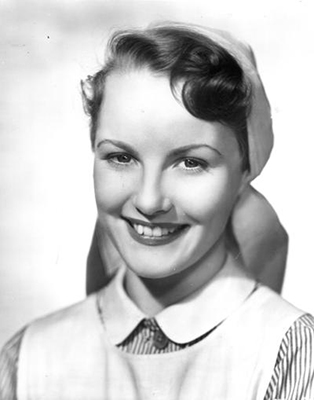

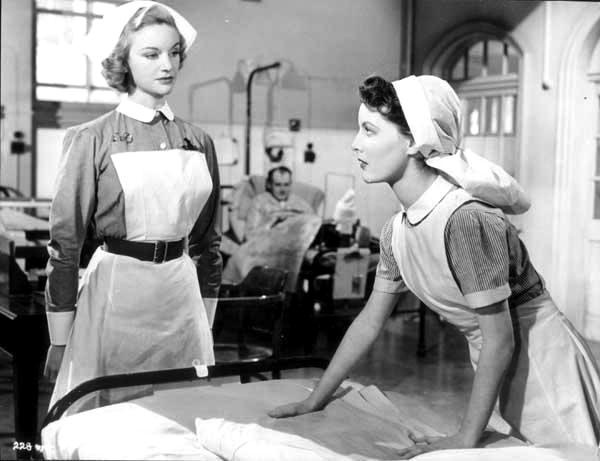
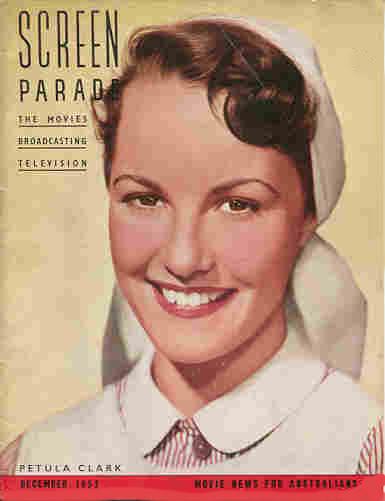
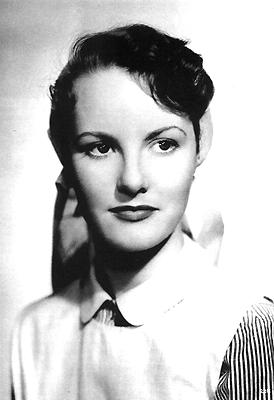
October 1951
Comedy (UK) - 83 minutes
In this comedy, a bookie wins a boutique and decides to modernize the joint by devising new, more effective programs for running it. Those who have worked in the shop for years are not pleased with the new changes, and when the bookies elaborate plans blow up in his face, they are only too pleased to go back to working for the shop's original owner.
Sandra Brennan, All Movie Guide
October 1951
Comedy (UK) - 83 minutes
In this comedy, a bookie wins a boutique and decides to modernize the joint by devising new, more effective programs for running it. Those who have worked in the shop for years are not pleased with the new changes, and when the bookies elaborate plans blow up in his face, they are only too pleased to go back to working for the shop's original owner.
Sandra Brennan, All Movie Guide
CAST:
Richard Hearne ......... Mr. Pastry
Petula Clark ........... Miss Penny
Garry Marsh ........... Mr. Trout
Richard Gale......... Lt. Edwards
Hilda Bayley........ Madame Louise
Doris Rogers............. Mrs. Trout
Charles Farrell..........Felling
FILM NOTES:
Richard Hearne ......... Mr. Pastry
Petula Clark ........... Miss Penny
Garry Marsh ........... Mr. Trout
Richard Gale......... Lt. Edwards
Hilda Bayley........ Madame Louise
Doris Rogers............. Mrs. Trout
Charles Farrell..........Felling
FILM NOTES:
- Directed by Maclean Rogers
- Writing credits: Michael Pertwee
- Based on the play by Vernon Sylvaine
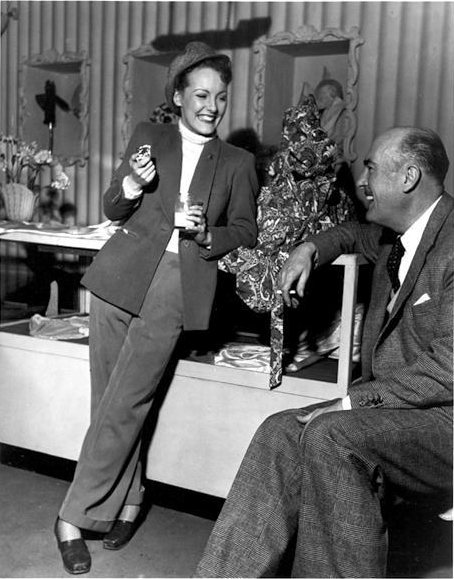
Petula and Garry Marsh on the set
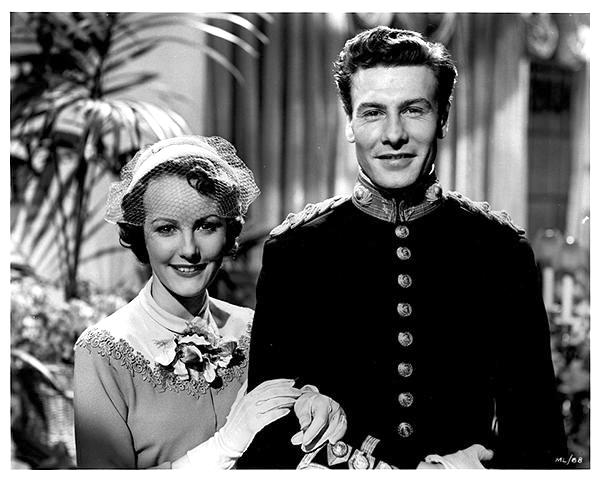
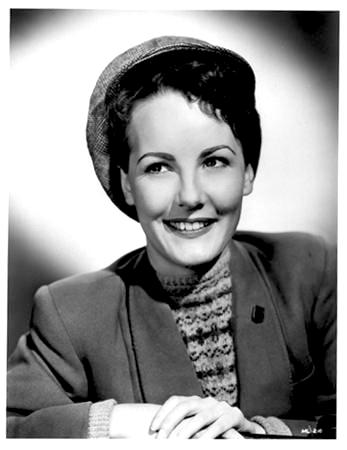
REVIEWS:
- This British comedy, modest in aim and manner but none the less enjoyable, was obviously designed to display the gifts of its star, Richard Hearne. He is a genuine comic personality and this, coupled with his delightfully energetic acrobatics, does much to enliven the film's rather familiar material. The production word, if unpretentious, is competent; and the experienced hand of Maclean Rogers has kept the action moving fast and furously. A pleasant little film successfully aimed at the vast market for unsophisticated British comedy.
Mr. Pastry is an elderly, endearingly eccentric dress designer at Madame Louise's costumier. Madame Louise has a weakness for the horses and loses her entire business to the bookmaker, Trout. The latter, a none too scrupulous member of his profession, is in trouble with a gang of racetrack racketeers and seeks refuge in his newly acquired shop. Once installed, he forces Mr. Pastry to help him in his frantic efforts to dodge both the crooks and his formidable wife. Mr. Pastry finds his work on a three-in-one dress creation outrageously interrupted by hectic encounters with the cooks and desperate interviews with the wife. Finally, he lands up on the race course as aludicrously inept bookie, where his breaches of racetrack etiquette lead to a whirlwind chase in which he uses a variety of vehicles ranging from a fairy cycle to roller-skates. In the end, Madame Louise gets her shop back and Mr. Patry's assistant Penny gets her lieutenant. Richard Hearne virtually carries the whole film, which owes all its best moments to his unflagging agility. Garry Marsh is the engaging unprincipled troubt, and Petula Clark and Richard Gale supply the romantic interest. Hida Bayley, Doris Rogers and Charles Farrell play up well in support.
Today's Cinema - 10 September, 1951
- This knockabout comedy concerns a fashionable dress shop which is taken over by a bookie who "wins" it in a bet with the proprietor. He arrives to find the establishment set in very old-fashoned ways and attempts to slicken up the shop in general and Mr. Pastry in particular. After many adventures, the shop is finally restored to its original owner. This is not a particularly good comedy even of its type; it may amuse firm Mr. Pastry fans but Petula Clark is completely wasted in a coy love affair.
Monthly Film Bulletin - September 1951
March 1952
Comedy (UK) - 91 minutes
Alec Guinness stars as Denry, a young man determined to be the master of his own destiny. After giving his exam results a slight 'lift', he climbs his way up the employment and social ladder, charming everyone as he goes. His affectionate personality soon earns him the name 'The Card' and the position of Bursley's youngest ever Mayor. His demeanour means that his love life is as full as his social calendar, but how will he resolve his personal predicaments?
March 1952
Comedy (UK) - 91 minutes
Alec Guinness stars as Denry, a young man determined to be the master of his own destiny. After giving his exam results a slight 'lift', he climbs his way up the employment and social ladder, charming everyone as he goes. His affectionate personality soon earns him the name 'The Card' and the position of Bursley's youngest ever Mayor. His demeanour means that his love life is as full as his social calendar, but how will he resolve his personal predicaments?
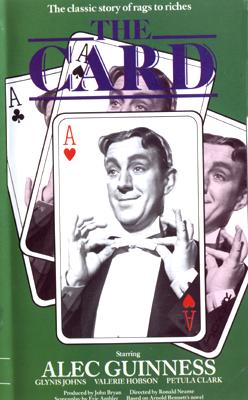
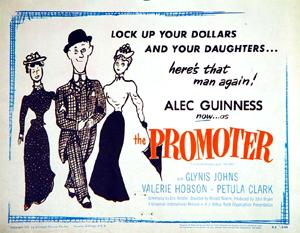
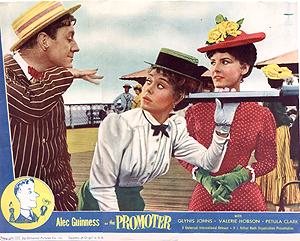
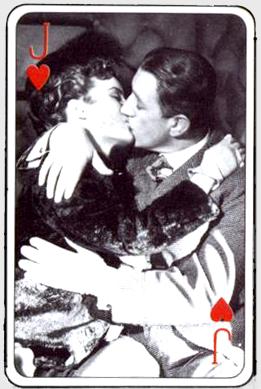
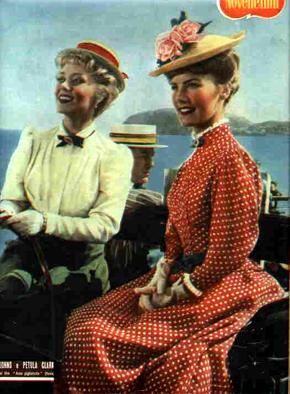

CAST:
Alec Guinness...............Edward Henry 'Denry' Machin
Glynis Johns ...............Ruth Earp
Valerie Hobson ...............Countess of Chell
Petula Clark ...............Nellie Cotterill
Edward Chapman ...............Mr. Duncalf
Veronica Turleigh ............... Mrs. Machin
George Devine............... Mr. Calvert
Joan Hickson ...............Mrs. Codleyn
Frank Pettingell ...............Police Superintendent
Gibb McLaughlin ............... Emery
FILM NOTES:
Alec Guinness...............Edward Henry 'Denry' Machin
Glynis Johns ...............Ruth Earp
Valerie Hobson ...............Countess of Chell
Petula Clark ...............Nellie Cotterill
Edward Chapman ...............Mr. Duncalf
Veronica Turleigh ............... Mrs. Machin
George Devine............... Mr. Calvert
Joan Hickson ...............Mrs. Codleyn
Frank Pettingell ...............Police Superintendent
Gibb McLaughlin ............... Emery
FILM NOTES:
- Directed by Ronald Neame
- Filmed on location in Llandundno, Wales and at Pinewood Studios, England
- Read Ronald Neame's autobiography for commentary on the making of this film.
ADDITIONAL INFORMATION:
- Nominated for Academy Award - Best Sound, Recording
PROMOTIONAL TAG LINES:
- "He's the cheekiest man in town!"
- "Lock up your dollars and your daughters! Here's that man again!"
REVIEWS:
- Yet another of Alec Guinness' clever British comedies, The Promoter (also known as The Card) is a charming story of a young man who isn't necessarily very bright but is certainly very resourceful. He climbs the economic and social ladders via unconventional, sometimes shady means -- but he's not greedy or power hungry as this may sound. He just wants to beat the odds thrust upon him by the low station in life he was born into and fulfill his dreams. And he does it smiling through his triumphs and downfalls both. But the one area where he's not so clever is regarding a certain predatory young lady, who threatens to undermine all he's accomplished.
As always, Alec Guinness is the very essence of class and sophistication yet can still be funny. This is far from his best vehicle -- there aren't so many laughs in this one as there is amusement -- but it's an entertaining film nonetheless and a fine example of the British art of subtlety.
At a Glance Film Reviews
- Charming comedy about a likable but penniless young man who sees how to get ahead in the world--and seizes his opportunity. Script by Eric Ambler from Arnold Bennett's story The Card, also its title in England.
Leonard Maltin
-
Pleasing period comedy with the star in a made-to-measure role and excellent production values.
Leslie Halliwell
- Adapted from Arnold Bennett's 1911 novel, this is a stylish, if rather empty, rags to riches story set in the author's beloved Five Towns. Eric Ambler's script is full of smart situations and witty lines, but Alec Guinness is hardly stretched as "Denry" Machin, the laundress's son who achieves wealth and social respectability through his Machiavellian machinations. There is admirable support from Glynis Johns and Valerie Hobson as the women in his life, but the film suffers from the attempt to try and cast it in the Ealing comedy mould. It's solid stuff, but too many involved seem to be marking time.
DP Radio Times Review

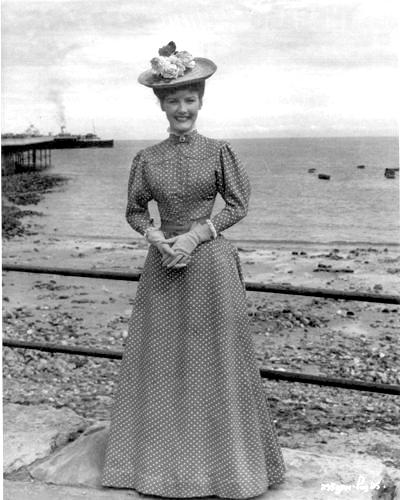

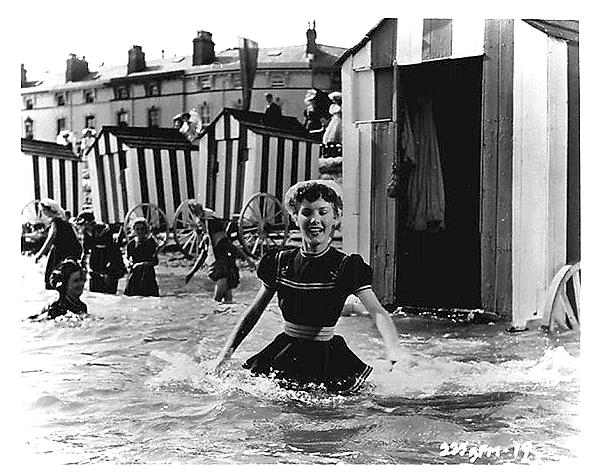
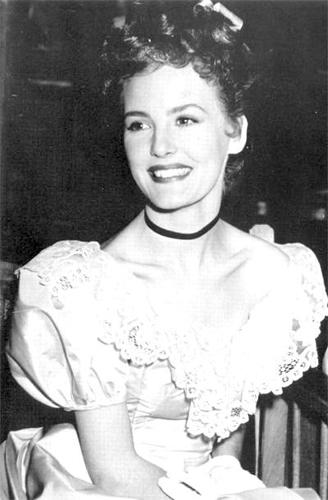
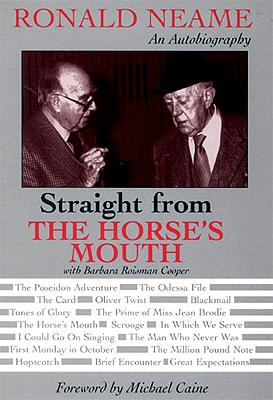
Straight from the Horse's Mouth
by director Ronald Neame
with Barbara Roisman Cooper
[-More information-]




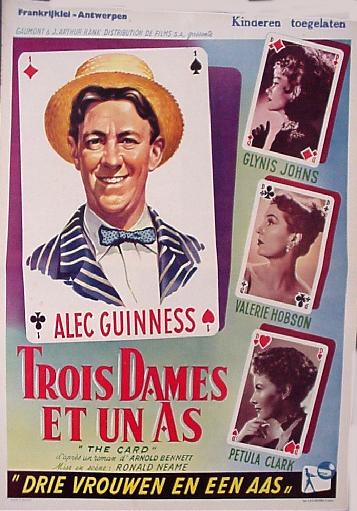
Belgian poster
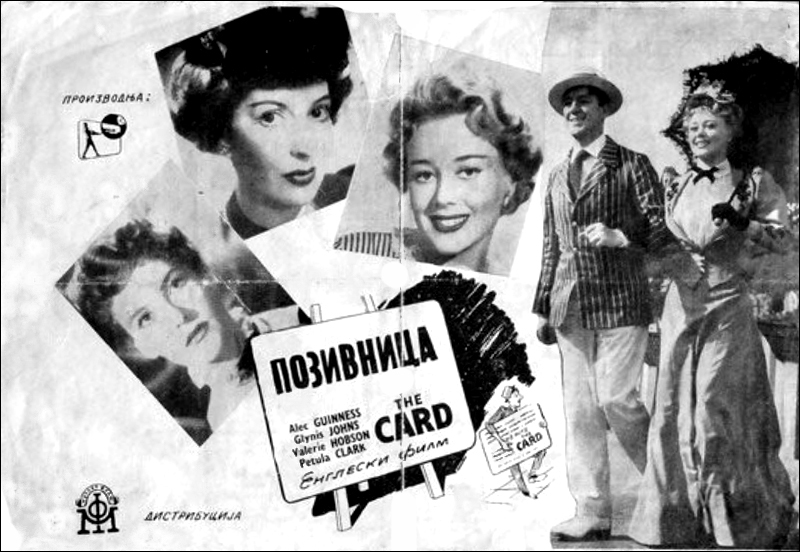
Yugoslavian lobby card
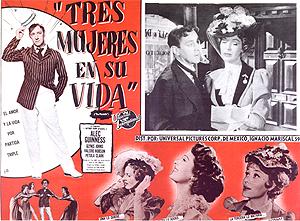
Mexican lobby card
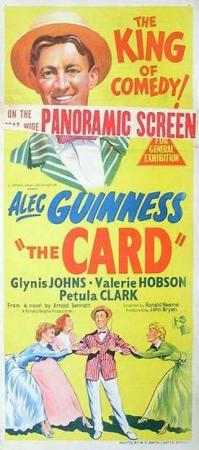
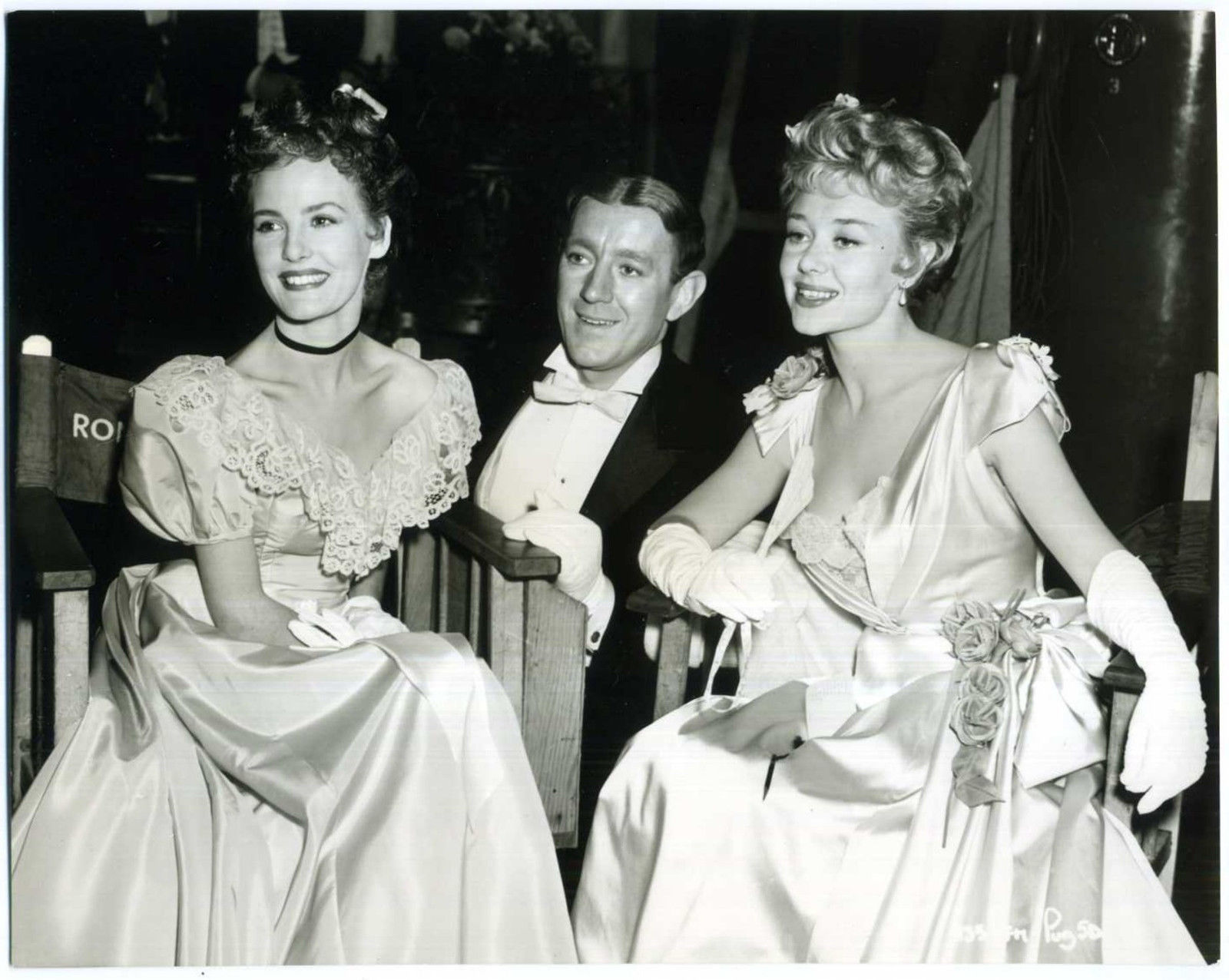
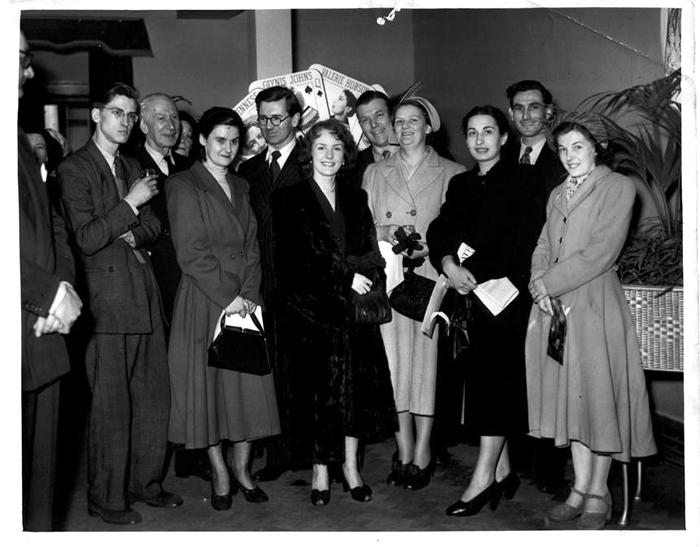
London premiere.
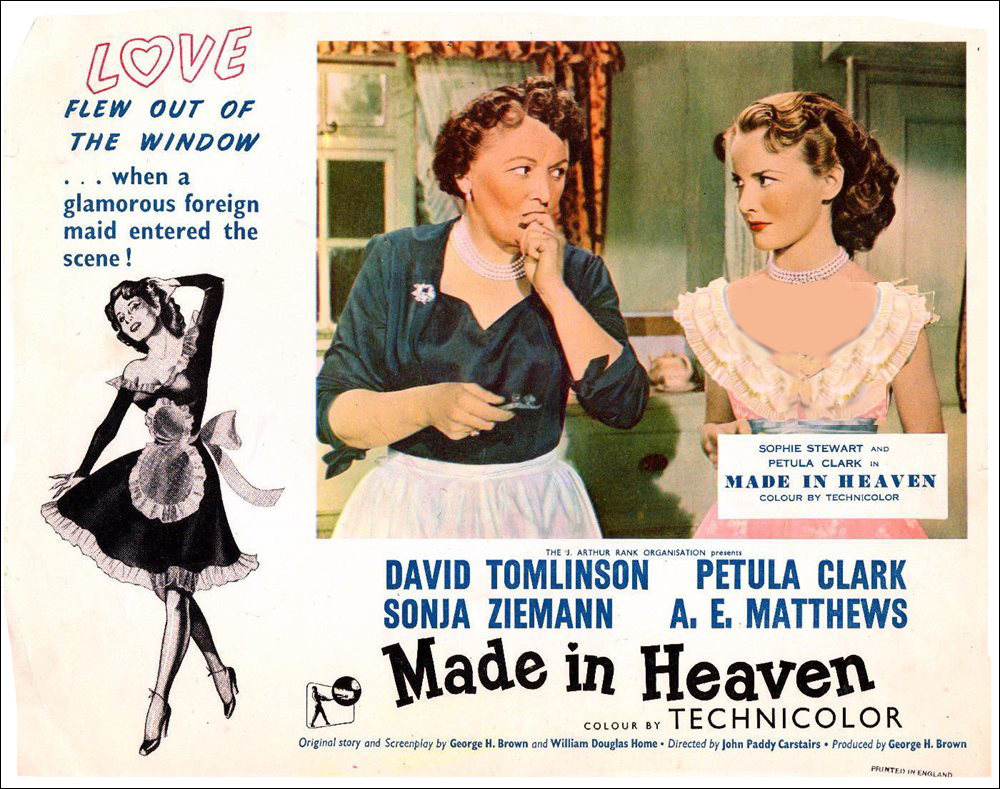
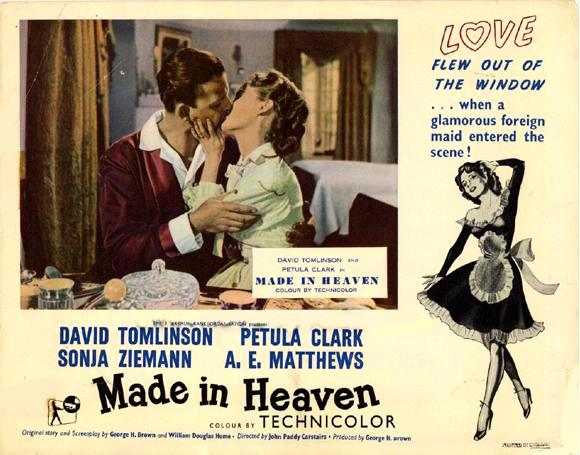
CAST:
David Tomlinson............... Basil Topham
Petula Clark............... Julie Topham
Sonja Ziemann............... Marta
A E Matthews............... Grandpa
Charles Victor............... Mr. Topham
Sophie Stewart ...............Mrs. Topham
David Tomlinson............... Basil Topham
Petula Clark............... Julie Topham
Sonja Ziemann............... Marta
A E Matthews............... Grandpa
Charles Victor............... Mr. Topham
Sophie Stewart ...............Mrs. Topham
FILM NOTES:
- Directed by John Paddy Carstairs
- Written by George H. Brown & William Douglas Home
- Another film with this title was released in 1987 starring Timothy Hutton and Kelly Gillis.
REVIEWS:
- "Made in Heaven" is predicated on one of Britain's most curious annual traditions. During the yearly Dunmow Flitch, a side of bacon is awarded to any married couple who can prove at a public trial that their union has been happy and argument-free for a full year. Among the contestants depicted herein are the members of the Topham family: husband (Charles Victor), wife (Sophie Stewart), son (David Tomlinson), daughter-in-law (Petula Clark) and grandfather (A. E. Mathews). Into this household arrives a saucy Hungarian maidservant (Sonja Ziemann), sending the menfolk into a tizzy. No surprises here, just plenty of laughs--and in Technicolor, to boot.
Hal Erickson, All Movie Guide
- Scripted by playwright William Douglas Home, this sprightly comedy was inspired by the ancient English custom of the "Dunmow Flitch", in which married couples sought to win a sizeable side of bacon by swearing on Whit Monday to an uninterrupted year of wedded bliss. However, the chances of the ideally suited Petula Clark and David Tomlinson take a dip when they employ a pouting Hungarian maid (Sonja Ziemann). Vicar Richard Wattis and his stern sister (Athene Seyler) add considerably to the fun, which is steadily directed in an amiably sitcom-like way by John Paddy Carstairs and glossily photographed by Geoffrey Unsworth.
David Parkinson Radio Times Review
- . . .when you get down to analysing the ingredients, it's just cream-puff comedy, really--and the least bit stale cream puff at that. The main thing though is not to analyse but to swallow it whole and enjoy it.
It's well-tried and not always especially true British comedy, but the film as a happy air about it. Attractively grown-up Pet Clark turns in a sparkling performance as the doubting young wife. She manages to hold her own against the devastating eyelashes and flashing, wicked smiles of Sonja Ziemann as the hired help. But it's the old hands at this kind of comedy who really carry the fun along: David Tomlinson, Charles Victor and A.E. Matthews, as son, father and grandfather respectively, all stock characters. Yes it's all gay and merry. It has a springtime spirit--and a springtime look, too in its spruce, sunny Technicolour.
Picturegoer - 6 December, 1952
February 1954
Comedy (UK) - 23 minutes
Lantern-jawed British comedian Frankie Howerd, best known to American TV fans as the star of the raucous historical satire Up Pompeii, heads the cast of The Runaway Bus. Howard plays Percy Lamb, a novice bus driver assigned to drive a coach from one London ariport to another. Alas, the city is enveloped in a thick fog, and poor Percy gets lost, along with his half-dozen passengers and a hidden cache of stolen gold. Most of the film's best moments go to Margaret Rutherford as a not-so-sweet old lady and Belinda Lee as a spy-novel addict. Petula Clark, who was already a top recording star in 1954, appears as a perky airline hostess.
Hal Erickson, All Movie Guide
February 1954
Comedy (UK) - 23 minutes
Lantern-jawed British comedian Frankie Howerd, best known to American TV fans as the star of the raucous historical satire Up Pompeii, heads the cast of The Runaway Bus. Howard plays Percy Lamb, a novice bus driver assigned to drive a coach from one London ariport to another. Alas, the city is enveloped in a thick fog, and poor Percy gets lost, along with his half-dozen passengers and a hidden cache of stolen gold. Most of the film's best moments go to Margaret Rutherford as a not-so-sweet old lady and Belinda Lee as a spy-novel addict. Petula Clark, who was already a top recording star in 1954, appears as a perky airline hostess.
Hal Erickson, All Movie Guide
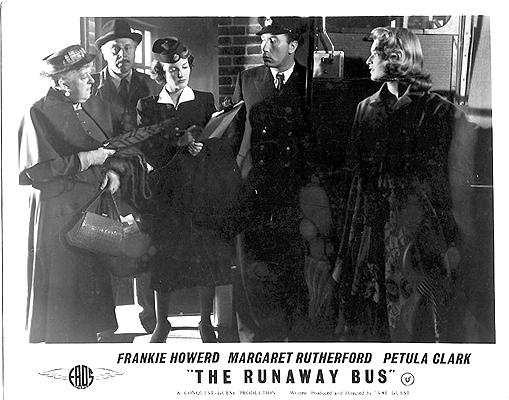

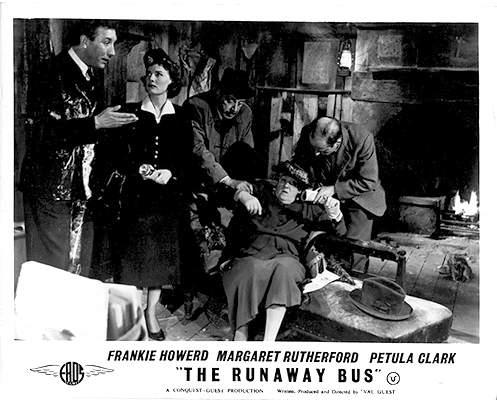
CAST:
Percy Lamb..........Frankie Howard Miss Beeston..........Margaret Rutherford Lee Nichols..........Petula Clark Shroeder..........George Coulouris Henry Waterman..........Toke Townley Peter Jones..........Terence Alexander Janie Grey..........Belinda Lee
Percy Lamb..........Frankie Howard Miss Beeston..........Margaret Rutherford Lee Nichols..........Petula Clark Shroeder..........George Coulouris Henry Waterman..........Toke Townley Peter Jones..........Terence Alexander Janie Grey..........Belinda Lee
FILM NOTES:
- Produced and directed by Val Guest
- Screenplay by Val Guest
- A Conquest-Guest Production
- Filmed at Southall Studios, UK
REVIEWS:
- Now it's Frankie Howerd's turn! And though I can't imagine this happy little nonsense causing quite such a big screen splash as Norman Wisdom's "Trouble in Store," it's still proof enough that Howerd the film comic has definitely arrived. The plot is straight homespun thrills and gags. And if at times it gets as fogbound as the weather in which the story takes place. . .well, who cares? This IS a comedy. The bus, an airway terminal bus, isn't strickly speaking a runaway--just lost in the smog. On board are the driver (Frankie Howerd) and a load of odd passengers. There's a dithery woman (Margaret Rutherford) who sounds mad but obviously isn't Thre's a smooth type (George Coulouris) who looks terribly sinister but obviously isn't. There's an air hostess (Petula Clark) who is obviously just as nice and competent as she looks. Those are the main passengers. And naturally there's an unexpected bit of merchandise in the luggage boot, stowed away by international thieves who are out to rescue it. Need I say more?
All the passengers act up to the comedy in fine style. Two surprising performances; Pet Clark's mature acting in a very routine role and Belinda Lee's ever-so-dumb dumb blond, who reads thrillers ad infinitum and is genuinely funny in the process. But, the focal point is Howerd; his screen acting is still a bit untutored. But his comic business works like a charm.
Picturegoer - 4 February, 1954
- Written and directed by Val Guest and owing much to Arnold Ridley's twice-filmed play, The Ghost Train, this comedy thriller proved the ideal debut vehicle for Frankie Howerd. Never totally at home on film, he wisely follows Bob Hope's lead in combining cowardice and wisecracks as he substitutes for the driver of an airport shuttle bus, blissfully unaware that on this foggy night he has a stash of stolen gold onboard. However, he is roundly upstaged by both that expert scene-stealer Margaret Rutherford and the under-rated Belinda Lee, whose pulp-addicted blonde has a touch of Judy Holliday about her.
DP - Radio Times Review
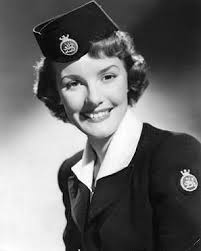
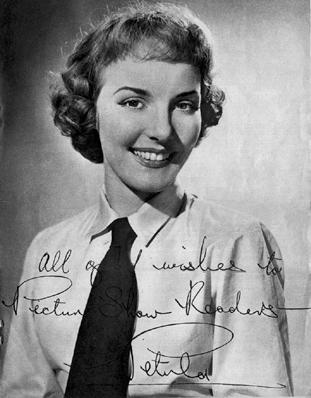
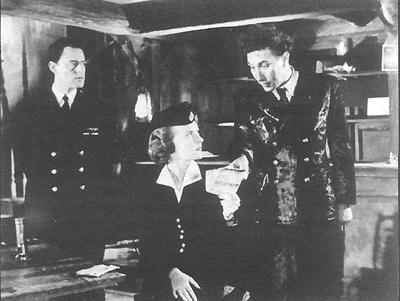
June 1954
Comedy (UK) - 87 minutes
Jim and Maggie Gay live with attractive daughter, Sally. The Gays own a greyhound, "Raving Beauty" and race him at the local dog-track. Jim works in a coal mine with his young friend Peter Nightingale, who is sweet on Sally (Petula). Sally becomes acquainted with Leslie Gowan, son of the local vicar, and a romance springs up between them. Add in a big dog race coming up at an out-of-town track where a mystery rival dog is entered, and you have it all. Romance... intrigue... a dog race... and Petula Clark singing. What more do you need!
--Richard Harries
June 1954
Comedy (UK) - 87 minutes
Jim and Maggie Gay live with attractive daughter, Sally. The Gays own a greyhound, "Raving Beauty" and race him at the local dog-track. Jim works in a coal mine with his young friend Peter Nightingale, who is sweet on Sally (Petula). Sally becomes acquainted with Leslie Gowan, son of the local vicar, and a romance springs up between them. Add in a big dog race coming up at an out-of-town track where a mystery rival dog is entered, and you have it all. Romance... intrigue... a dog race... and Petula Clark singing. What more do you need!
--Richard Harries
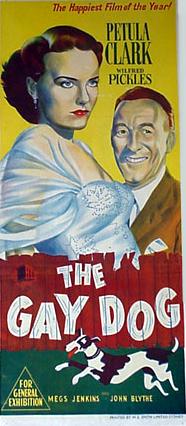
CAST:
Wilfred Pickles ...........................Jim Gay
Petula Clark.............................Sally Gray
Megs Jenkins...........................Maggie Gay
John Blythe.............................Peter Nightingale
Margaret Barton.......................Peggy Gowland
William Russell .......................Leslie Gowland
Cyril Raymond..........................Vicar
Harold Goodwin .................... Bert Gay
FILM NOTES:
Wilfred Pickles ...........................Jim Gay
Petula Clark.............................Sally Gray
Megs Jenkins...........................Maggie Gay
John Blythe.............................Peter Nightingale
Margaret Barton.......................Peggy Gowland
William Russell .......................Leslie Gowland
Cyril Raymond..........................Vicar
Harold Goodwin .................... Bert Gay
FILM NOTES:
- Black & White/Coronet Pictures, distributed by Eros
- Filmed at Southall Studios, UK
- Soundtrack - Petula sings "A Long Way to Go" which was written by Joe Henderson and Leslie Clark (Petula's father)
REVIEW EXCERPTS:
- WILFRED PICKLES repeats his stage success as Jim Gay in this delightful North Country comedy about the trials and tribulations of the owner of a racing greyhound. His comic deceptions in order to become a big-money winner form the basis of the story, whilst the winning of the heart of his pretty daughter Sally played by PETULA CLARK forms an engaging sub-plot. Able support is given by popular character actresss MEGS JENKINS, as Jim's long-suffering wife, Maggie.
Quite often stage successes lose much in their translation to the screen; not so with this film. The laughs keep coming while the staging details and atmosphere are authentic. As with many films of this period, "The Gay Dog" has proved to be a fascinating record of life in England in a time that's a bygone world. Based on the hit play by Joseph H. Colton.
Richard Harries
- The pictures tends to repeat situations and drag in a few irrelevant asides, but for all its padding, it hands out a steady flow of laughs. Wilfred Pickles lives his part as the dog-dotty Jim. Megs Jenkins is a motherly Maggie, and Petula Clark pleases and sings a catchy number as Sally. The supporting cast also includes talented favourites. Staging, detail and atmosphere are as authentic as the types and give the whole a warm and happy glow.
Kine Weekly - July 1954
- This unimaginative film version of Wilfred Pickles' stage success has gained little from the transference, apart from the use of authentic locations which give an impression of realism. Wilfred Pickles presents an interesting character study of a hard-working miner, whilst retaining his customary mannerisms. Petula Clark gives a sensitive performance.
Monthly Film Bulletin - July 1954
- Pretty Petula Clark is as fresh as ever and gives a well-ironed performance. In Russell Enouch (who later changed his name to William Russell) she has a romantic partner with good looks, modest charm and considerable ability.
Today's Cinema - June 23, 1954
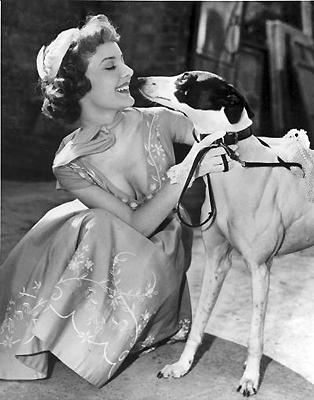
BRITISH DOLL AND DOG
Actress and singer, PETULA CLARK, makes friends with a member of the supporting cast of a forthcoming London film. "Raving Beauty" is the name of the dog, and the film is to be called "The Gay Dog."
November 1954
Romance (UK) - 78 minutes
Light, pleasantly told story of a Welsh village postman's successful and ingenious efforts to bring happiness back into the lives of an assortment of people--quarrelling newlyweds, rich and snobbish widow, bereaved wife--during their stay at a local inn, ending with one of the guests dramatically restoring use of paralyzed legs to school-master son of the inn hostess and thereby encouraging him to go ahead with marriage plans. Petula plays the part of the paralyzed man's fiancée.
Today's Cinema
November 1954
Romance (UK) - 78 minutes
Light, pleasantly told story of a Welsh village postman's successful and ingenious efforts to bring happiness back into the lives of an assortment of people--quarrelling newlyweds, rich and snobbish widow, bereaved wife--during their stay at a local inn, ending with one of the guests dramatically restoring use of paralyzed legs to school-master son of the inn hostess and thereby encouraging him to go ahead with marriage plans. Petula plays the part of the paralyzed man's fiancée.
Today's Cinema
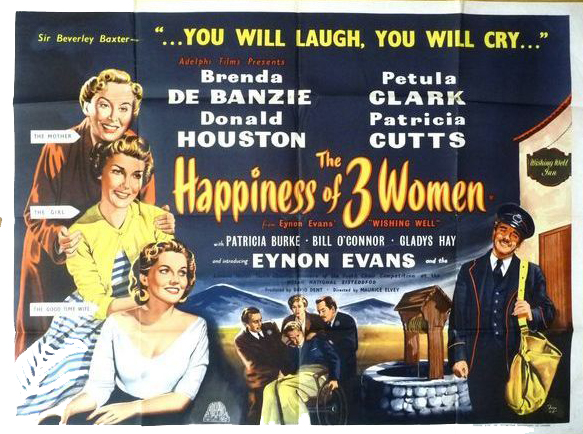
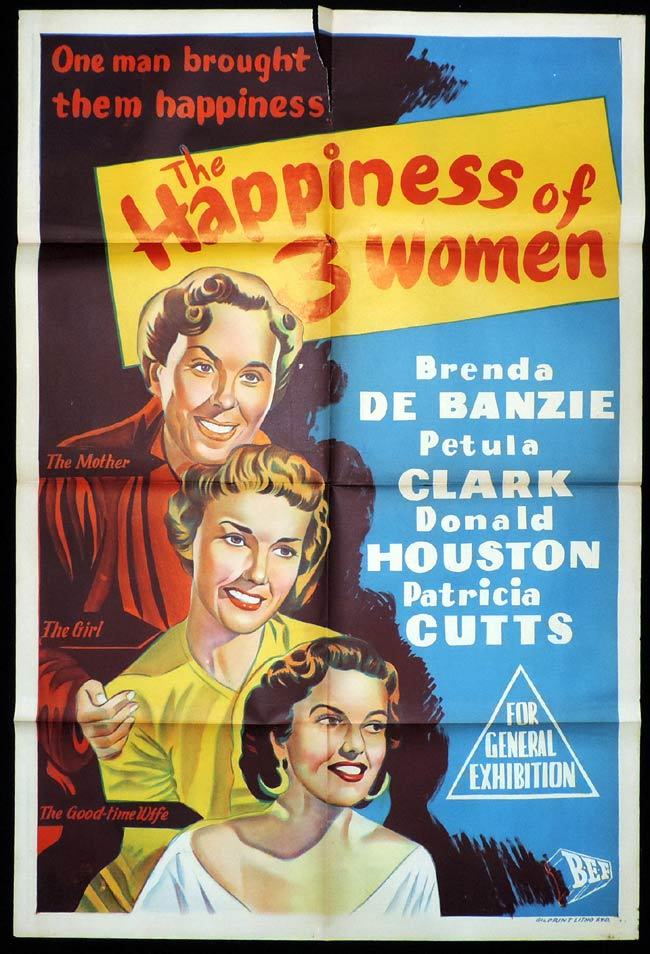
CAST:
Patricia Burke .............Ann
Petula Clark .... Delith
Patricia Cutts .... Irene
Brenda De Banzie .... Jane Price
Eyon Evans .... Amos
Jessie Evans .... Blodwen
Eira Griffiths .... Hannah
Ronnie Harries .... Ben
Donald Houston ....John
FILM NOTES:
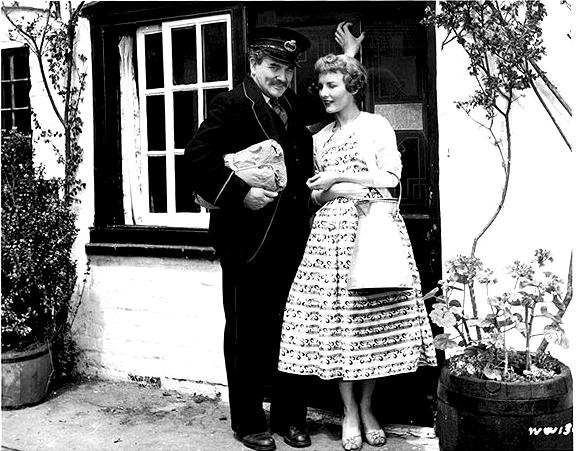

Patricia Burke .............Ann
Petula Clark .... Delith
Patricia Cutts .... Irene
Brenda De Banzie .... Jane Price
Eyon Evans .... Amos
Jessie Evans .... Blodwen
Eira Griffiths .... Hannah
Ronnie Harries .... Ben
Donald Houston ....John
FILM NOTES:
- Adapted from the play by Eyon Evans
- Written by Maury Davis & Eyon Evans
- Directed by Maurice Elvey


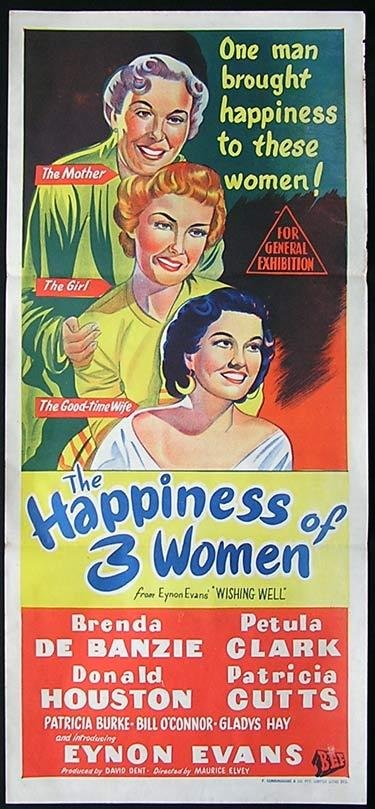
REVIEWS:
- Welcome to the screen Eyon Evans bach! This amateur Welsh actor, who wrote the play of which this is an adaptation, gives a grand performance as a postmas in a small Welsh village, who is the district's most efficient "fixer-uppper" of lost romances. He has a lot of work on his hands. There's the romance of the son of the landlady of the local pub--a crippled who is to marry a charming local girl' there's a woman guest who has lost her husband in the war and cannot be consoled; there's a young couple separated by the war in Korea; and, finally, a wealthy woman who finds happiness in hard work at the inn. Perhaps the piece is too contrived and over-sentimentalized, but it has its moments and the postman's schemes to spread happiness all round are laughable, ingenious and sometimes very near the truth.
Brenda de Banzie is delightful as the widowed innkeeper for whom the postman has a soft spot. Donald Houston, as her crippled son, enlists sympathy and Petula Clark is a winsome and transparently loving fiancée. It's all quite heartwarming and truly rural but I'd say the canvas is too overcrowded by characters who are in need both of the wishing well and the postman's knock.
Picturegoer - November 1954
- Modest direction secures sympathy for tribulations and captures something of Welsh village atmosphere. Very adequate performances from top players, with Petula Clark shining as the girl who wants to marry the invalid schoolteacher. Strong Welsh cast aids dialect problem. Effective dialogue enlivens some standard characterisation.
Although there are at times noticeable stage influences in the movement of the story, director Maurice Elvey has managed very well to suggest the possible reactions of his characters and at the same time tease out a fair ration of humour from a somewhat familiar situation. Productions values gain considerably from the choice of location and some unfussy camera work.
Petula Clark makes a fresh, unspoiled Delith anxious to proved that John, well played by Donald Houston, need not worry about being in a wheelchair. Eyon Evans as the kind-hearted postmaster gets all the fun he can from his script, materially aided by Brenda de Banzie.
Today's Cinema - November 2, 1954
- There is a pleasant Welsh atmosphere about this modest British production with a strong local cast which will prove a valuable selling factor for the home trade. It is a light prospect for the US market but should have some appeal as a dueler. The yarn has a leisurely Welsh charm, mainly derived from the homely philosophy of the village postman who believes that he can solve other people's problems. There is also the romantic side issue of the innkeeper's paralyzed son who feels that his impending marriage to a local girl is a major mistake. Brenda de Banzie, Petula Clark, Donald Houston and Patricia Cutts head the cast in competent fashion while the author makes a promising screen debut in the role of the postman. Maurice Elvey has done a straightforward job of direction. Other credits are up to standard.
Variety - November 10, 1954

January 1955
Crime(UK) - 75 minutes
The melodramatic crime caper centers on a robbery at a greyhound racetrack that results in the unintentional murder of a guard. The perpetrator leaves the loot with his girlfriend, commandeers a motorcoach bound for Southampton, and holds hostage its diverse array of passengers, including an American newspaper reporter and the girlfriend's resourceful sister.
January 1955
Crime(UK) - 75 minutes
The melodramatic crime caper centers on a robbery at a greyhound racetrack that results in the unintentional murder of a guard. The perpetrator leaves the loot with his girlfriend, commandeers a motorcoach bound for Southampton, and holds hostage its diverse array of passengers, including an American newspaper reporter and the girlfriend's resourceful sister.
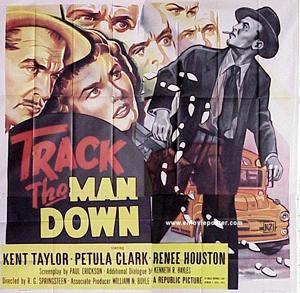
CAST:
Don Ford .....Kent Taylor
June Dennis .....Petula Clark
Pat Sherwood .....Renne Houston
Rick Lambert .....George Rose
Mary Dennis .....Ursula Howells
John Cross .....Arthur Lane
Austin C. Melford .....Walter Rilla
Ken Orwell.....Kenneth Griffiths
Ahmed Jones .....Michael Balfour
Inspector Barnet.....Lloyd Lambie
Luis Remino.....Richard Molinas
Mrs. Norman......Mary Mackenzie
Bobbie Norman......John Pike
Doctor .....Jack Lambert
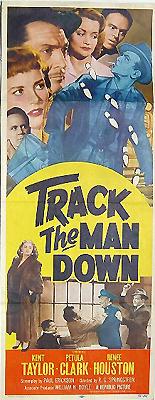
FILM NOTES:
- Screenplay by Paul Erickson and Kenneth R. Hayles
- Directed by R.G. Springsteen
- Produced by William N. Boyle
- Republic Pictures
- Made at Shepperton Studios & on location
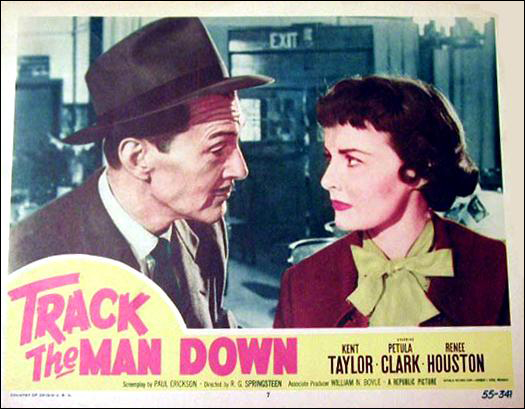

REVIEWS:
- In a raid on a dog-track, a gang which includes Rick Lambert gets away with a large sum in cash and a guard is killed trying to stop their getaway. Reporter Don Ford gets little help when he tries to get details from the police. Rick leaves the loot with Mary, his girlfriend, and tells Mary to bring it to a point on the Southampton road. Instead, Mary's sister June arrives, together with Don Ford who is trailing an actress on another story entirely. When police close in, Rick holds up the coach in which June, Don, the actress and other passengers are travelling and drives to a a boat-house in the country. Here he holds the passengers captive until Don and June contrive to get a message to the police. Meanwhile, other members of Rick's gang arrive, suspect him of double-crossing them and Rick shoots one of them. When the police arrive on the scene Rick makes a last bid for freedom but Don overpowers him.
With limited production facilities at his disposal, director R.G. Springsteen has used location settings skillfully and has concentrated on fast-pace actiion with plenty of very British comedy relief and just a dash of romance. His finished product is very satisfying if modest entertainment.
- Kent Taylor plays Don as a very American newshawk, determined and brass-necked, with Petula Clark a sweetly helpful June. Renee Houston offers a rich comedy sketch of an ageing but spirited actress and George Rose is a relaistically ruthless Rick.
Today's Cinema - 25 January 1955
- . . .The picture, made on expanding suitcase lines, introduces romance, comedy, violence, and excittement into its extravagant plot on the reasonably safe assumption that one or the other will entertain the masses. Kent Taylor, Petula Clark and Renee Houston improvise effectively and keep the action lively as Don, June and Pat and the staging is adequate. Points of Appeal: Humour, suspense and popular cast.
Kline Weekly - 27 January, 1955
- Some of the action has an unusual setting--a Southampton (England)-bound bus. World famous Victoria Station also provides some suspenseful moments. Also used for background sequences are a greyhous racing track and the banks of the Thames. Essentially, the story is of a man's lust for money and his subsequent undoing. The main criminal, Groege Rose, betrays his fiancee, Ursula Howells, double-crosses his accomplices and kissl in his unsuccessful attempt to get himself and his haul out of the country. As the screeenplay by Paul Erikson follows Rose's rather desperate trek, a diversified array of characters comes into the constantly changing pattern of emotions. Taylor enacts a nuewspaper reporter in search of a big story. How he assists the police in their search for Rose and--at the same time, falling in love with Miss Howell's sister, Petula Clark--makes up the supplementary story thread.
Motion Picture Herald - 25 February 1955
- Fragmented, silly thriller; a few unintentional laughs. Virtually the end of Petula Clark's British screen career.
British Sound Films - 1984
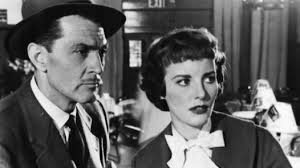
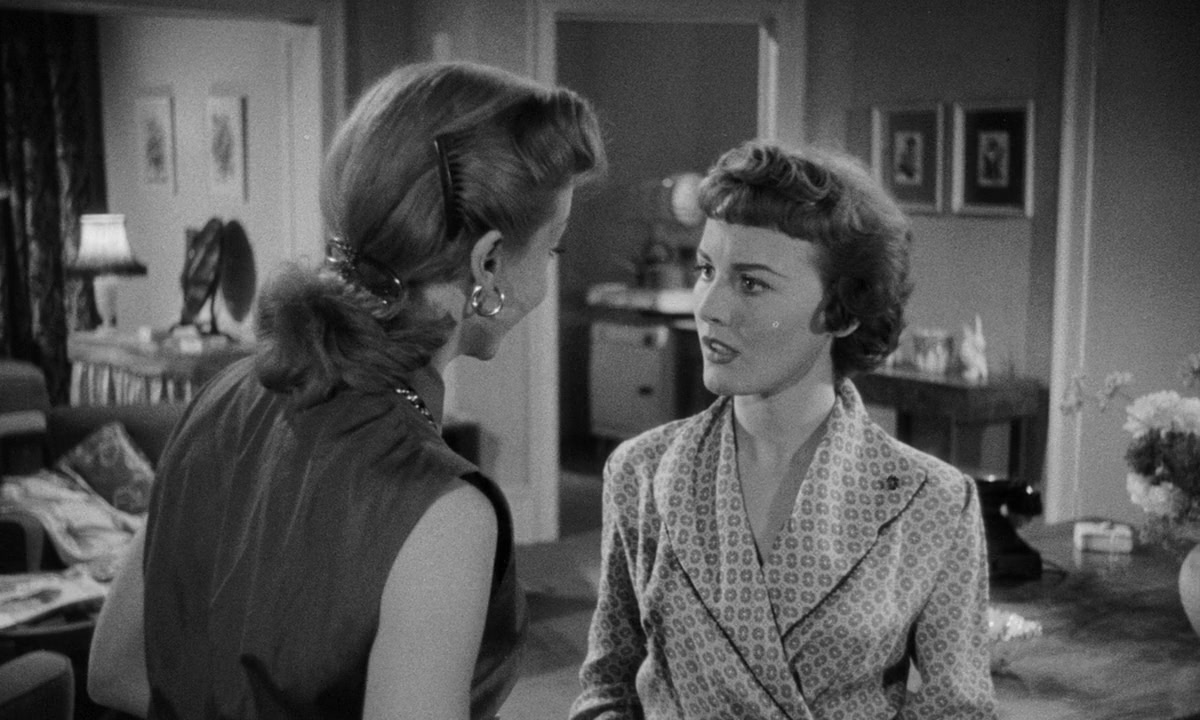
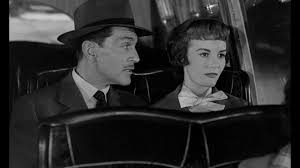
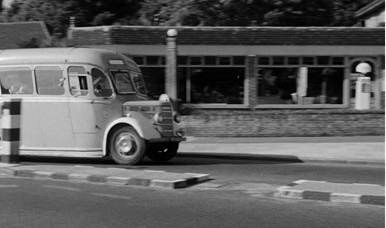
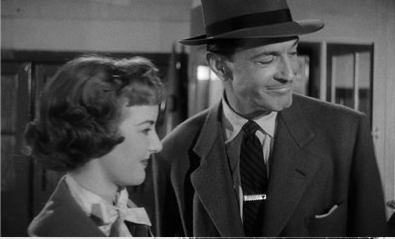
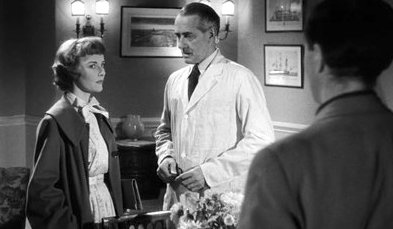
May 1957
Crime (UK) - 85 minutes
The British That Woman Opposite is better known by its American title City After Midnight. Dan O'Herlihy stars as detective Kinross, presently investigating the murder of antique dealer Sir Maurice (Wilfred Hyde-White). The principal suspects are the dead man's son Toby (Jack Watling) and Toby's American fiancée Eve (Phyllis Kirk). Digging a bit deeper, Kinross discovers that Eve's ex-husband Ned (William Franklyn) had a vested interest in a rare snuff box owned by the murder victim--and it's just possible that Eve would have been his accomplice if he he'd wanted to commit the murder. That Woman Opposite bears some resemblance to the 1962 Kim Novak-Jack Lemmon starrer The Notorious Landlady. Petula plays the victim's daughter.
Hal Erickson, All Movie Guide
May 1957
Crime (UK) - 85 minutes
The British That Woman Opposite is better known by its American title City After Midnight. Dan O'Herlihy stars as detective Kinross, presently investigating the murder of antique dealer Sir Maurice (Wilfred Hyde-White). The principal suspects are the dead man's son Toby (Jack Watling) and Toby's American fiancée Eve (Phyllis Kirk). Digging a bit deeper, Kinross discovers that Eve's ex-husband Ned (William Franklyn) had a vested interest in a rare snuff box owned by the murder victim--and it's just possible that Eve would have been his accomplice if he he'd wanted to commit the murder. That Woman Opposite bears some resemblance to the 1962 Kim Novak-Jack Lemmon starrer The Notorious Landlady. Petula plays the victim's daughter.
Hal Erickson, All Movie Guide
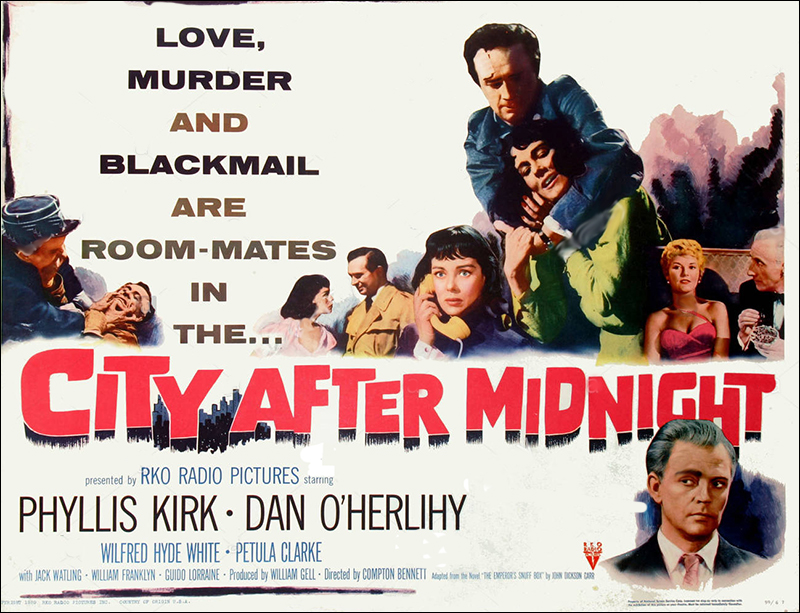
CAST:
Eve.................Phyllis Kirk
Kinross.............Dan O'Herlihy
Sir Maurice.........Wilfrid Hyde White
Janice Lawes........Petula Clark
Toby Lawes.......... Jack Watling
Ned................. William Franklyn
Lady Lawes.......... Margaret Withers
Eve.................Phyllis Kirk
Kinross.............Dan O'Herlihy
Sir Maurice.........Wilfrid Hyde White
Janice Lawes........Petula Clark
Toby Lawes.......... Jack Watling
Ned................. William Franklyn
Lady Lawes.......... Margaret Withers
FILM NOTES:
- Directed by Compton Bennett
- A Monarch-British Lion Production
- Screenplay by Compton Bennett
- Based on the novel The Emperor's Snuffbox by John Dickson Carr.
- NOTE: All of the CITY AFTER MIDNIGHT press misspells her last name as Clarke.
PROMOTIONAL REVIEW:
- "That Woman Opposite" is an engrossing tale of murder in a French villa. It was adapted to the screen from a book by thriller writer John Dickson Car, titled "The Emperior's Snuff-Box" and all lovers of sound detective fiction will want to see this brilliant example of the author at his best.
The atmosphere of the film's setting, a quiet town on the coast of France has been effectively captured and the action of the plot is briskly paced. Suspense builds nicely to a neat climax.
- At last, a British thriller with class. Not just because it boasts two better than average Hollywood stars, but because here's a gloss that usually comes with an import label. Danh O'Herlihy is the insurance sleuth untangling a murder web in a sleepy off-season French resort. A benevolent antique collector is killed. Whodunnit? Surely not one of the blueblood English family? Surely not the nice American widow across the road? But they're not what they seem, you soon discover. From a rambling plot, Compton Bennett has tightly scripted a lightweight but suspenseful thriller.
O'Herlihy and Phyllis Kirk, as the widow, are a satin smooth twosome and scoring heavily for the home team are Wilfrid Hyde White, as the collector; Petula Clark and Jack Watling as his daughter and son.
Picturegoer - June 1957
- Don't expect too much of this modest film, based on John Dickson Carr's thriller The Emperor's Snuffbox, and you'll be agreeably entertained by an efficiently directed work graced by many recognisable faces. The setting is a small French town where an English antique dealer is found murdered. An inconsequential plot of intrigue and romance follows, as a private detective (Dan O`Herlihy) attempts to solve the mystery. American actress Phyllis Kirk was imported to play the romantic lead, although Petula Clark, William Franklin and Wilfred Hyde White will be more familiar to British audiences.
BB - Radio Times Review
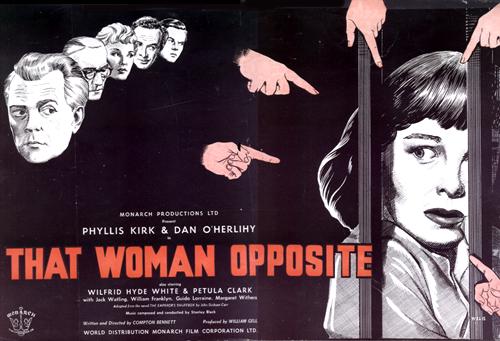
British poster

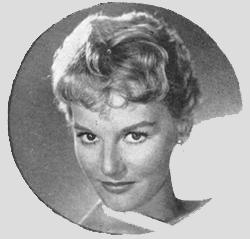
MEET THE NEW MISS CLARK
"I have difficulty in persuading people to forget the old Petula Clark and accept the new Me," said the blonde vivacious Petula Clark who is on of the stars of the British film "That Woman Opposite."
Pet is willing to push overboard her song and dance routine to do some real acting. She was not getting the parts she wanted to play when she appeared in pictures for Mr. J. Arthur Rank and she turned down a chance to play opposite Norman Wisdom in his first film "Trouble in Store" because she did not want to be a stooge. That let her out to angle for the parts she had set her heart on. In "That Woman Opposite" in which she is starred with Phyllis Kirk, Dan O'Herlihy and Wilfred Hyde White, she plays a straight dramatic role as the distraught young daughter of a wealthy collector of antiques who is murdered.
"I have difficulty in persuading people to forget the old Petula Clark and accept the new Me," said the blonde vivacious Petula Clark who is on of the stars of the British film "That Woman Opposite."
Pet is willing to push overboard her song and dance routine to do some real acting. She was not getting the parts she wanted to play when she appeared in pictures for Mr. J. Arthur Rank and she turned down a chance to play opposite Norman Wisdom in his first film "Trouble in Store" because she did not want to be a stooge. That let her out to angle for the parts she had set her heart on. In "That Woman Opposite" in which she is starred with Phyllis Kirk, Dan O'Herlihy and Wilfred Hyde White, she plays a straight dramatic role as the distraught young daughter of a wealthy collector of antiques who is murdered.

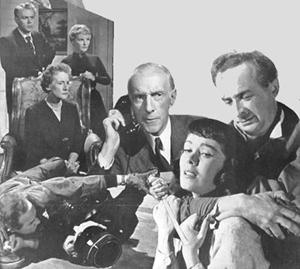
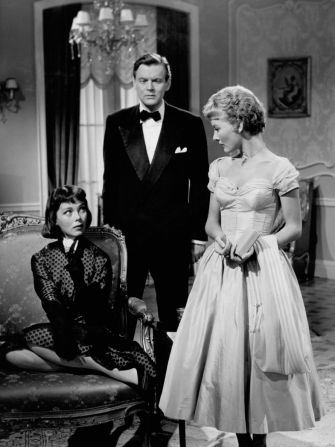

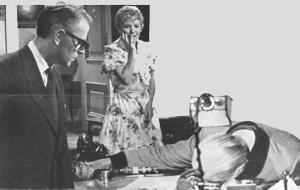

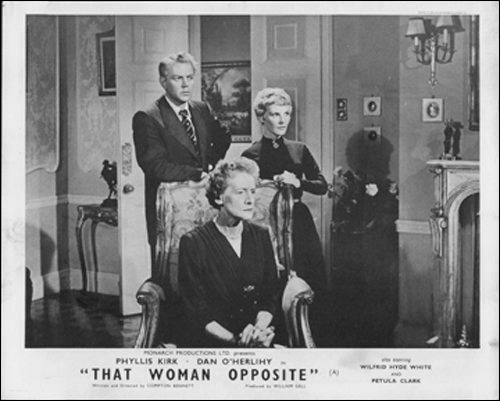
March 1958
Musical (UK) - 85 minutes
Hoping to be "discovered, two teenage girls travel to London by train to attend a broadcast of a pop TV series. En route, the two are entertained by various 1950s pop entertainers scheduled to appear in the show. Petula appears only briefly working on her latest recording, "Baby Lover."
March 1958
Musical (UK) - 85 minutes
Hoping to be "discovered, two teenage girls travel to London by train to attend a broadcast of a pop TV series. En route, the two are entertained by various 1950s pop entertainers scheduled to appear in the show. Petula appears only briefly working on her latest recording, "Baby Lover."
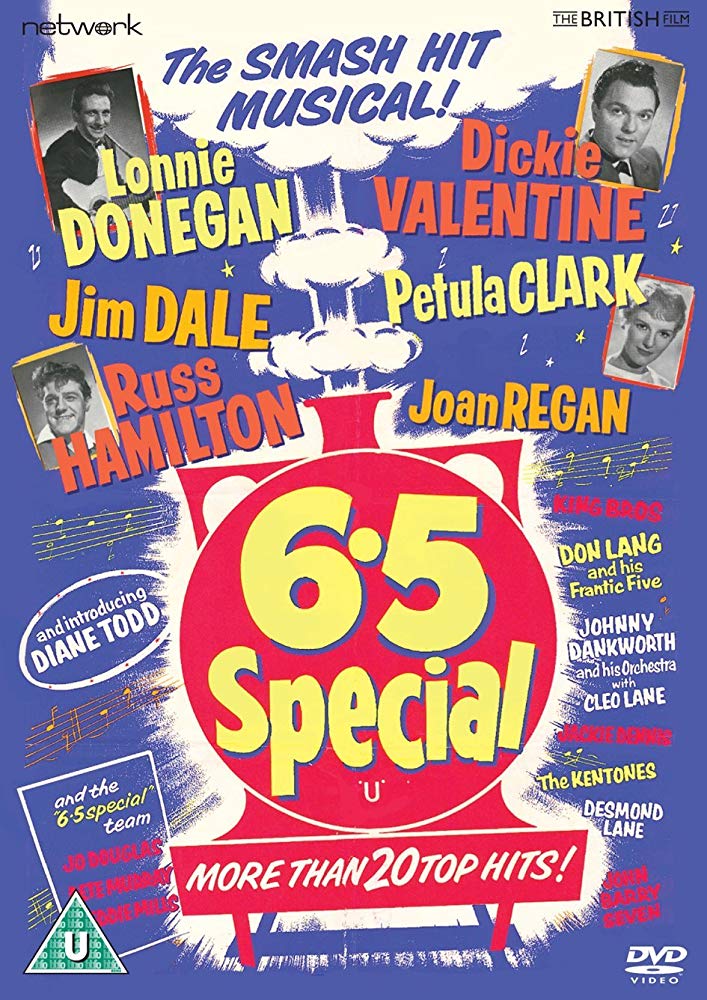
CAST:
Diane Todd .....Ann
Avril Lesley .....Judy
GUEST STARS: [Train sequence]
Petula Clark
Finlay Currie
Jim Dale
John Dankworth
Jackie Dennis
Lonnie Donegan
Josephine Douglas
Russ Hamilton
Cleo Laine
Desmond Lane
Don Lang
Jimmy Lloyd
Leigh Madison
Freddie Mills
Peter Murray
Joan Regan
John Barry Seven
Victor Soverall
Paddy Stone
Dickie Valentine
Bernie Winters
Mike Winters
FILM NOTES:
Diane Todd .....Ann
Avril Lesley .....Judy
GUEST STARS: [Train sequence]
Petula Clark
Finlay Currie
Jim Dale
John Dankworth
Jackie Dennis
Lonnie Donegan
Josephine Douglas
Russ Hamilton
Cleo Laine
Desmond Lane
Don Lang
Jimmy Lloyd
Leigh Madison
Freddie Mills
Peter Murray
Joan Regan
John Barry Seven
Victor Soverall
Paddy Stone
Dickie Valentine
Bernie Winters
Mike Winters
FILM NOTES:
- Directed by Alfred Shaughnessy
- Produced by Herbert Smith
- An Anglo-Amalgamated Production
- Reissued in 1962 as Calling All Cats and shortened to 58 minutes.
REVIEWS:
- Ann, a comely provincial wench with a lovely voice, wants to break into show business but lacks drive. Her chum, Judy, has plenty and at her instigation they take a trip to London to try their luck. They board the 6.5 train and learn that it is full of popular artists. They meet Jim Dale, Desmond Lane, Johnny Dankworth, Mike and Bernie Winters, Joan Regan, Petula Clark, the Kentones, Victor Soverall and Jimmy Lloyd. Jo Douglas and Pete Murray, comperes of the 6.5 Special TV programme, are also travelling and they agree to audition Ann. At first Ann is reluctant to push herself, but Finlay Currie, the famouse character actor gives her confidence. Ann impresses Jo and Pete and they engage her for the 6.5 Special. Lonnie Donegan, Dickie Valentine, Russ Hamilton, Don Lang, the King Brothers, The John Barry Seven and Jackie Dennis, too, appear. Afterwards, Dickie Valentine, the teenagers' heart throb, congratulates Ann, and Jo and Pete promise her a solo spot in the next edition.
The picture gets off to a flyer and neatly dovetailed shots of the train thundering towards London sustains the illusion of speed. Diane Todd is completely unaffected and sings sweetly as Ann and Avril Leslie proves a perfect foil as the cute Judy. The two make the most of the lively, if slight, tale, and convincingly express wonderment every time they rub shoulders with a star. Dickie Valentine lets himself go at the finish and endorses the audiences sentiments when he applauds Ann. The film offers the cinema a great chance to regain some of the fans it has lost to TV.
Kline Weekly - 13 March, 1958
- . . .Films of this kind usually entail endless plot, reluctantly interupted by brief appearancew from the advertised recording stars. In this case, a shrewd producer has dispensed almost entirely with a story, realising that an almost continuous flow of numbers by current favourites is likely to be sufficient attraction for "pop" music fans. The numbers are unfussily presented, in settings which are economical without looking unduly cheap. The stars of long experience shine like beacons amongst some alarmingly "over-night" rock and roll successes.
Monthly Film Bulletin - March 1958
- The film starts off rather quaint and curious but builds to a level of breathless insanity much more bizarre than anything Monty Python ever dreamed of doing. Based on the British TV counterpart to our "American Bandstand" and a forerunner to "Ready, Steady, Go!" and "Go Go Beat," THE SIX-FIVE SPECIAL spends its first half on a rocking train ride--there's a star in every compartment waiting to beat out a forgotten hit, including Petula Clark and Jim Dale (who does the most demented rendition of "Train Kept a Rollin" you'll ever witness). Even the black kitchen boys sing shell-shocked showstoppers while washing the dishes. Finally all this leads up to the big broadcast of the Six-Five Special, a virtual "Shindig" in Hell with dizzying dance numbers and an endless parade of stars. I could babble on forever--this is indeed Babylon, British Style
Johnny Legend - Something Weird Videos

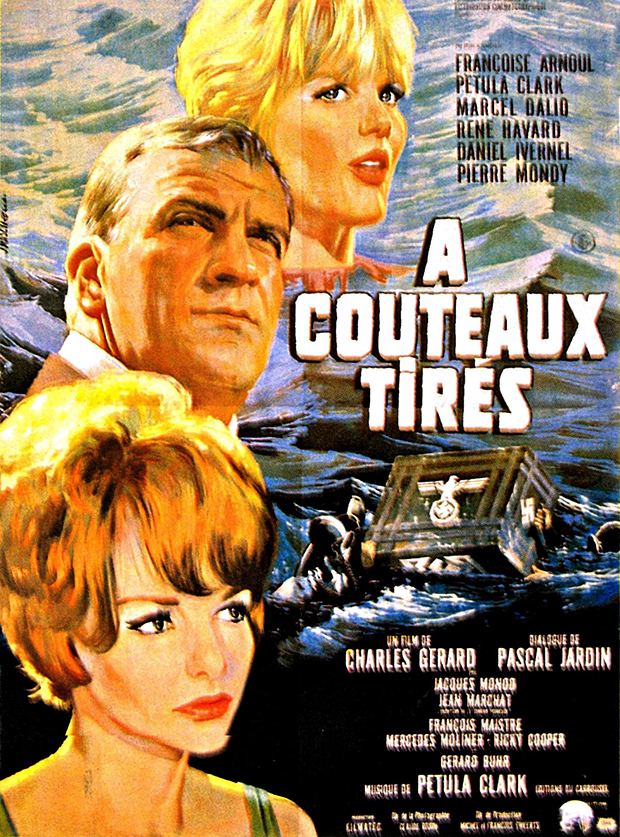
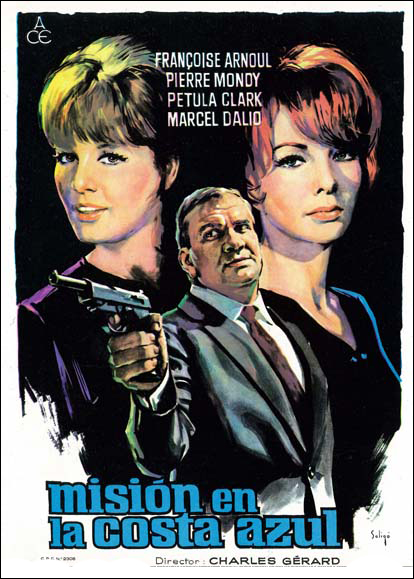
CAST:
Françoise Arnoul ...... Lucy
Petula Clark ......Petula
Pierre Monday .......Robert Antonini
Marcel Dalio ......Von Gregor
Daniel Ivernel ...... Jean Mattei
Françoise Arnoul ...... Lucy
Petula Clark ......Petula
Pierre Monday .......Robert Antonini
Marcel Dalio ......Von Gregor
Daniel Ivernel ...... Jean Mattei
FILM NOTES:
- Written by: Charles Gérard & Pascal Jardin
- Directed by: Charles Gérard
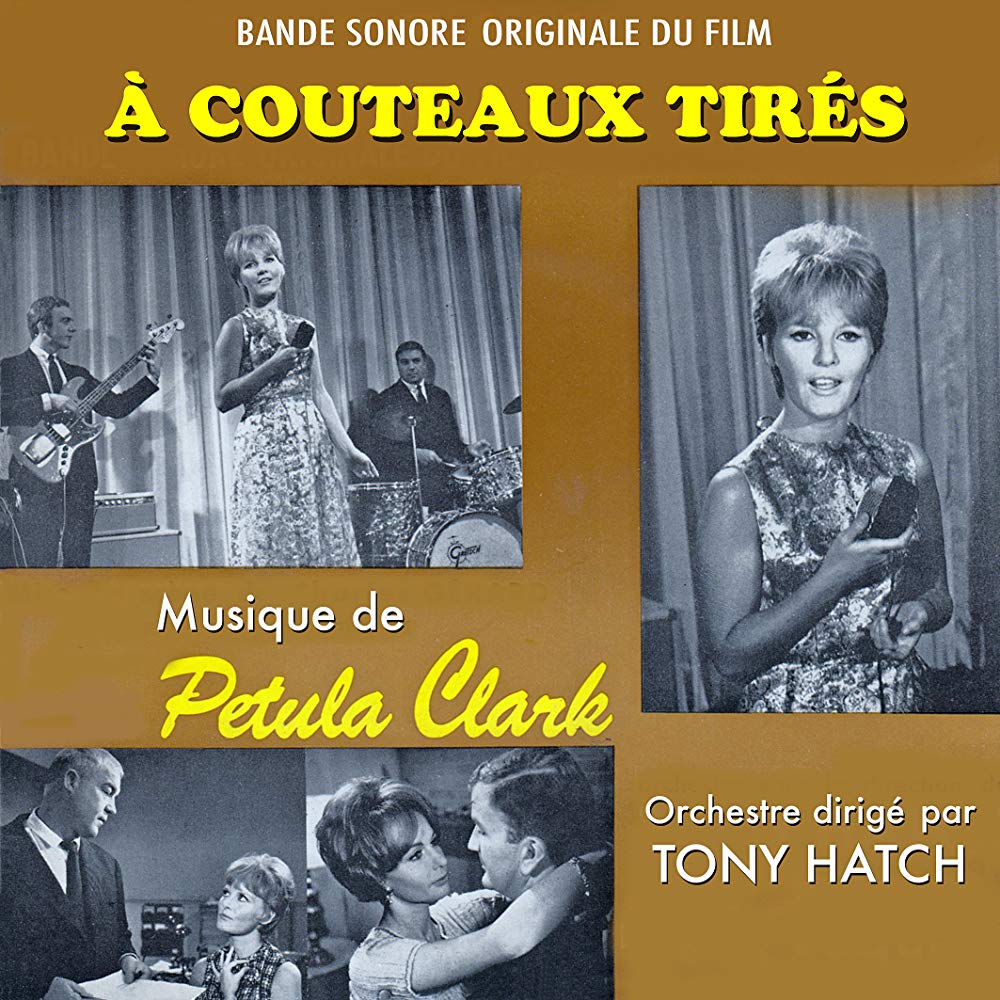
SONGS PERFORMED
-
Prends Garde a Toi
(Petula Clark/Georges Aber)
Il N'a Chante Qu'un Soir
(Petula Clark/Pierre Delanoe)
REVIEWS:
- ...Director Gérard has obviously seen a lot of American gangster movies and he brings off several favourite moments quite nicely: the casual murder in a railway sleeping compartment, the machine-gunning in a quiet cafe, or the man in a darkened room pointing a menacing revolver who turns out to be dead. That however, is about as far as the film goes. The acting is sound throughout, but the characterization is strictly two-dimensional, motivations are never very clear and the plot rambles all over the place (allowing Petula Clark, for instance, to appear for no good reason other than to sing a couple of songs.)
Monthly Film Bulletin, September 1964
- Crime and murder adventure, involving the double double-crossing that goes on when an international crook syndicate recovers a Nazi horde of diamonds...
In their determination not to give away the identity of the real villains, the film-makers have gone to the other extreme of mystery and made the tortuous plot difficult to follow. However, all is made pretty plain in the end and the incidental slaughter that leads to the exciting climax has the bite of authenticity. The acting of the men in the cast is of a uniformly tough nature, which makes it an extra pleasure to see and hear Petula Clark, as herself, singing a couple of songs, otherwise the notable members of the cast are Pierre Mondy as Robert, Daniel Ivernal as the policeman; and Francoise Arnoul as Robert's wife.
Kline Weekly - September 24, 1964
- ...The plot--about an international crime on a massive scale--isn't as novel as it thinks it is. Like "Rififi", it depends a great deal on the characters and twisted relationships involved. But either the cutting ofr the original script have destroyed part of the human interest. However, the acting makes good some of the loss and the action's gripping, if not always comprehensible. There is, too, a modest guest appearance from Petula Clark playing herself (i.e. one of the new pop idols of Paris) and singing a couple of piquant French songs. Marcel Dalio and Pierre Mondy are excellent as the most influencial members of the gang. Daniel Ivernal is a serviceable and dedicated cop, while Francois Arnoul is attractive as the wife who can't save her crooked husband from the penalty of breaking the law. The always saleable theme and Pet Clark's name on the credits should bring in the customers.
Daily Cinema - September 18, 1964
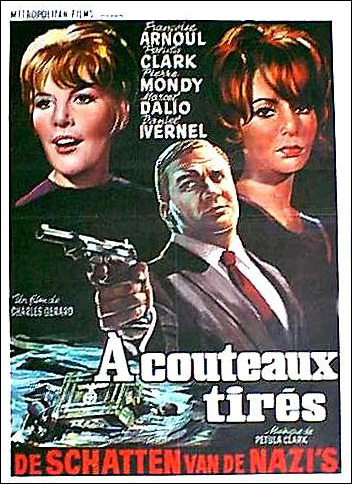
German poster
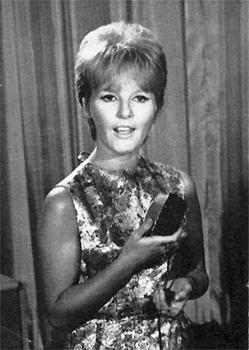

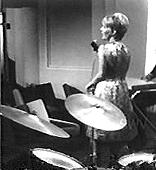
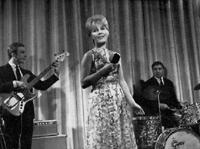
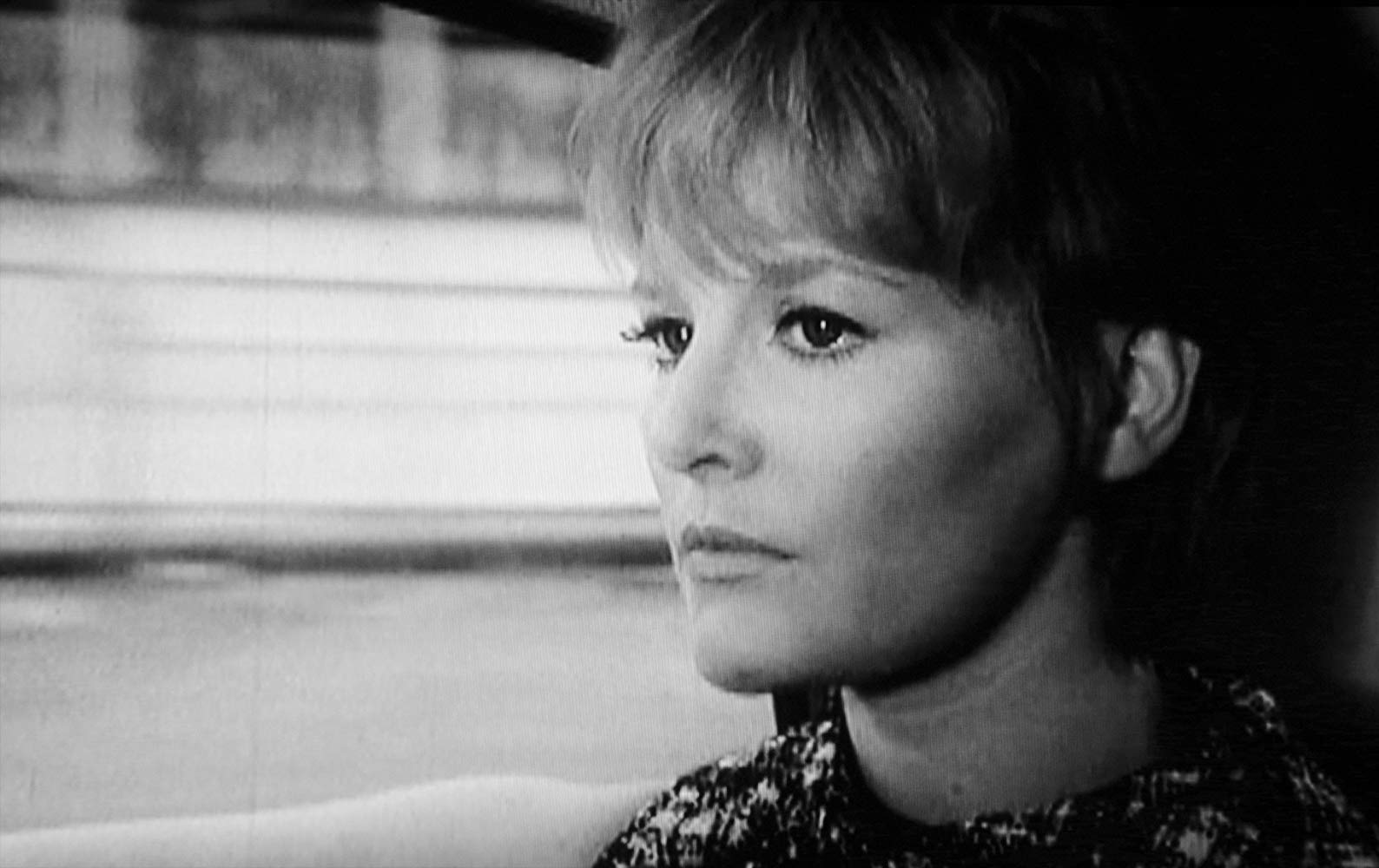
1965
Musicarello (Italy) - 85 minutes
The film takes place in Ferrari, Italy about two young pizza chefs named Mario and Luigi that traverse all around the town looking for a lost violin. Throughout the film, they meet characters that assist them on the journey leading them throughout town realizing that despite the loss of their violin, they find themselves and who they really are. A series of pop songs, performed by famous Italian and foreign singers and musicians, are connected to one another through a series of outlandish animated vignettes.
1965
Musicarello (Italy) - 85 minutes
The film takes place in Ferrari, Italy about two young pizza chefs named Mario and Luigi that traverse all around the town looking for a lost violin. Throughout the film, they meet characters that assist them on the journey leading them throughout town realizing that despite the loss of their violin, they find themselves and who they really are. A series of pop songs, performed by famous Italian and foreign singers and musicians, are connected to one another through a series of outlandish animated vignettes.
1966
Concert / Documentary - 93 minutes
Concert film produced by Phil Spector (who also appears) hosted by David McCallum and featuring live performances by some of the top rock-and-roll acts of the mid 60s: Petula, Joan Baez, The Byrds, Ray Charles, Bo Diddley, Donovan, The Lovin' Spoonful, David McCallum, Roger Miller, The Modern Folk Quartet, The Ronettes, Sky Saxon of the Seeds and Ike and Tina Turner. Filmed at The Moulin Rouge Club in Los Angeles.
1966
Concert / Documentary - 93 minutes
Concert film produced by Phil Spector (who also appears) hosted by David McCallum and featuring live performances by some of the top rock-and-roll acts of the mid 60s: Petula, Joan Baez, The Byrds, Ray Charles, Bo Diddley, Donovan, The Lovin' Spoonful, David McCallum, Roger Miller, The Modern Folk Quartet, The Ronettes, Sky Saxon of the Seeds and Ike and Tina Turner. Filmed at The Moulin Rouge Club in Los Angeles.
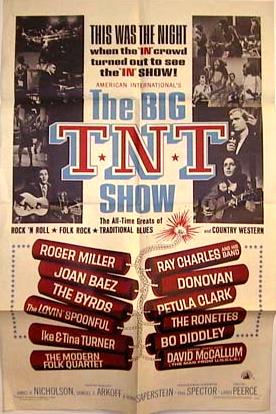
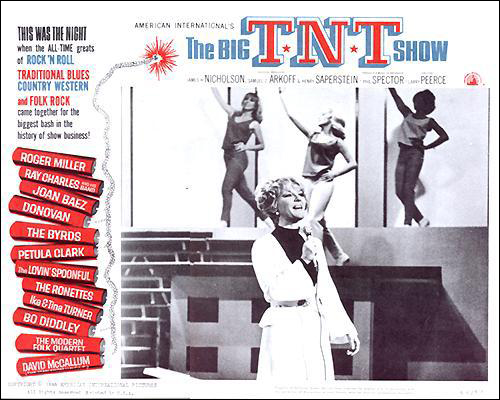
CAST: (in credit order)
Joan Baez .... Herself
Gene Clark .... Himself (as The Byrds)
Mike Clarke .... Himself (as The Byrds)
David Crosby .... Himself (as The Byrds)
Chris Hillman .... Himself (as The Byrds)
Roger McGuinn .... Himself (as The Byrds)
Ray Charles .... Himself
Petula Clark .... Herself
Bo Diddley .... Himself
Donovan .... Himself
Steven Boone .... Himself (as Lovin' Spoonful)
Joe Butler .... Himself (as Lovin' Spoonful)
John Sebastian .... Himself (as Lovin' Spoonful)
Zal Yanovsky .... Himself (as Lovin' Spoonful)
Roger Miller .... Himself
Henry Diltz .... Himself (as The Modern Folk Quartet)
Chip Douglas .... Himself (as The Modern Folk Quartet)
Cyrus Faryar .... Himself (as The Modern Folk Quartet)
Jerry Yester .... Himself (as The Modern Folk
Quartet)
Estelle Bennett .... Herself (as The Ronettes) Ronnie Spector .... Herself (as The Ronettes)
Nedra Talley .... Herself (as The Ronettes)
Ike Turner .... Himself (as Ike and Tina Turner)
Tina Turner .... Herself (as Ike and Tina Turner)
David McCallum .... Himself/Host
Phil Spector .... Himself (uncredited)
Joan Baez .... Herself
Gene Clark .... Himself (as The Byrds)
Mike Clarke .... Himself (as The Byrds)
David Crosby .... Himself (as The Byrds)
Chris Hillman .... Himself (as The Byrds)
Roger McGuinn .... Himself (as The Byrds)
Ray Charles .... Himself
Petula Clark .... Herself
Bo Diddley .... Himself
Donovan .... Himself
Steven Boone .... Himself (as Lovin' Spoonful)
Joe Butler .... Himself (as Lovin' Spoonful)
John Sebastian .... Himself (as Lovin' Spoonful)
Zal Yanovsky .... Himself (as Lovin' Spoonful)
Roger Miller .... Himself
Henry Diltz .... Himself (as The Modern Folk Quartet)
Chip Douglas .... Himself (as The Modern Folk Quartet)
Cyrus Faryar .... Himself (as The Modern Folk Quartet)
Jerry Yester .... Himself (as The Modern Folk
Quartet)
Estelle Bennett .... Herself (as The Ronettes) Ronnie Spector .... Herself (as The Ronettes)
Nedra Talley .... Herself (as The Ronettes)
Ike Turner .... Himself (as Ike and Tina Turner)
Tina Turner .... Herself (as Ike and Tina Turner)
David McCallum .... Himself/Host
Phil Spector .... Himself (uncredited)
FILM NOTES:
TAG LINES: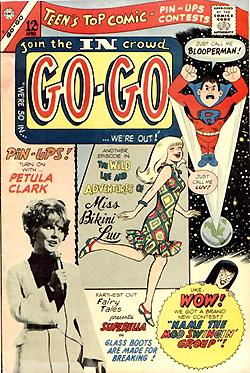
- Directed by Larry Peerce
- Produced by Phil Spector
- American International Production
TAG LINES:
- This was the night when the "IN" crowd turned out to see the "IN" SHOW!
- It's the Biggest Bash Ever!
- This was the night when the all-time greats of rock 'n roll, traditional blues, country western and folk rock came together for the biggest bash in the history of show business!

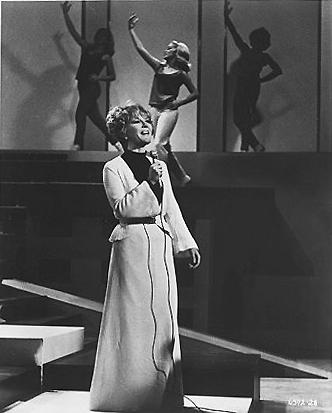

REVIEWS:
- Follow-up to THE T. A. M. I. SHOW casts a wider musical net, with lesser results, but Diddley, Tina Turner, and Ronnie Spector keep it pumping. Shot on tape, transferred to film; footage reused in THAT WAS ROCK.
Leonard Maltin
- Featuring a mixed bag of pop-tune trends--blues, rock, folk, folk-rock and country music, The Big T.N.T. Show spotlights 11 current personality acts, plus David McCallum in a 94 minute songalog filmed before hundreds of screaming teenagers at Hollywood's old Moulin Rouge nitery. The production, generally well-directed, has something for all teeners and most post-teeners. American International, which last year released the prototype TAMI SHOW, will clean up in the youth market where much playing, and re-playing, time is likely.
Director Larry Peerce has kept a neat pace by mixing up the tune styles, sometimes encoring an act in later reels to give the film more unity. McCallum, who makes an early entrance via okay gag reminiscent of his material on THE MAN FROM U.N.C.L.E. vidseries, variously intros acts, conducts the Ray Charles band and, on one occasion, pontificates too dramatically. (The artists) are spotted to good advantage throughout, singing the songs they made famous, as the saying goes.
Robert Boatman did a first-rate job as first cameraman, using facilities of Mark Armistead once called Electronovision and now called Electrorama. Pic is in 1.85:1 ratio, b & w, with a real live feel to the proceedings. Little distortion is evident in the electronice film process. Peerce, Boatman and editors Ronald Sinclair and Eve Newman rate a big nod for keeping high visual interest. Cuts and dissolves are appropriate to the mood of the music. Only in Donovan's overlong turn does the team falter, with some repetitious angles and cutting. One of his tunes should be eliminated for better pace. There's a consistent scream track (save for Miss Baez and Donovan) which becomes annoyingly obtrusive; the live crowds, while very enthusiastic, didn't maintain this obviously-phony background wail.
Technical credits are excellent all the way down the line. Phil Spector coordinated the music and is credited as producer. End title suggests another sequel next year. A print of each should be buried in a time capsule.
Variety - January 19, 1966
The Big T.N.T. Show isn't any kind of conventional movie. It is a straight variety show with some of the biggest names and talents currently operating in the pop, rock and folk music field. The A.I.P production, photographed "live" during a simulated concert will be a big attraction, especially for younger audiences. The kids will take to it because the stars are their own.
The thread of continuity is provided by David McCallum, another idol of the younger set. He introduces the acts and then gets out of the way. There is not much to say about a film of this sort. The sound might have been more expertly handled. There is a continual din during most of the numbers; that is the way the kids "listen" today. That's alright. It's part of the program. But for a movie, this audience noise might have been modulated so it does not drown out the artist.
Hollywood Reporter - January 19, 1966
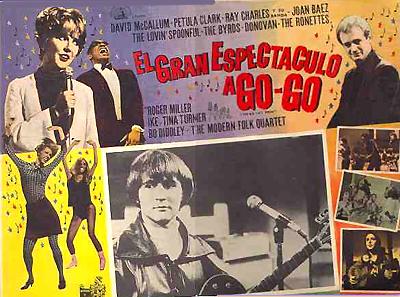
Spanish poster
October 9, 1968
Musical (USA) - 141 minutes
Twenty years after its opening on Broadway, the musical Finian's Rainbow made its debut on film thanks to Francis Ford Coppola. The movie stars Fred Astaire as Irishman Finian McLonergan, who steals a pot of gold from the leprechaun Og (Tommy Steele) and, with his daughter Sharon (Petula Clark), brings it to Rainbow Valley in the fictional southern state of Missitucky. Sharecropper Woody Mahoney (Don Francks) and the rest of the community of Rainbow Valley are fighting to keep their land and tobacco crop away from the greedy, racist hands of Senator Billboard Rawkins (Keenan Wynn) and his assistant, Buzz Collins (Ronald Colby). Og's magical pot of gold causes more trouble than good when Sharon's wish that the senator would know what it's like to be black comes true. The rest of the pot's wishes are quickly used up trying to undo the trouble. The hit song "How Are Things in Glocca Morra?" is one of the highlights from the musical score. This was Fred Astaire's last full-length musical, and he is a delight to watch.
October 9, 1968
Musical (USA) - 141 minutes
Twenty years after its opening on Broadway, the musical Finian's Rainbow made its debut on film thanks to Francis Ford Coppola. The movie stars Fred Astaire as Irishman Finian McLonergan, who steals a pot of gold from the leprechaun Og (Tommy Steele) and, with his daughter Sharon (Petula Clark), brings it to Rainbow Valley in the fictional southern state of Missitucky. Sharecropper Woody Mahoney (Don Francks) and the rest of the community of Rainbow Valley are fighting to keep their land and tobacco crop away from the greedy, racist hands of Senator Billboard Rawkins (Keenan Wynn) and his assistant, Buzz Collins (Ronald Colby). Og's magical pot of gold causes more trouble than good when Sharon's wish that the senator would know what it's like to be black comes true. The rest of the pot's wishes are quickly used up trying to undo the trouble. The hit song "How Are Things in Glocca Morra?" is one of the highlights from the musical score. This was Fred Astaire's last full-length musical, and he is a delight to watch.
CAST:
Fred Astaire .....Finian McLonergan
Petula Clark .....Sharon McLonerga
Tommy Steele.....Og the Leprechaun
Don Francks .....Woody Mahoney
Keenan Wynn .....Senator Billboard Rawkins
Barbara Hancock .....Susan the Silent
Al Freeman Jr......Howard
Ronald Colby .....Buzz Collins
Dolph Sweet .....Sheriff
Wright King .....District Attorney
Louis Silas .....Henry
Fred Astaire .....Finian McLonergan
Petula Clark .....Sharon McLonerga
Tommy Steele.....Og the Leprechaun
Don Francks .....Woody Mahoney
Keenan Wynn .....Senator Billboard Rawkins
Barbara Hancock .....Susan the Silent
Al Freeman Jr......Howard
Ronald Colby .....Buzz Collins
Dolph Sweet .....Sheriff
Wright King .....District Attorney
Louis Silas .....Henry
FILM NOTES:
- Directed by Francis Ford Coppola
- Written by E.Y. Harburg & Fred Saidy (also play)
- Filmed at Warner Brothers Studios
- The film was nominated for an Academy Award in two categories:
-Best Music, Score of a Musical Picture (Original or Adaptation)
-Best Sound - Petula was nominated for a Golden Globe Best Motion Picture Actress - Musical/Comedy
SOUNDTRACK:
- "Look To The Rainbow /How Are Things In Glocca Morra?"
Sung by Petula Clark
- "This Time of The Year"
Sung by Al Freeman, Jr. and chorus - "How Are Things In Glocca Morra?" Sung by Petula Clark
- Look To The Rainbow" Sung by Fred Astaire and Petula Clark
- "Old Devil Moon" Sung by Don Francks and Petula Clark
- "Something Sort of Grandish" Sung by Tommy Steele and Petula Clark
- "If This Isn't Love" Sung by Don Francks, Petula Clark and chorus
- "That Great Come-And-Get-It Day" Sung by Don Francks, Petula Clark and Chorus
- "When The Idle Poor Become The Idle Rich" Sung by Fred Astaire and chorus
- "Rain Dance Ballet"
- "The Begat" Sung by Keenan Wynn and Gospel Trio
- "When I'm Not Near The Girl I Love" Sung by Tommy Steele
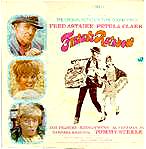
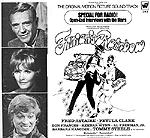
REVIEW EXCERPTS:
-
This pretentious whimsy defeated Francis Coppola--though he tries valiantly, he sinks the movie with stolid action sequences and gushy lyrical effects. It's Fred Astaire's last musical and a sorry farewell. The story, of a leprechaun and a southern senator who turns up in blackface, dated horribly in the long interim between the Broadway run and the screen mounting, but the Lerner and Lane score remains catchy despite the moldy book. With too much of Tommy Steele, Don Francks, and Keenan Wynn, and not enough of Petula Clark, who had every right to a distinguished career in musicals (1968).
Dave Kehr - The Chicago Reader - Laser Disc Review:
Its score is intoxicating, its direction superb, and its peerless star was poignantly featured in what was clearly yet effectively a swan song performance, but Finian's Rainbow fell into the musical black hole of the late sixties that was created by the weighty popularity of The Sound of Music. It is sometimes difficult to convince people they should see the movie at all, let alone suggest that it contains as much magic as the best musicals ever to come out of Hollywood.
The movie was directed by Francis Ford Coppola as a widescreen film and certainly requires letterboxing to transmit its splendors. As we pointed out in our review of Mame, it is difficult to pull off big dance numbers outdoors, but Coppola does it consistently and with considerable success, never allowing the backgrounds to overwhelm the dancers, but never moving in so close to the dancers that the backgrounds could be mistaken for sets. The framing and setting is ideal for Fred Astaire as well, because he can exercise his talent without worrying about a precise delivery. One number, however, is more effective on the scanned-and-cropped version and can even be used as an example of the few advantages cropping sometimes provides. When it is cropped, the Don Francks and Petula Clark number, "Old Devil Moon," changes from a standard romantic duet to an intimate and passionate ballad, with the faces of the stars filling the screen so tightly they seem unable to draw away from one another. It may not be what Coppola intended, but it was what made us first fall in love with the film in the first place.
Doug Pratt- DVDLaser.com
- Whimsical Burton Lane-E. Y. Harburg musical fantasy about racial injustice was ahead of its time in the late '40s on Broadway, embarrassingly dated 20 years later, but Coppola and an attractive cast work wonders with it in this imaginatively filmed, widescreen winner--perhaps the best movie musical of its era. Harburg's lyrics remain elegant and witty, and Astaire is fun as the transplanted Irishman whose leprechaun comes to life in the American South. Try to see it in a theater. Panavision.
Leonard Maltin
- Miss Clark invites no comparisons, bringing to her interpretation of Sharon her own distinctive freshness and form of delivery. There are those moments when she appears a trifle too sophisticated to be clogging up and down the hillsides or to be the product of rural birth, but they are dispelled when she fights her way through directorial obstructions with Don Francks through the bewitching "Old Devil Moon," cavorts through "If This Isn't Love" with the ensemble or caresses into ownership the standout "How Are Things in Glocca Mona." "Look to the Rainbow" replaces an overture and becomes a rapturous, if unsteadily focused, journey across America by Miss Clark and Astaire.
John Mahoney, Hollywood Reporter, October 9, 1968
- Fred Astaire and Petula Clark star in writer Joseph Landon's maiden film production, in which young director Francis Ford Coppola and vet choreographer Hermes Pan have worked capably to sustain a light, pastoral musical fantasy. . Miss Clark. in her American film debut, has a winsome charm which comes through despite a somewhat reactive role.
Wanda Hale, New York Daily News
- The screen version of Finian's Rainbow is a disappointment, especially to those of us who saw and cherished the musical in its first go-round 21 years ago at the 46 Street Theater. Overproduction is the culprit... Astaire's dancing partner is Petula Clark. Finian's daughter, Sharon. As the transplanted colleen. not as sure as her father of finding happiness in this land of gold, Miss Clark gives a good performance and she sings the beautiful songs like a nightingale.
Variety, October 9, 1968
- Considering what Francis Ford Coppola was working with in Finian's Rainbow - a socially conscious whimsy fantasy operatta - he has done pretty well, or probably as well as could be done short of rethinking the whole thing, and then it would hardly be Finian's Rainbow... Petula Clark is lovely in her first big number though the spectres of Jeanette MacDonald and Nelson Eddy hover over her duets with the stolid Don Francks.
Pauline Kael, The New Yorker, October 19, 1968
- But the terrible truth is that Finian's folklore was always fake, its sentiments always bogus, its social consciousness always a clumsy embarrassment, and we always knew it. This is not to deny the show its enduring charms and several new ones as well. Petula Clark looks lovely as Finian's daughter and sings beautifully, with an occasional startling reference to the phrasing and timbre of Ella Logan's original performance.
Joseph Morgenstern, Newsweek, October 21, 1968
August 1969
Musical (USA) - 147 minutes
A shy schoolmaster finds love with a stage actress who helps bring him to greatness as a teacher, ultimately earning him the respect and admiration of his students and peers.
Musical remake of the 1939 classic. Based on the novel by James Hilton.
August 1969
Musical (USA) - 147 minutes
A shy schoolmaster finds love with a stage actress who helps bring him to greatness as a teacher, ultimately earning him the respect and admiration of his students and peers. Musical remake of the 1939 classic. Based on the novel by James Hilton.
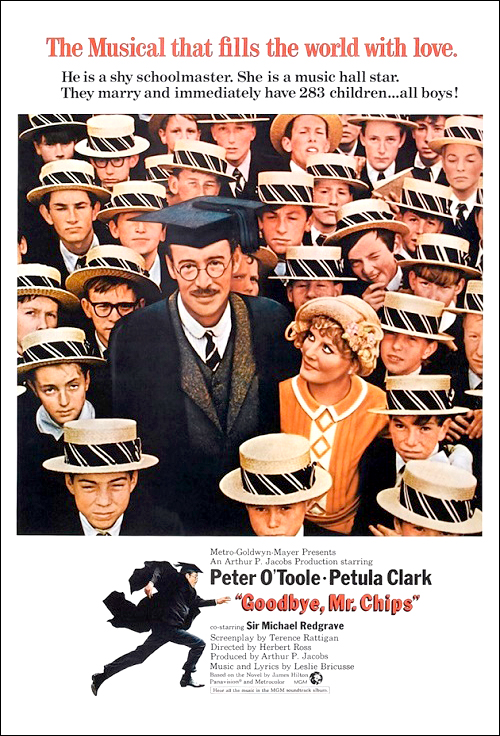
CAST:
Arthur Chipping .....Peter O'Toole
Katherine Bridges .....Petula Clark
Headmaster .....Michael Redgrave
Lord Sutterwick .....George Baker
Ursula Mossbank .....Sian Phillips
Max Staefel .....Michael Bryant
AWARDS:
Academy Awards
- Peter O'Toole was nominated for Best Actor in a Leading Role
- Leslie Bricusse, John Williams were nominated for Best Music, Score of a Musical Picture (Original or Adaptation)
- Peter O'Toole won Golden Globe for Best Motion Picture Actor - Musical/Comedy
- Leslie Bricusse was nominated for Best Original Score
- Sian Phillips was also nominated for Best Supporting Actress
- Peter O'Toole won Best Actor
- Sian Phillips won Best Supporting Actress
- Peter O'Toole was nominated for Best Actor
- Peter O'Toole tied with Dustin Hoffman for (Midnight Cowboy) for Best Foreign actor.
-
Golden Gryphon won by Herbert Ross
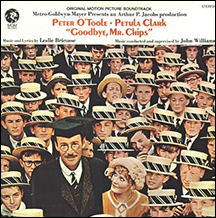
SOUNDTRACK:
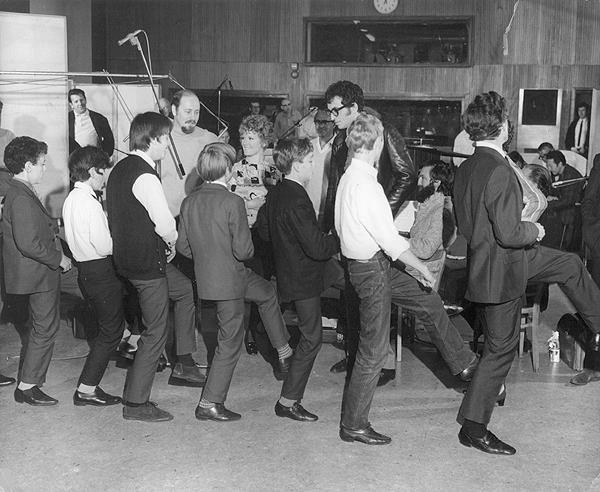
- Music and Lyrics: Leslie Bricusse (all songs)
- Complete soundtrack released on vinyl
- Promotional soundtrack also released.
- Excerpts released on CD (along with highlights from "The Boyfriend")

Recording session
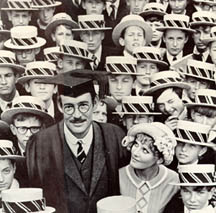
Soundtrack
- "Overture"
Performed by Orchestra,
Conducted by John Williams
- "Main Titles/Fill the World With Love"
Performed by Orchestra and Boys Chorus
- "Where Did My Childhood Go?"
Performed by Peter O'Toole
- "London Is London"
Performed by Petula Clark
- "And the Sky Smiled"
Performed by Petula Clark
- "Apollo"
Performed by Petula Clark
- "When I Am Older"
Performed by Boys Chorus
- "Walk Through the World"
Performed by Petula Clark
- "Fill the World With Love"
Performed by Petula Clark, Boys Chorus
- "Entr'Acte/What Shall I Do With Today?"
Performed by Orchestra Conducted by John Williams/Petula Clark
- What A Lot of Flowers"
Performed by Peter O'Toole
- "What A Lot of Flowers (Reprise)"
Performed by Peter O'Toole
- "And the Sky Smiled (Reprise)"
Performed by Petula Clark
- "Schooldays"
Performed by Petula Clark and Boys
- "You and I"
Performed by Petula Clark
- "Fill the World With Love (Reprise)"
Performed by Peter O'Toole, Boys Chorus
- "Exit Music - You and I"
Performed by Orchestra Conducted by John Williams
REVIEW EXCERPTS
- For the new version, the wife has been made a West End musical-comedy actress, which gives Petula Clark a reason for playing it. I think I'm in love with her. If she had come along twenty years ago, a time the screen knew a mercurial presense when it saw one, she would have been a much bigger star than she ever has a chance of being now. The playing is superb. Peter O'Toole is a prim and angular Chips who wears a look of permanent insecurity; Miss Clark is a soft, sweet-smelling, dimpled doughnut with powdery cheeks and witty anxiety, like a new Jean Arthur. Together they are perfect counterparts. . .Goodbye Mr. Chips is, I'm afraid, very square indeed, but thanks to an idyllic ast and a magnificent director, there is so much love and beauty in it that it made my heart stop with joy. I found it all quite irresistible.
Rex Reed, Holiday - Petula Clark, in an expansion of the Greer Garson role, also contributes grace and intelligence to the production.
Newsweek - 11/17/69
- Rarely have a pair of players been so marvelously in turn with each other as Peter O'Toole and Petula Clark.
Seventeen - Goodbye Mr. Chips, at the Palace, has been produced in England in surroundings of inevitable authenticity and taste, with performers of extraordinary talent and range, and the results are here for all of us to share the sentimental warmth. Peter O'Toole give one of his very best performances as the repressed professor, and Petula Clark goes to town in the other direction as the actress-singer who really wants to lead another kind of life. This is a pictures which, if you will concede the value and interest of subject and story, could hardly have been made into a more appealing picture. I enjoyed it and I was far from prejudiced in its favor. That O'Toole performance is a gem, and Petula Clark knows exactly how to enhance its brilliance, and her own, most effectively.
Archer Winsten, New York Post - 11/6/69
- Petula Clark brings spontaneity, charm and a refreshing ingenue quality that belies her age.
Box Office
- Petula Clark, as the musical-comedy star who exchanges the false glamour of the stage for the fusty restrictions of faculty life, troubling herself and everyone else with the difficulties of the transition, is fresh and charming. Together with O'Toole she provides the firm, bright core for a film always in danger of becoming mushy. Nearly unaided, they make the old thing work - and make it worthwhile.
Richard Schickel - Life Magazine
And what of Petula Clark?
She is wonderful. Clark plays Catherine as though she is coming from just the other direction as Chips. Outwardly gay and devil-may-care, she is really someone who wants nothing to do with glamour. but would love to settle down and have a family. "My real name is Briskit," she tells Chips in Pompeii, to which he answers secretly delighted, "A good Anglo-Saxon name." As Clark plays Catherine she is both earth mother and Mother England all rolled up in one. (She actually appears as the seated Brittania early in the film. What is most remarkable about Petula Clark's portrayal of Catherine is that she becomes Catherine, a Catherine who loves her husband more than anything else. Everytime she looks at Chips we see love. It would be interesting to learn how o'Toole and Clark got along during the filming, for if they didn't like each other they immediately must be nominated for every acting award available.) The pride Catherine feels for Chips. . .the devotion. . . are tangible things. This is real. As played by Petula Clark, Catherine is the woman every man dreams of marrying which makes her perfect for the dumb-founded at his good luck Chips.
Jeff Laffel, Films in Review - December 1992
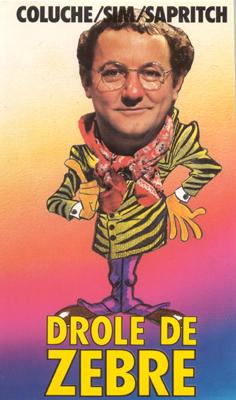
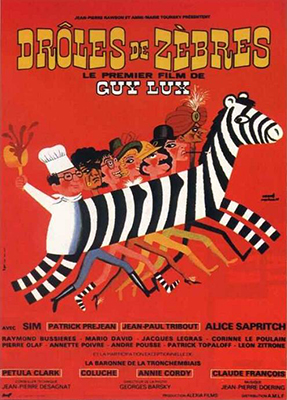
CAST:
Sim .............................. Napoléon Simfrid/La baronne
Alice Sapritch ............. Gilda Simfrid
Patrick Prèjean ...........Jean
Jean-Paul Tribout ........ Pierre
Raymond Bussières .... Le vieux client de l'hôtel
Mario David ................Grègorian
Jacques Legras ...........Jardine, le directeur de l'hôtelv Corinne Le Poulain ... Solange
Pierre Olaf .................. L'émir du Chokoweit
Petula Clark................ Elle-même
Sim .............................. Napoléon Simfrid/La baronne
Alice Sapritch ............. Gilda Simfrid
Patrick Prèjean ...........Jean
Jean-Paul Tribout ........ Pierre
Raymond Bussières .... Le vieux client de l'hôtel
Mario David ................Grègorian
Jacques Legras ...........Jardine, le directeur de l'hôtelv Corinne Le Poulain ... Solange
Pierre Olaf .................. L'émir du Chokoweit
Petula Clark................ Elle-même
FILM NOTES:
- Written & Directed by Guy Lux
- Filmed in Evian, France
- Alexia Films
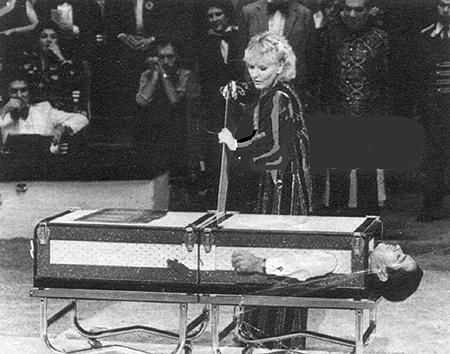
1980
Drama (UK) - 95 minutes
An unhappy little girl from a broken home goes to live with her mother's sister, Aunt Bee. Feeling alone and tormented by her two older cousins, she finds solace in the Peter Pan myth and acts out her fantasy by running away from home with her youngest cousin and setting up a "Wendy home" for other lost children in an abandonned house in the neighborhood.
1980
Drama (UK) - 95 minutes
An unhappy little girl from a broken home goes to live with her mother's sister, Aunt Bee. Feeling alone and tormented by her two older cousins, she finds solace in the Peter Pan myth and acts out her fantasy by running away from home with her youngest cousin and setting up a "Wendy home" for other lost children in an abandonned house in the neighborhood.
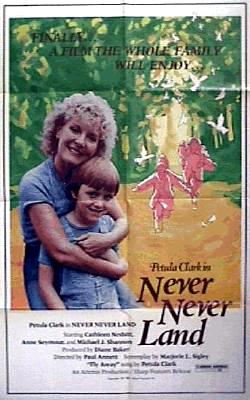
CAST:
Edith Forbes.....Cathleen Nesbitt
Aunt Bea.....Petula Clark
Zena.....Anne Seymour
Jim.....John Castle
Jennie.....Heather Miller
FILM NOTES:
- Filmed at EMI's Elstree Studios
- Directed by Paul Annett
- Produced by Diane Baker, Artemis Productions
- Petula sings the film title track "Fly Away," which was written by Jane McNealy & Alice Khuna and can be found on Petula's Downtown to Sunset Boulevard CD. This film was never properly distributed, and received its first, and only, real audience while airing on an American cable station in the early 80s. Unfortunately, although broadcast a number of times, cable was still in its infancy and thus the film reached only a very limited audience.
REVIEW:
- Never Never Land plots the story of a seven-year-old girl who, after being abandoned by her parents, rejected by her cousins and left in the care of her aunt, flees from all the grim reality of her life to a fantasy world. The hero of the little girl's dream world is none other than Peter Pan himself. Fueled by an emotional and pychological need for escape, the little girl starts writing real letters to Peter Pan! The results make for a thoroughly charming and intelligent G-rated diversion.
Produced by actress Diane Baker (Marnie, Adventures of a Young Man), Never Never Land boasts a cast that includes Petula Clark, Cathleen Nesbitt and Anne Seymour.
Like so many G-rated movies, Never Never Land failed to open theatrically in most of the United States. Theatre owners are too aware that the voices who are hysterically crying out for quality family entertainment seldom support the few good G-rated family films that trickle through each year.
Z Magazine [The now defunct Z cable station was the first American cable station to broadcast the film.]
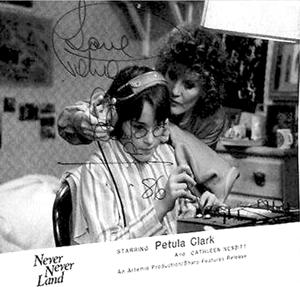

Producer Diane Baker and Petula in Cannes for the screening of "Never Never Land" at the Cannes Film Festival.
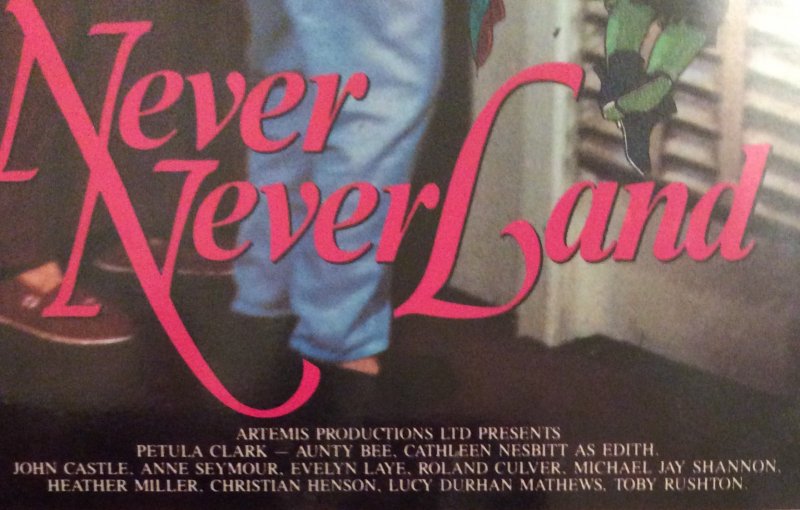
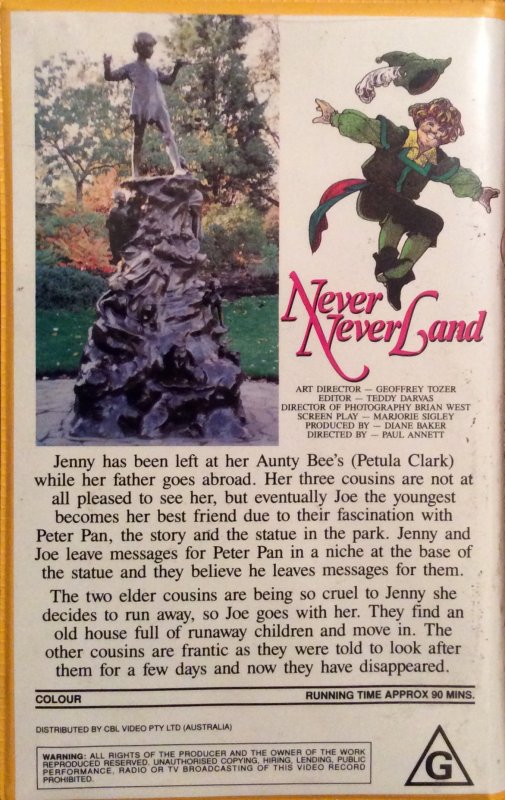
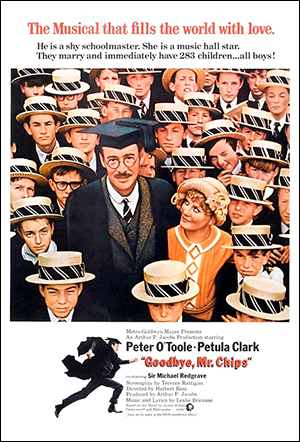
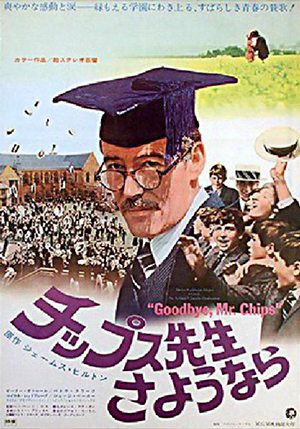
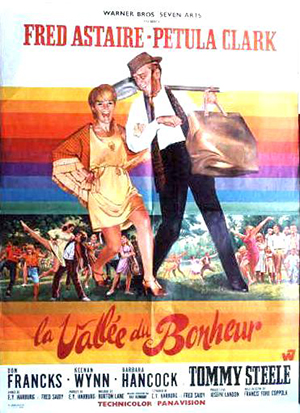

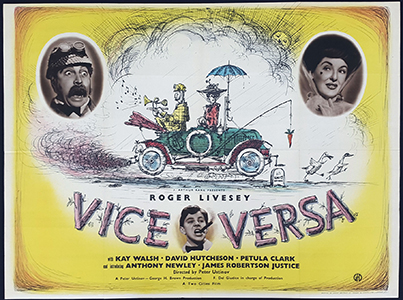
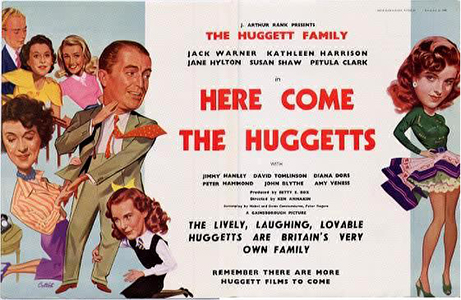
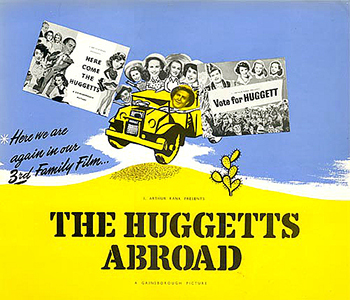
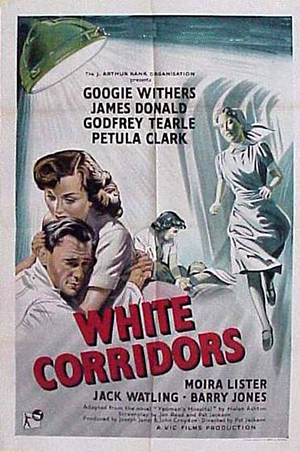
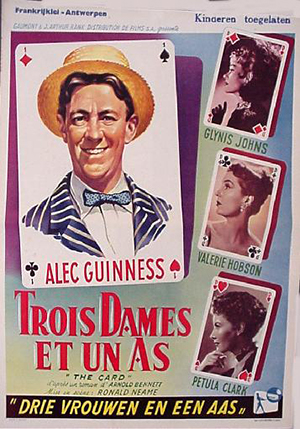
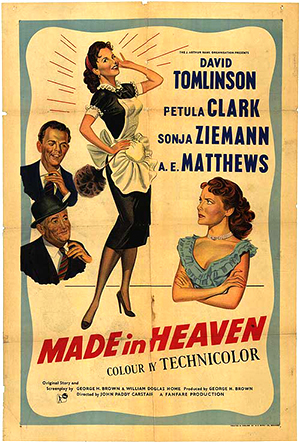
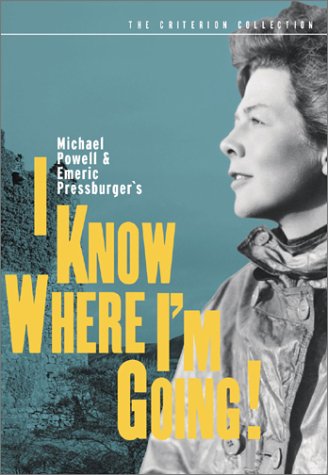
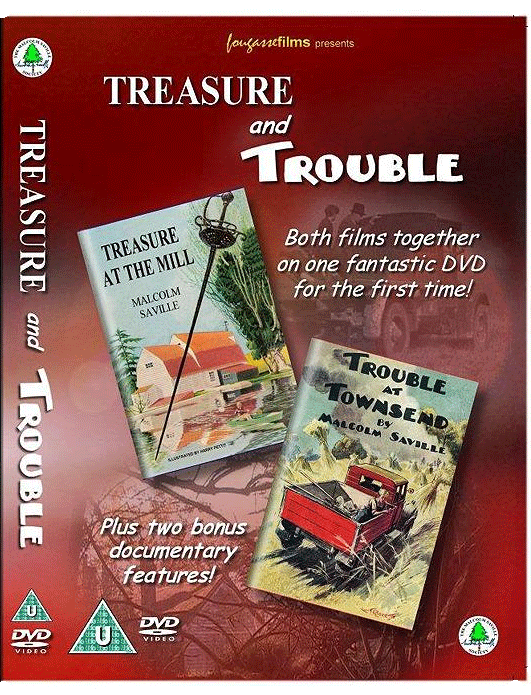

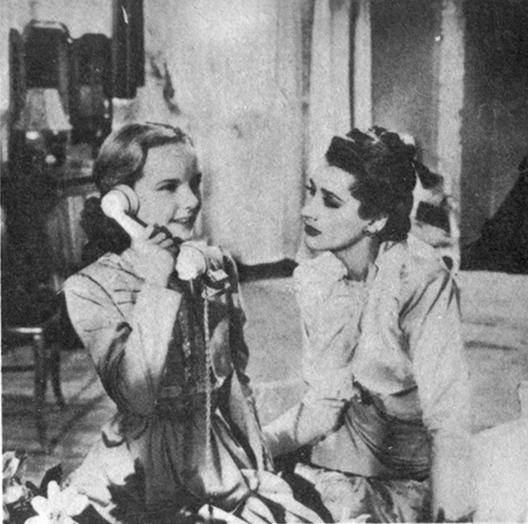
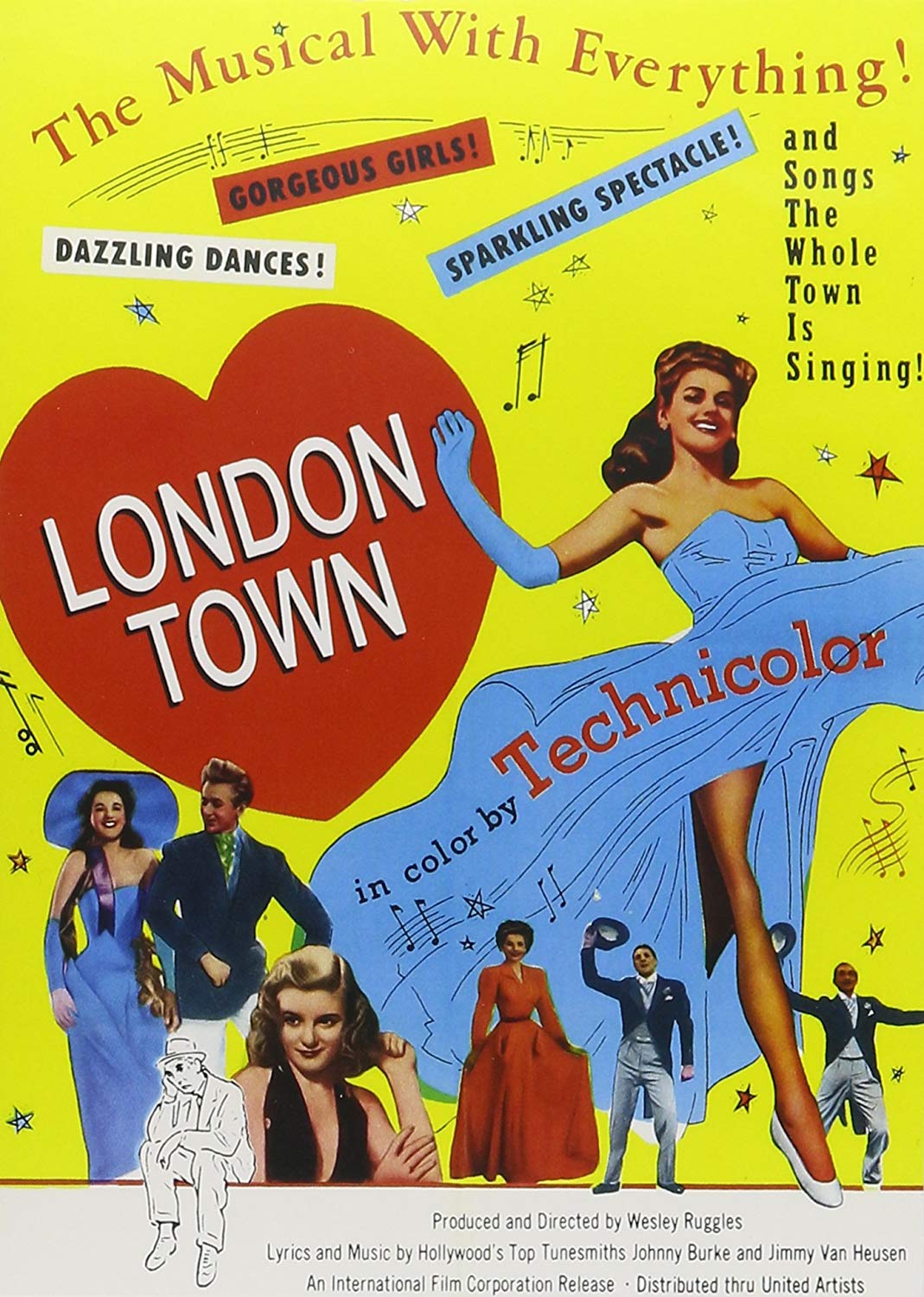
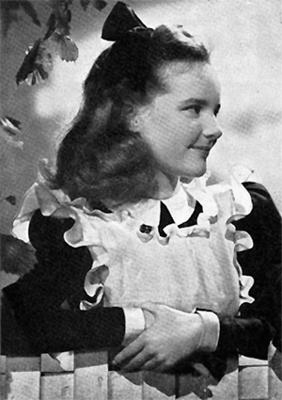
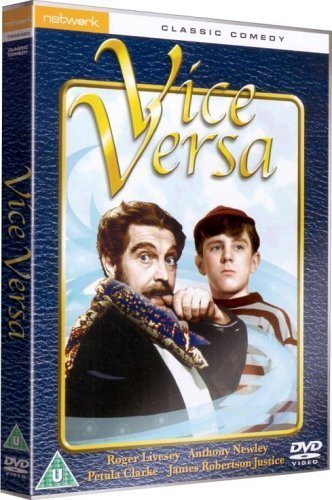
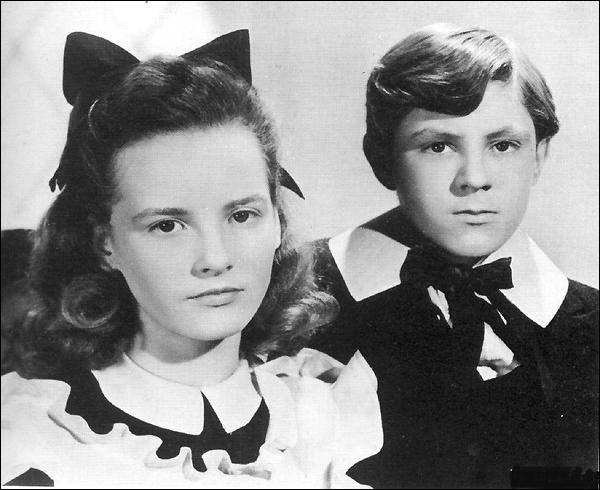

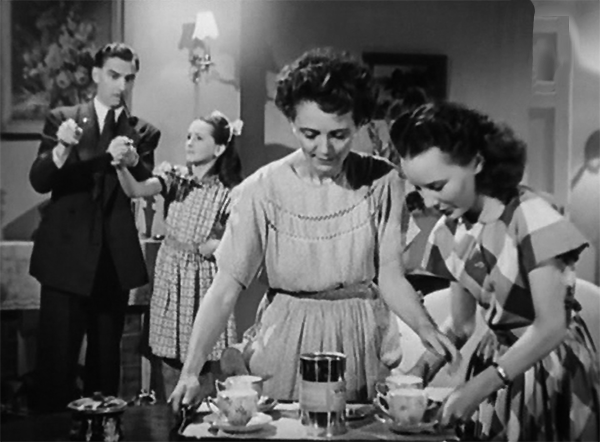
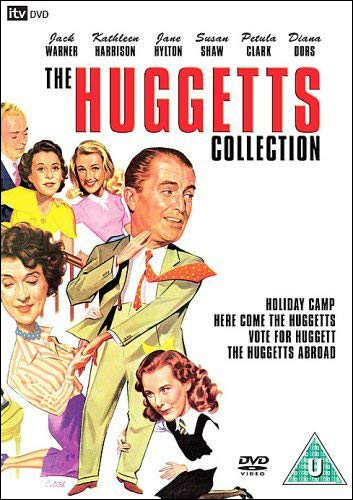
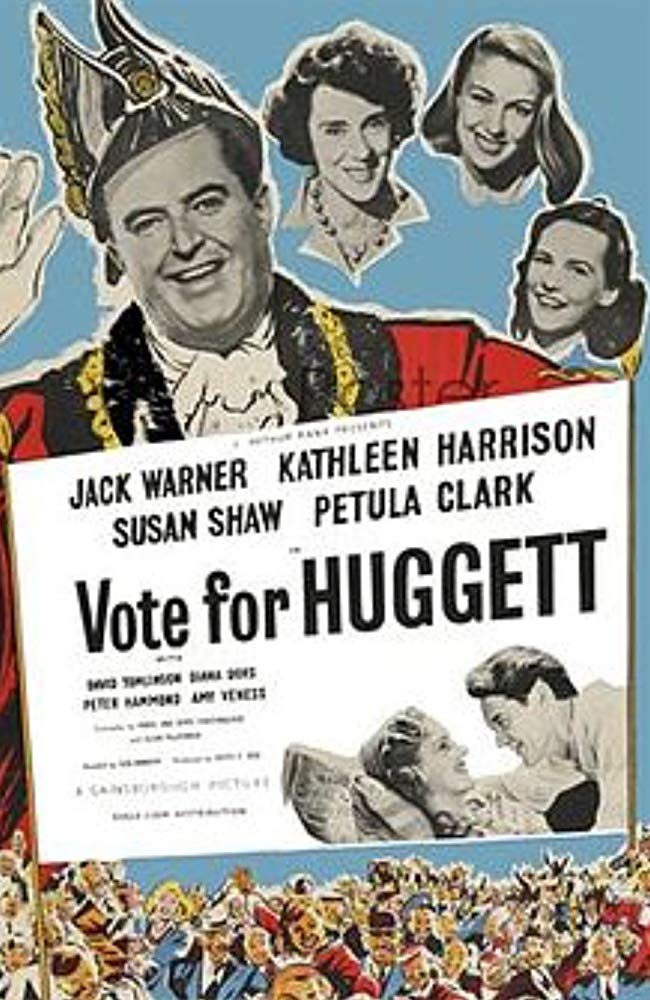
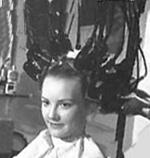

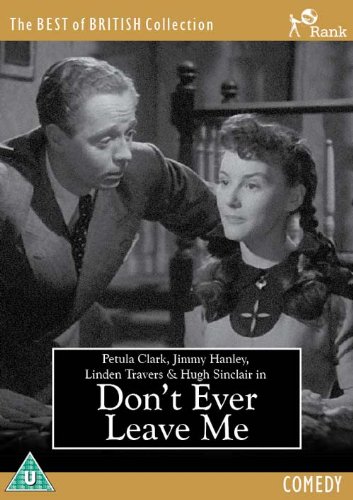
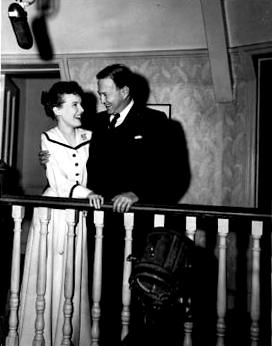
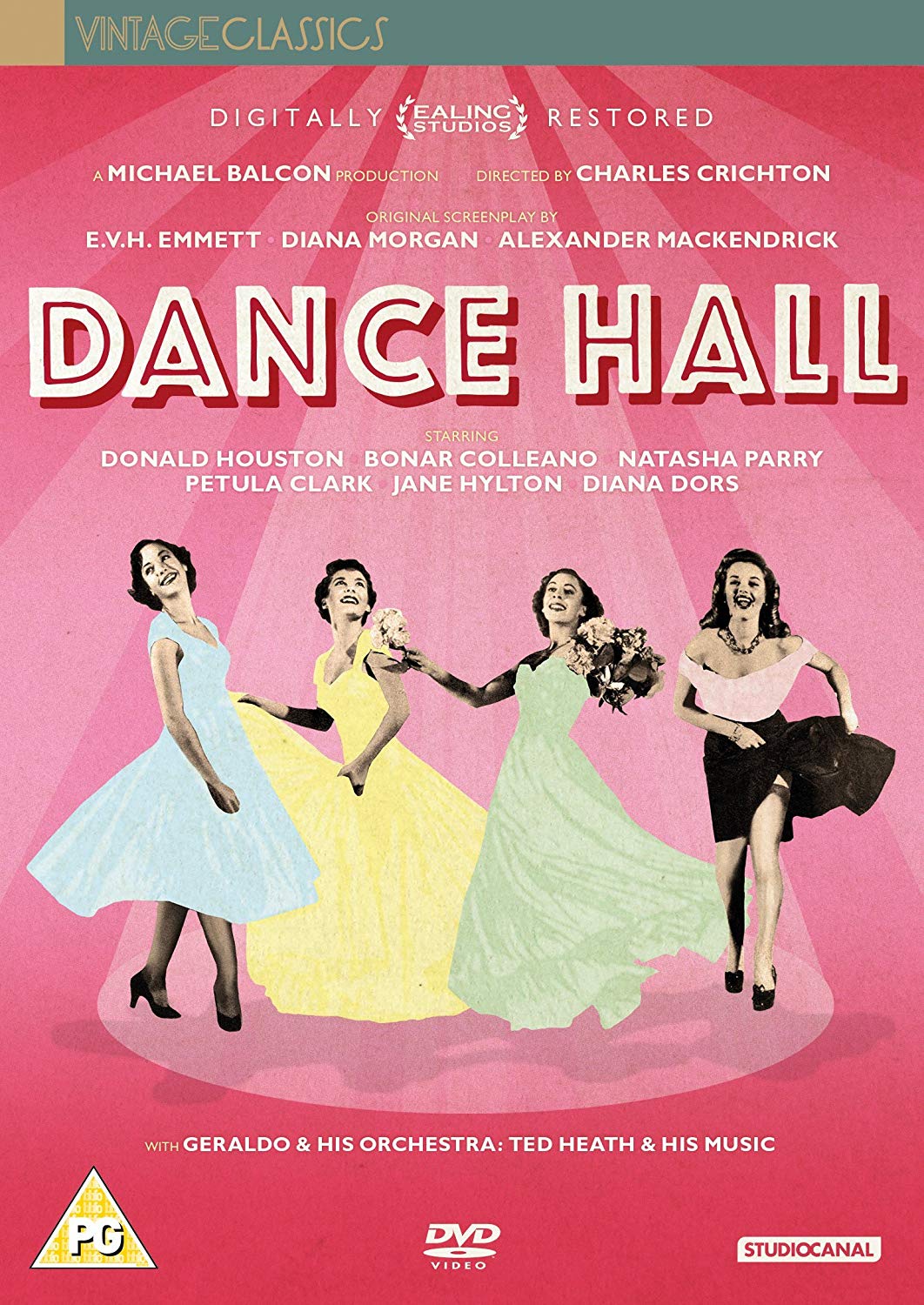

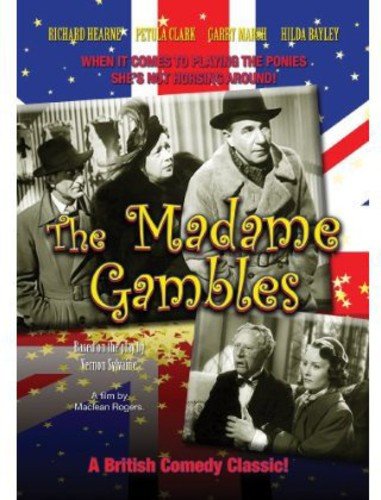

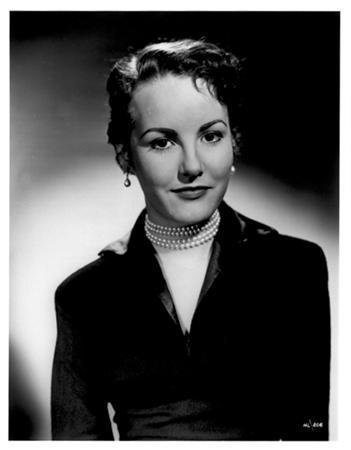
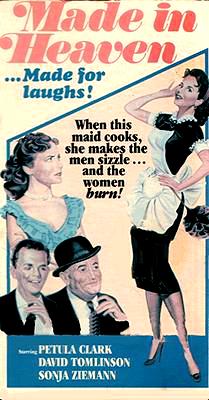
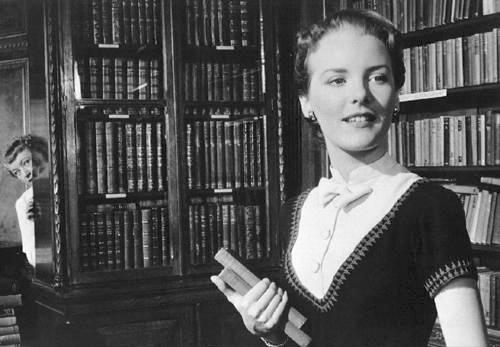

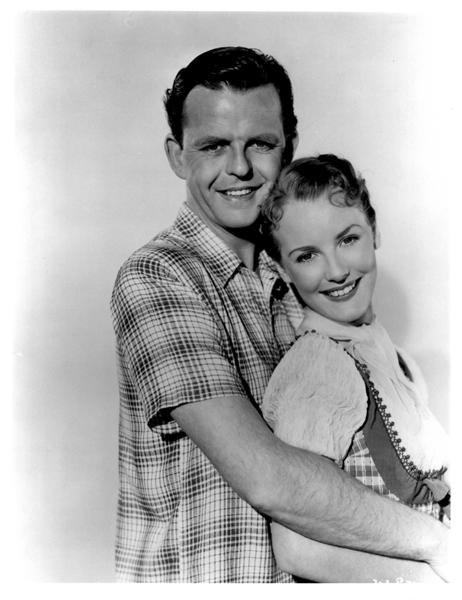
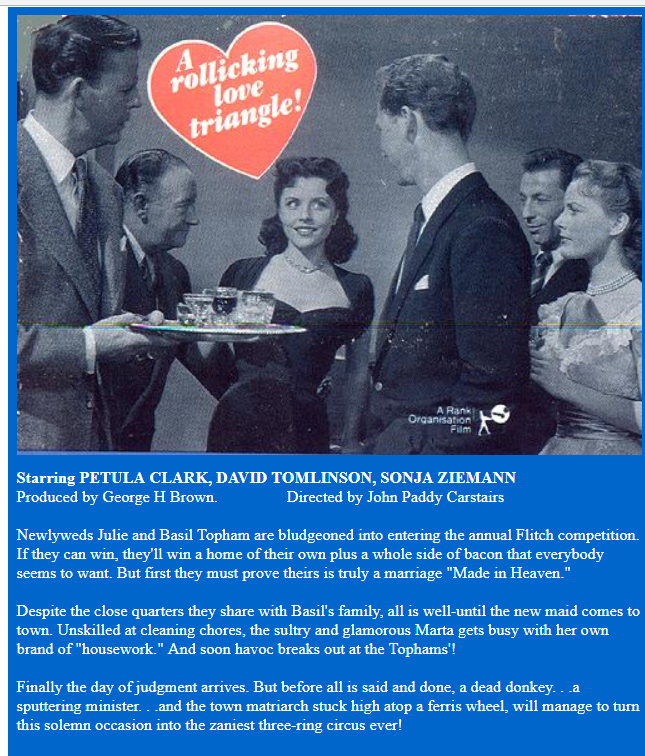
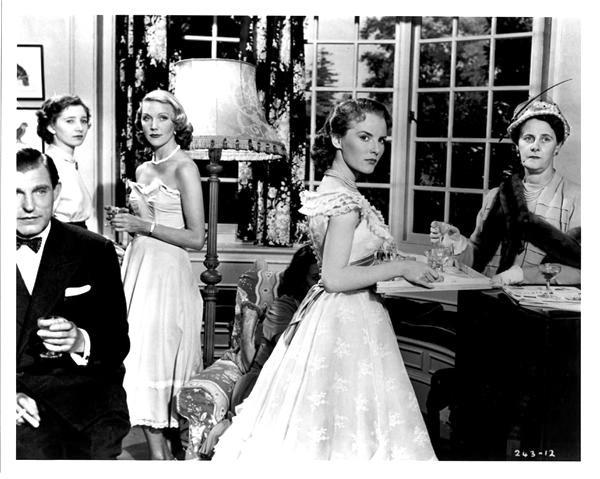
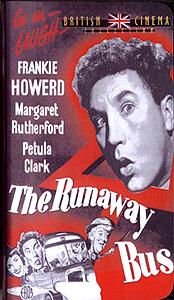
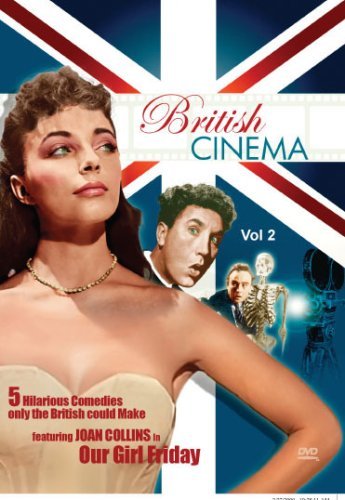
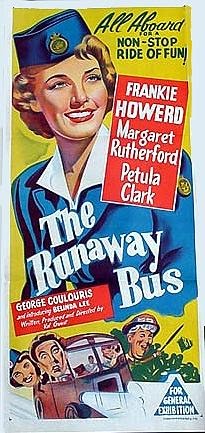
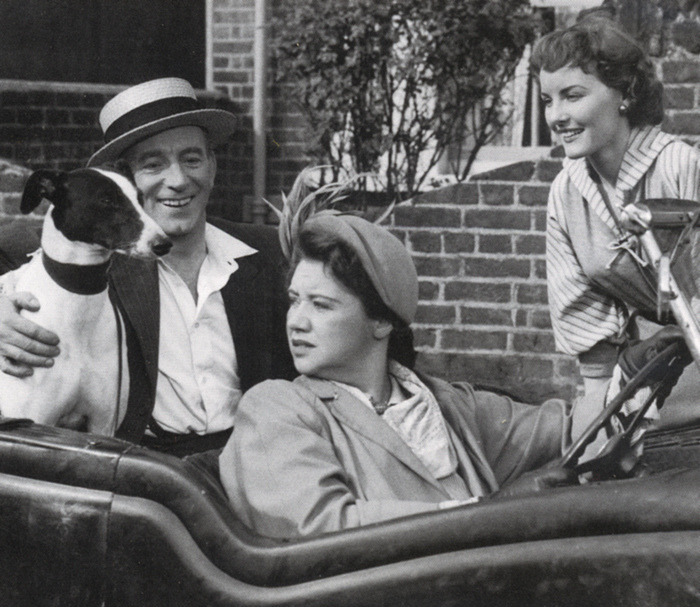

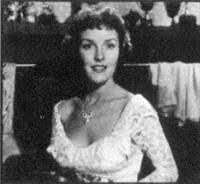
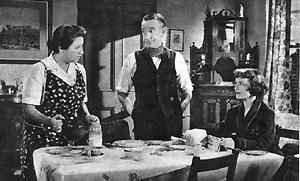
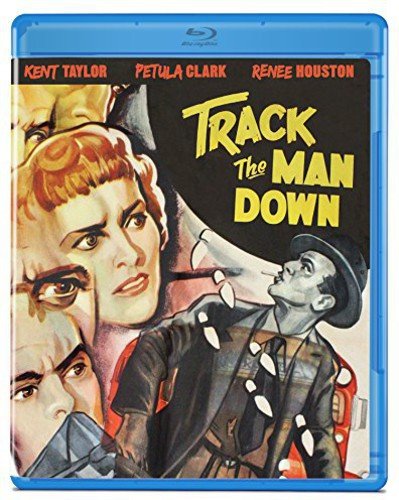
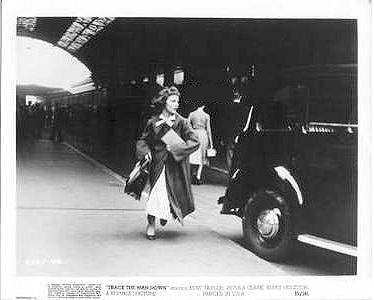
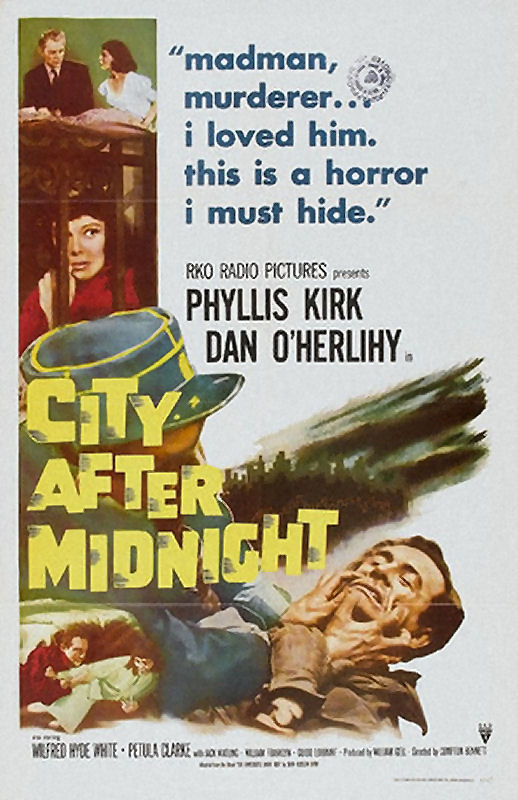
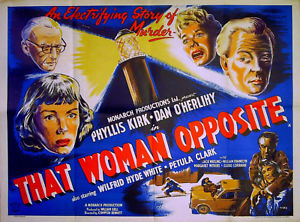
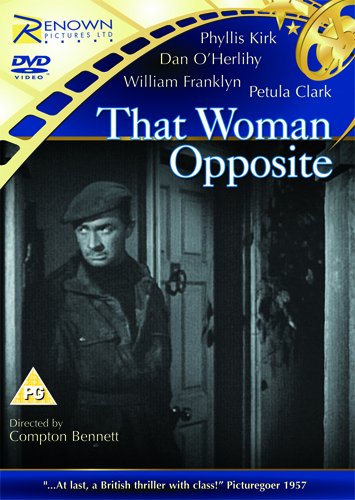
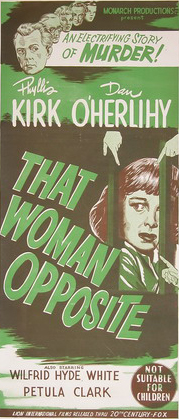


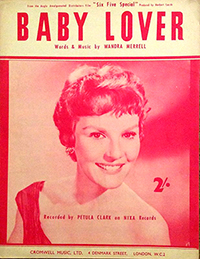
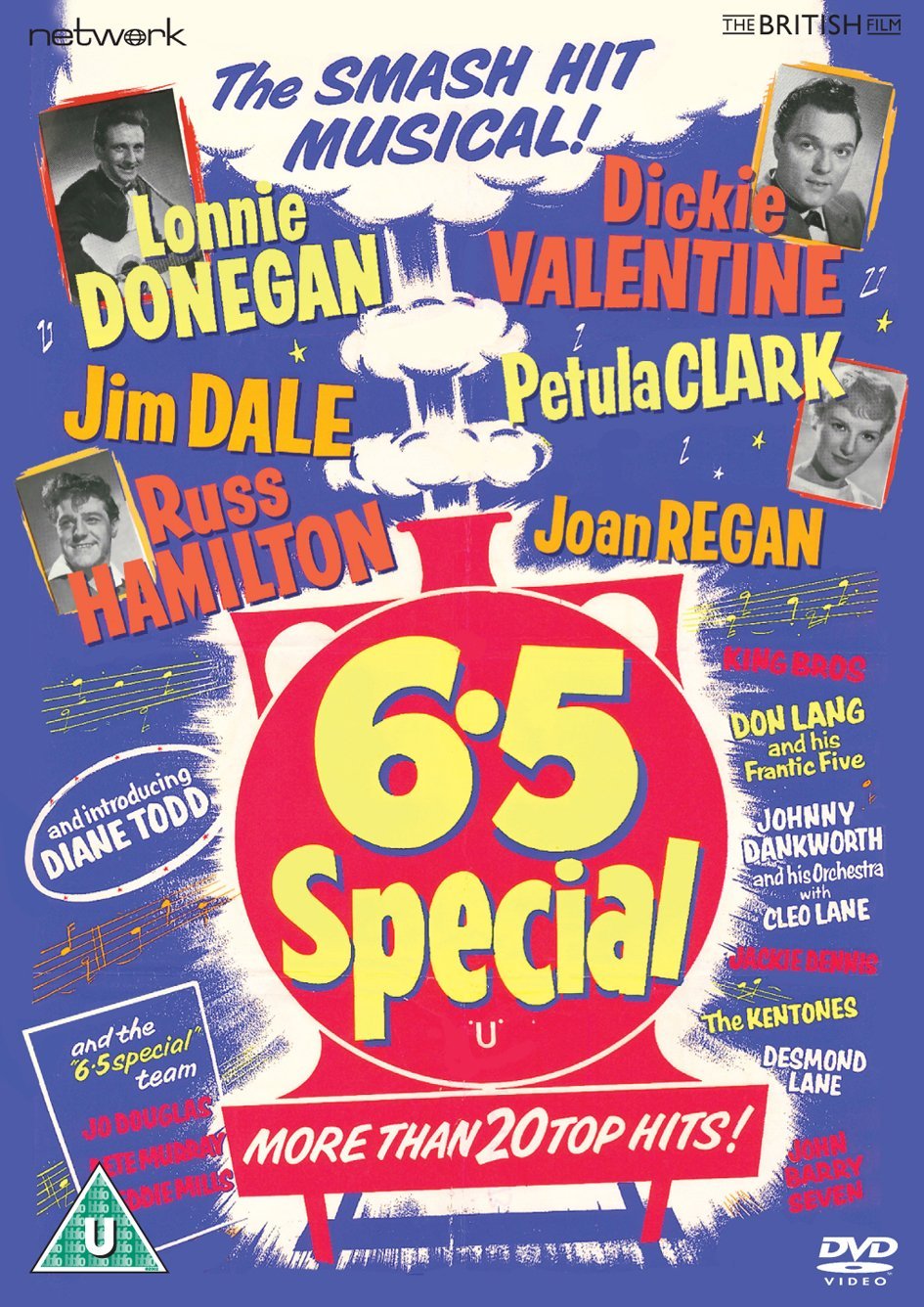
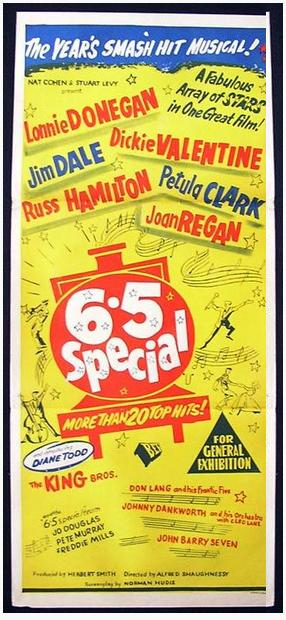
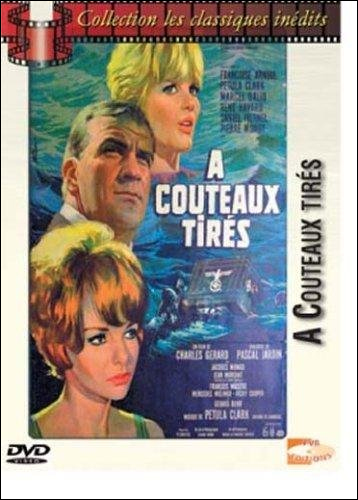
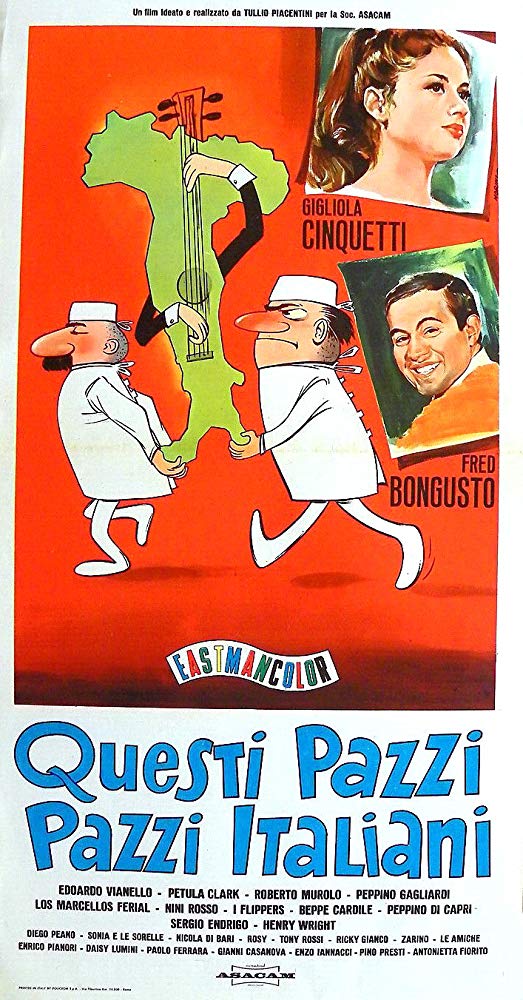
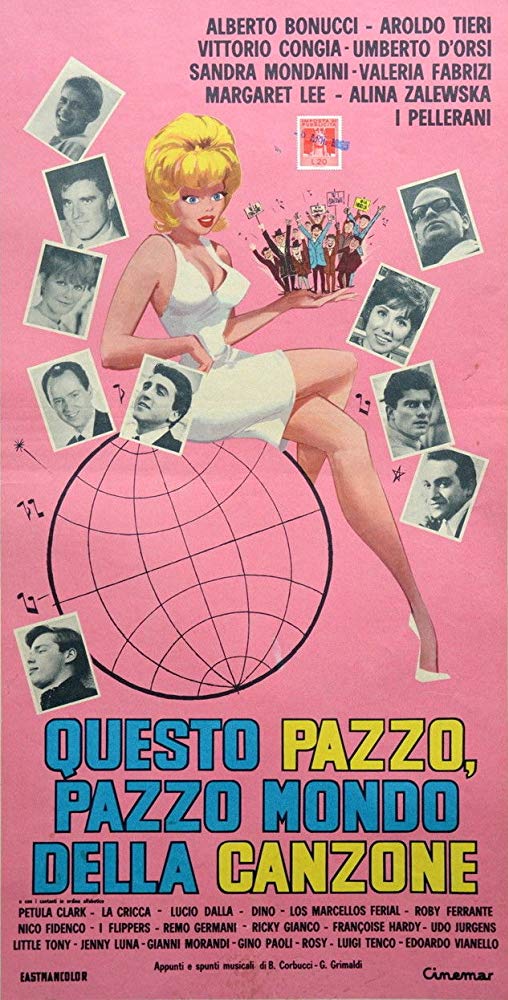
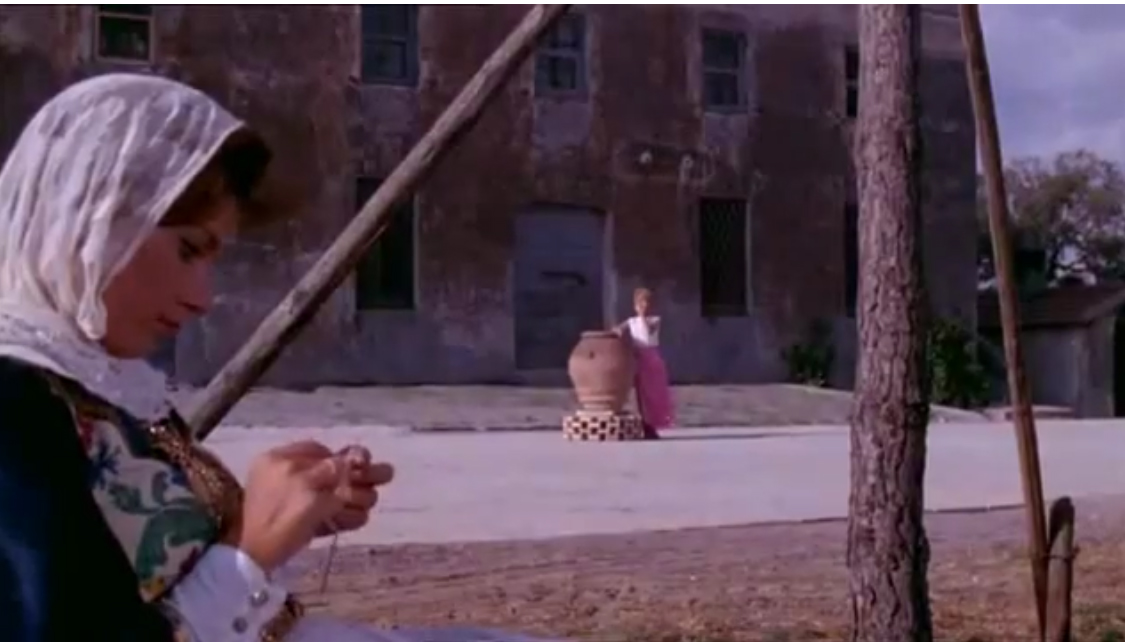
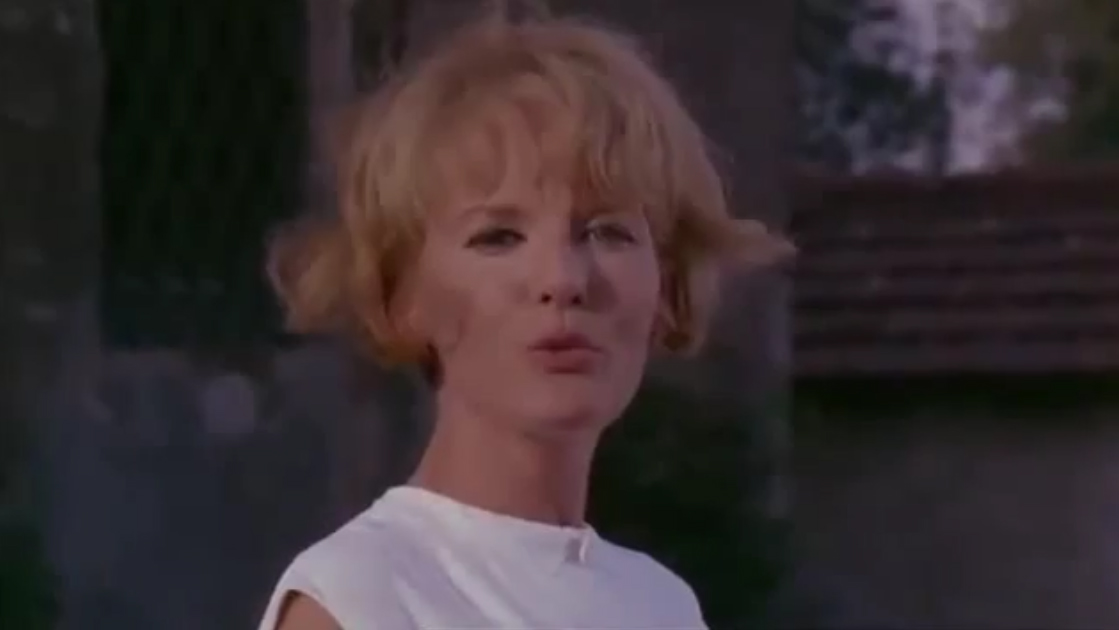
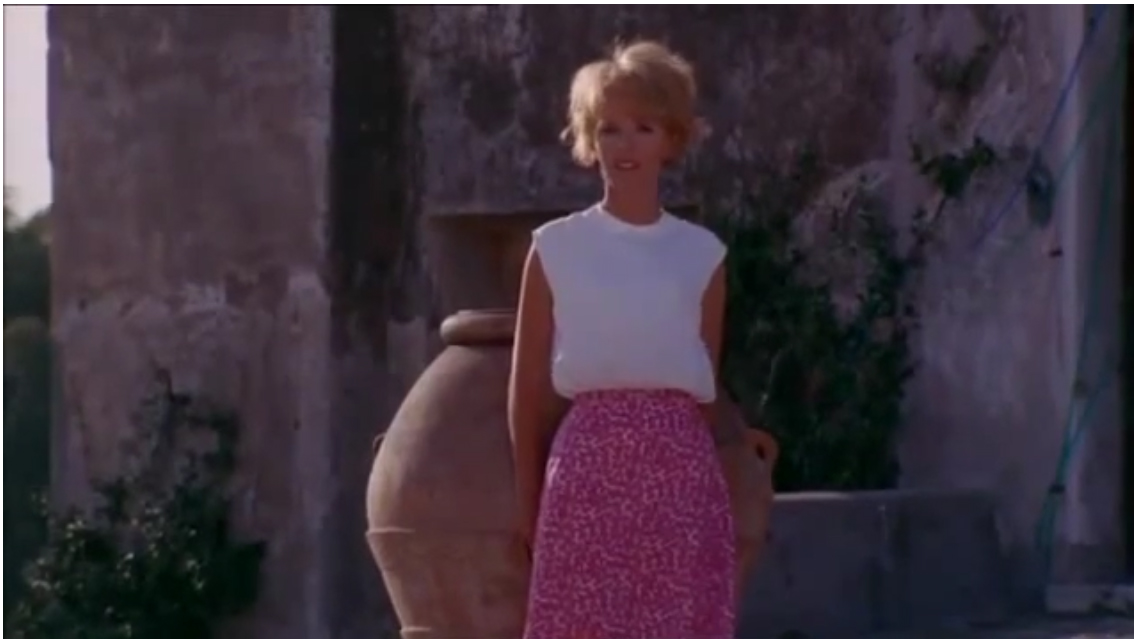

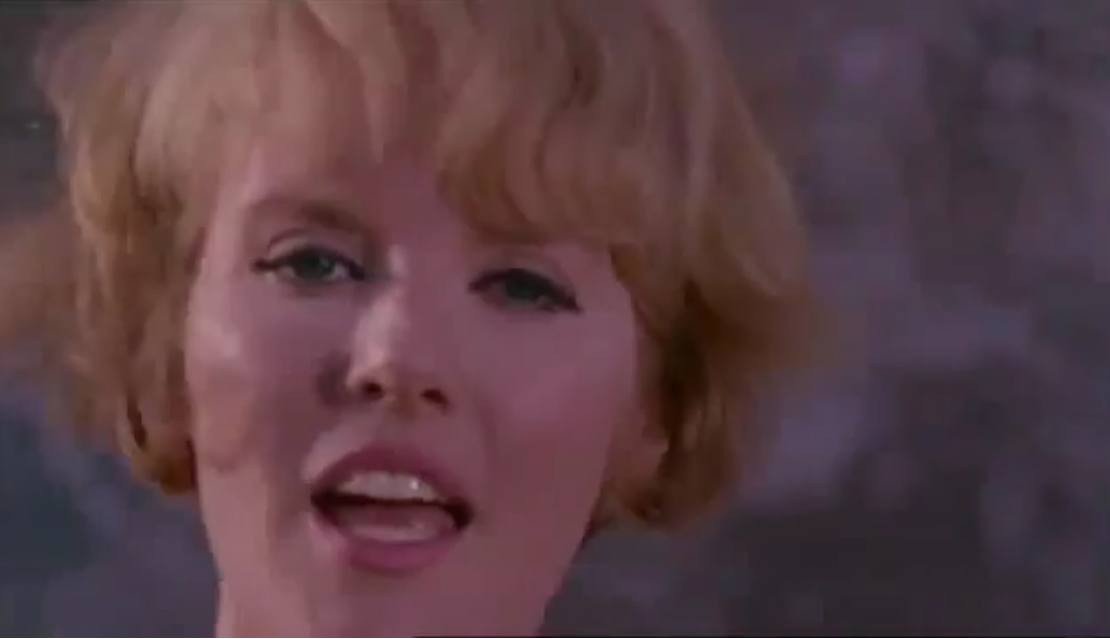
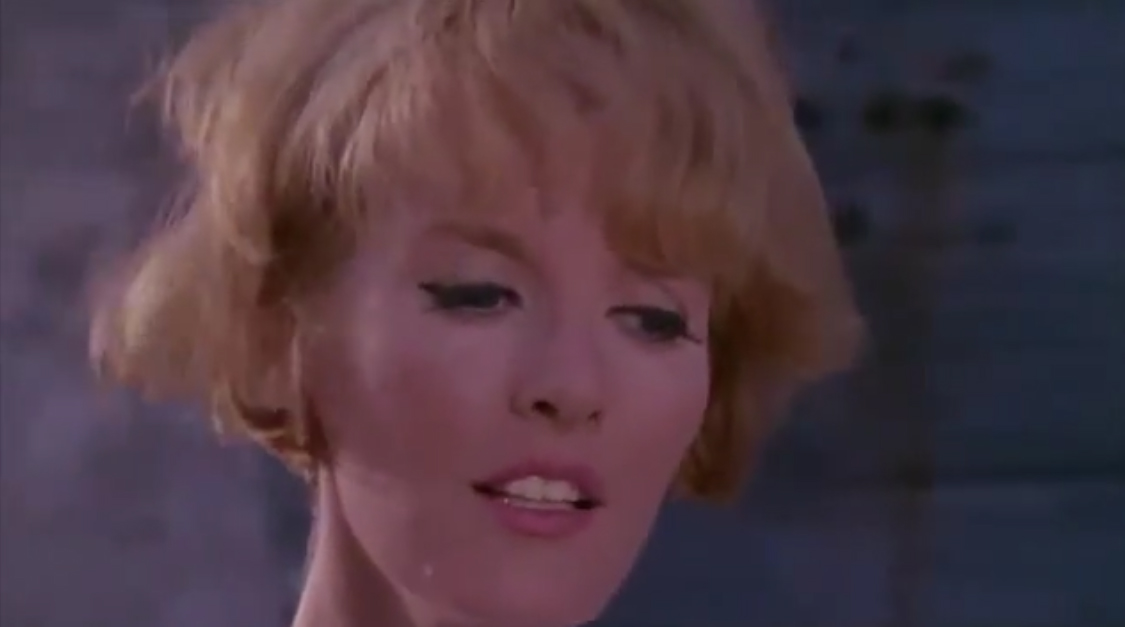
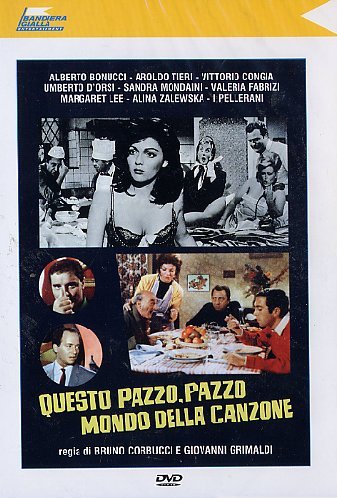
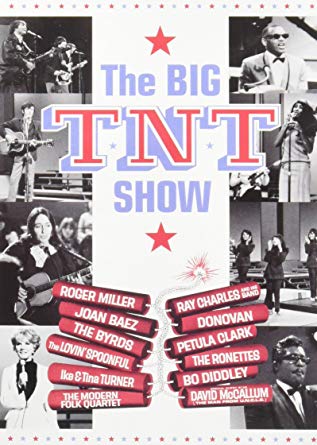

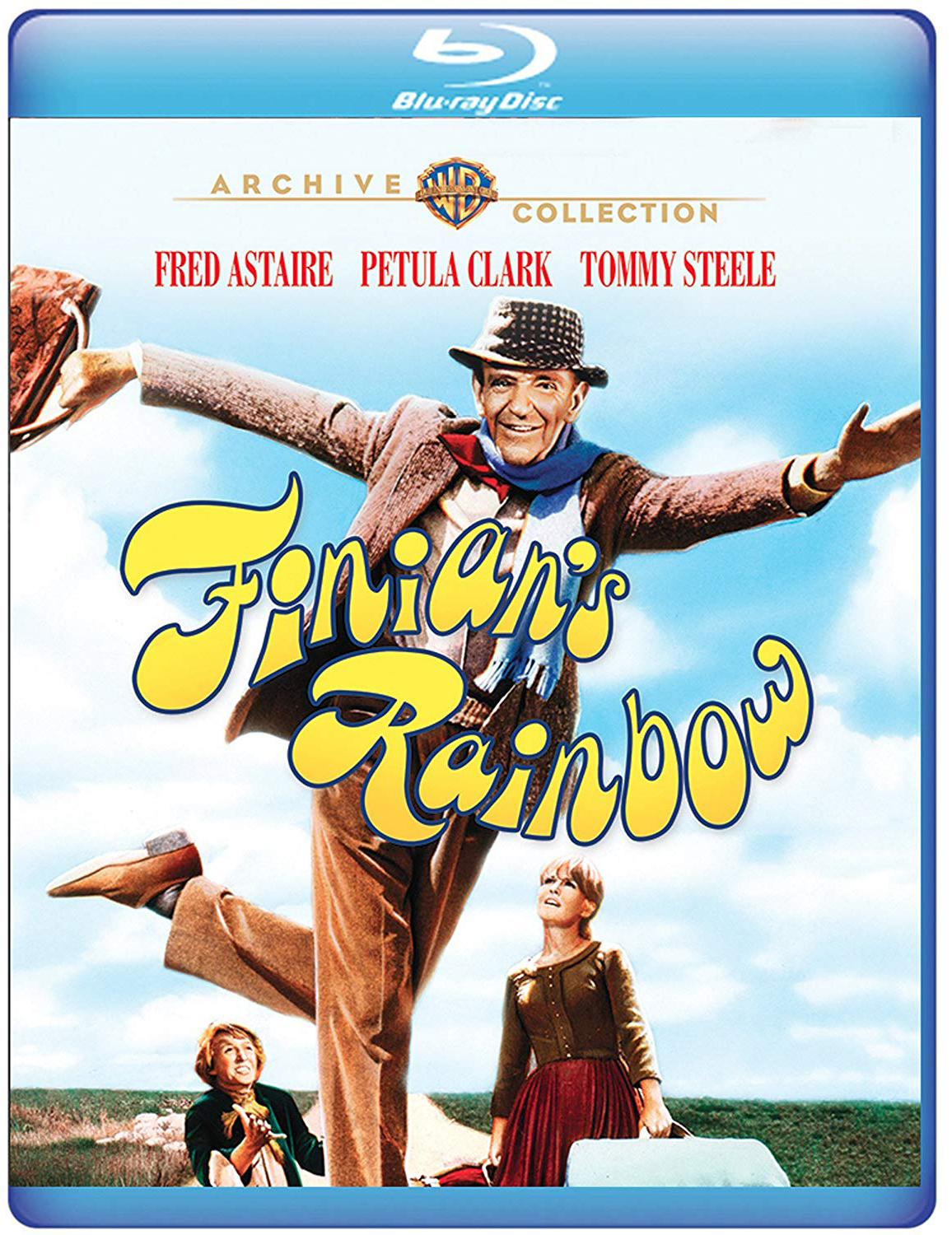
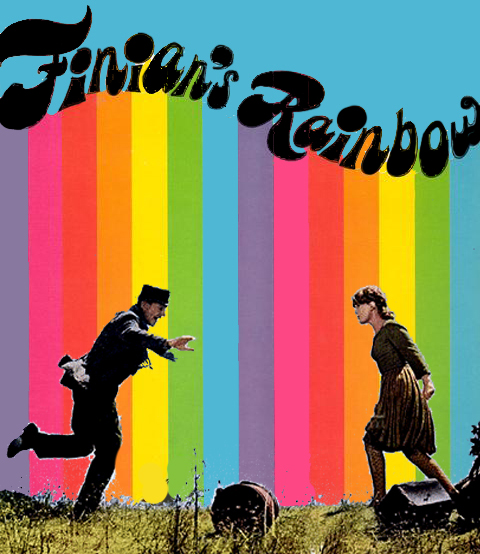
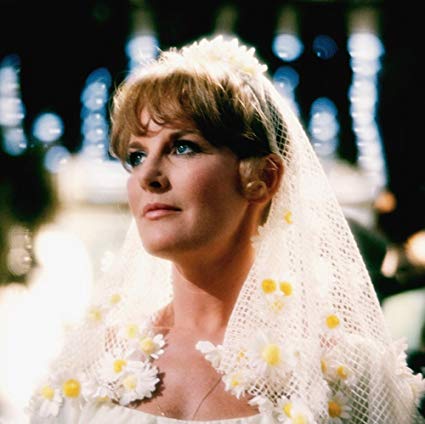
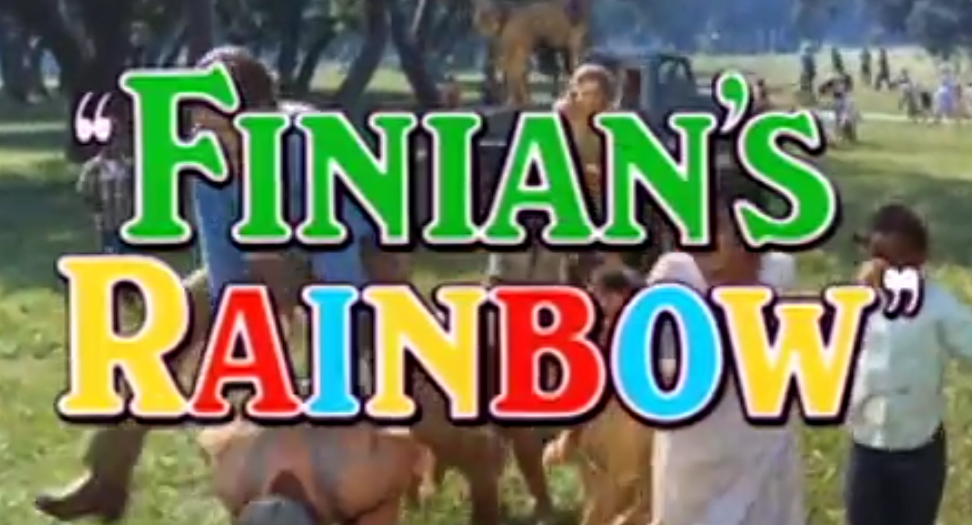 Trailer
Trailer